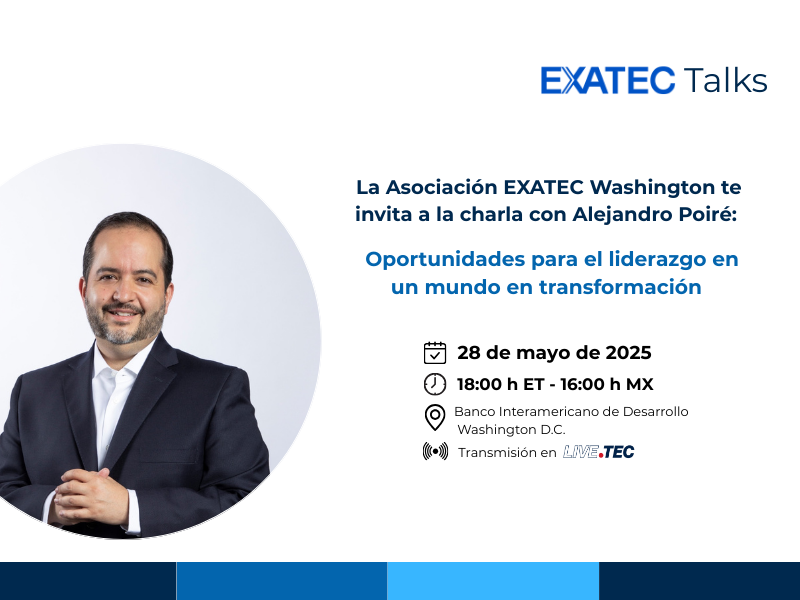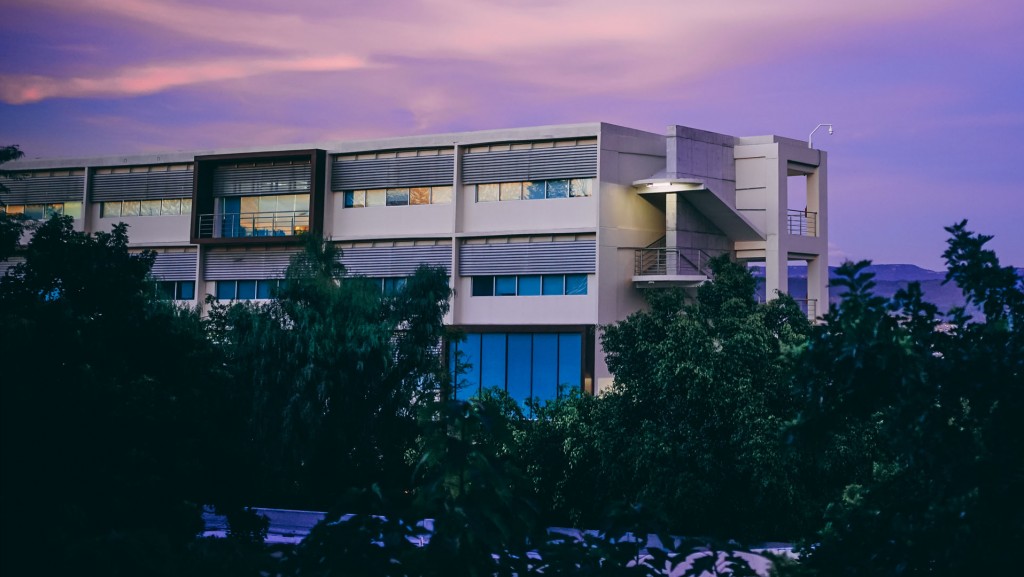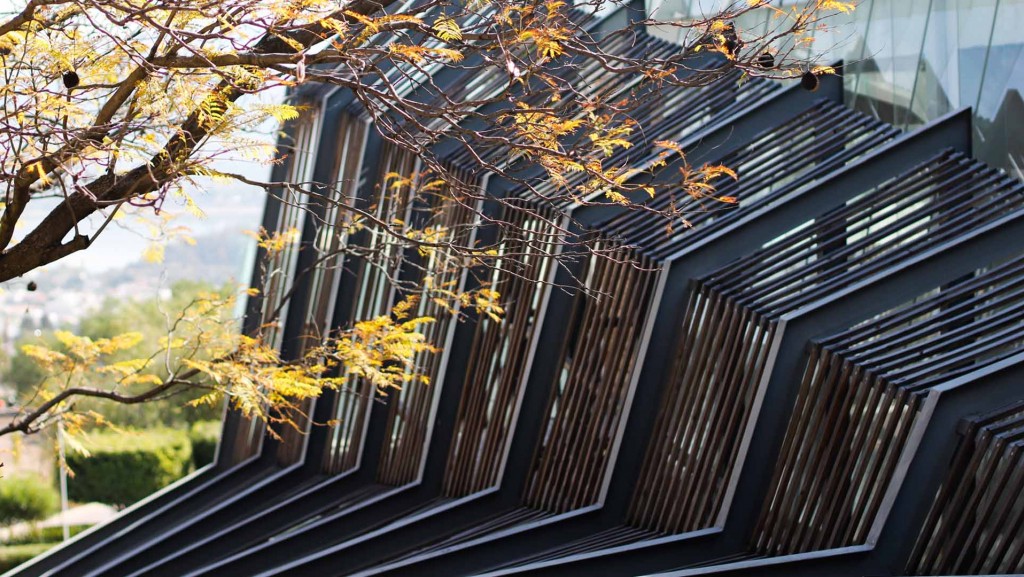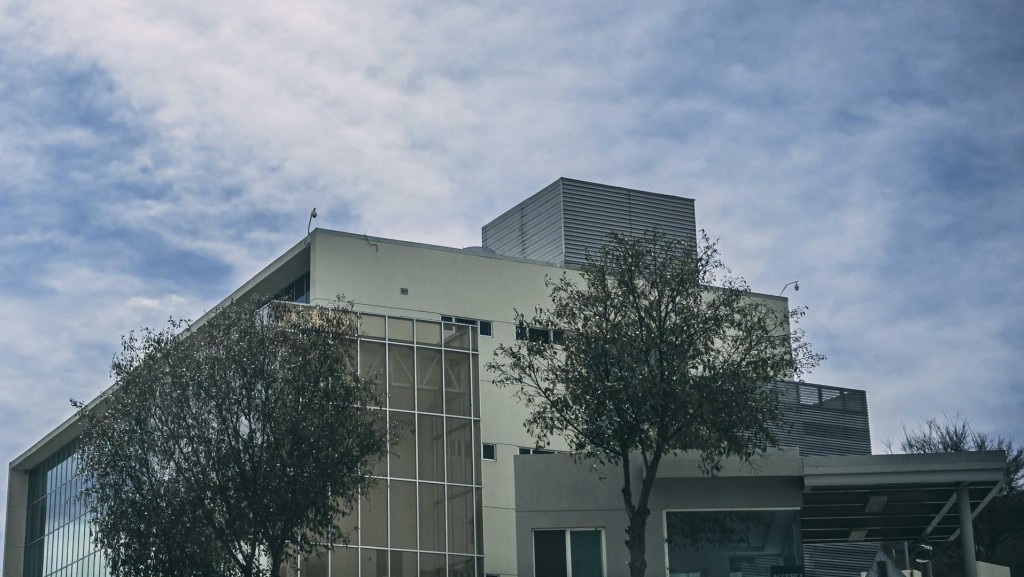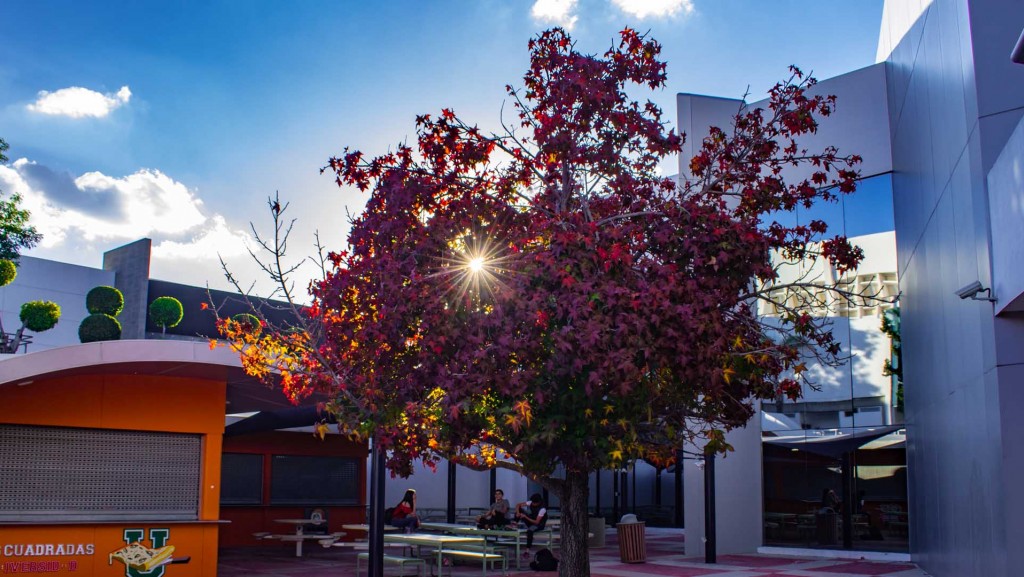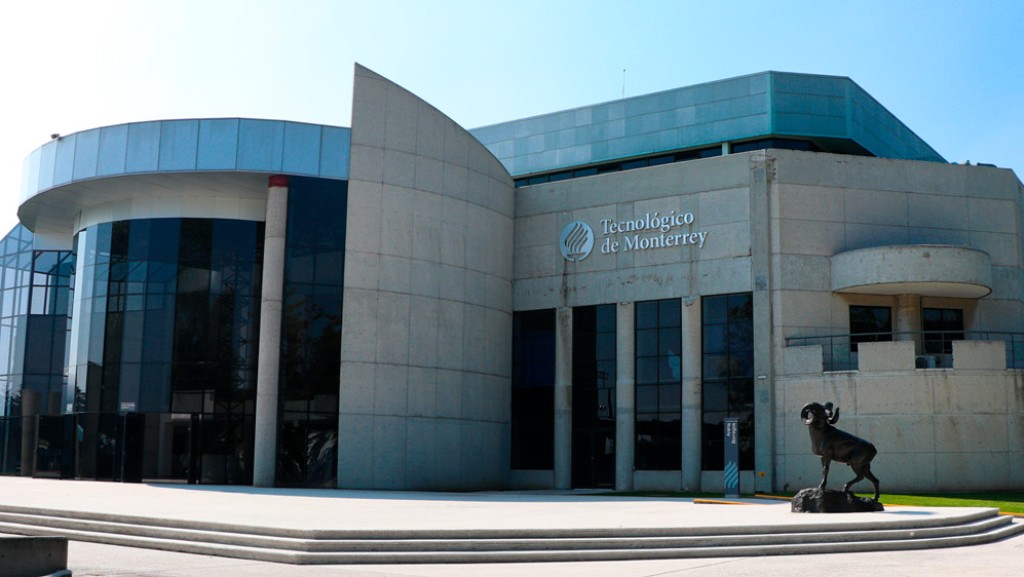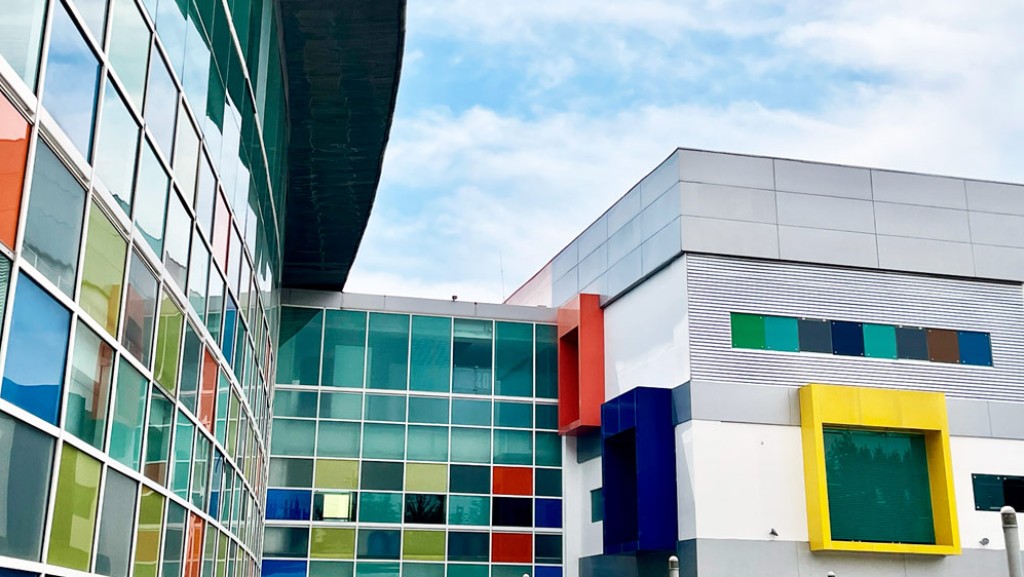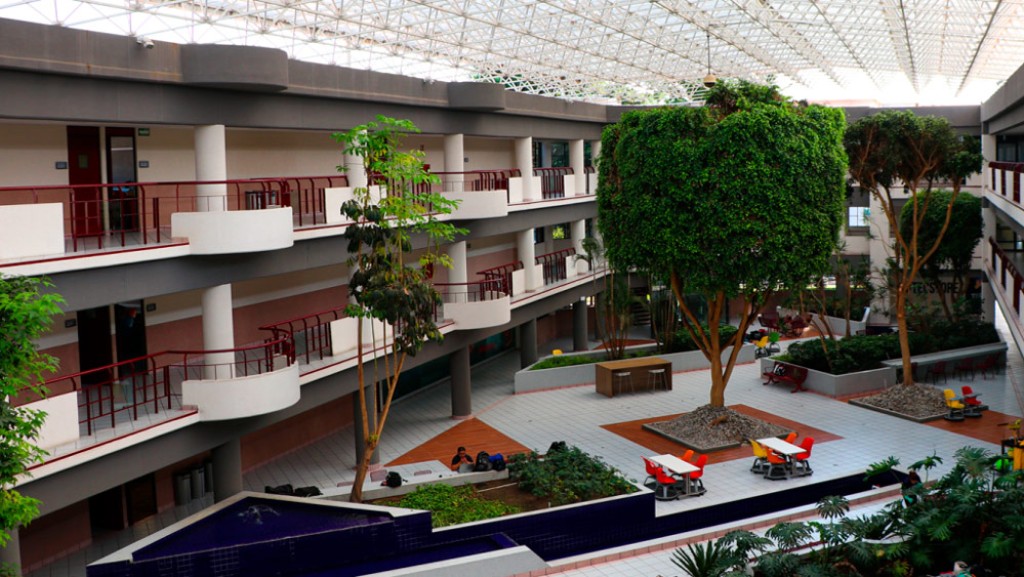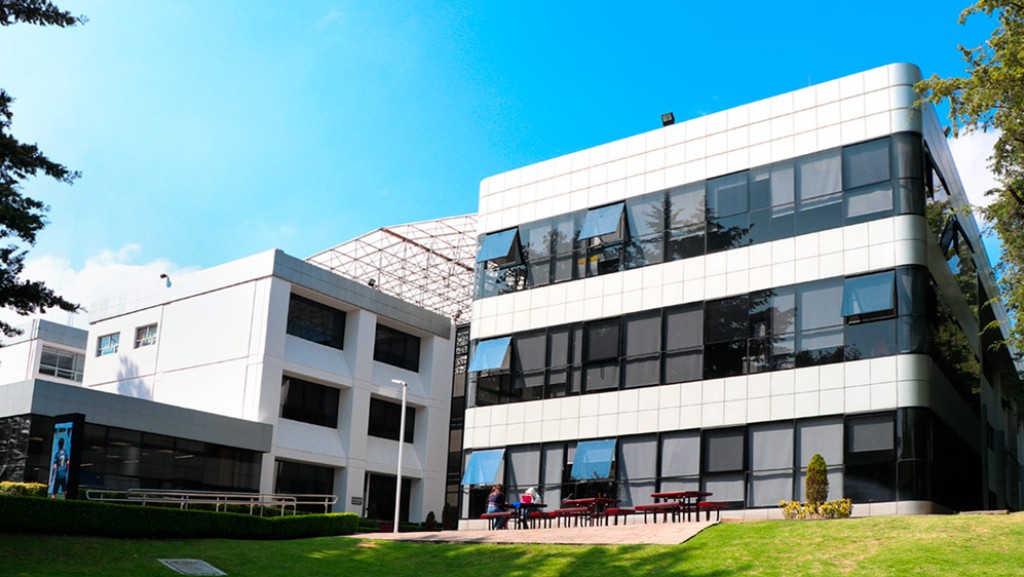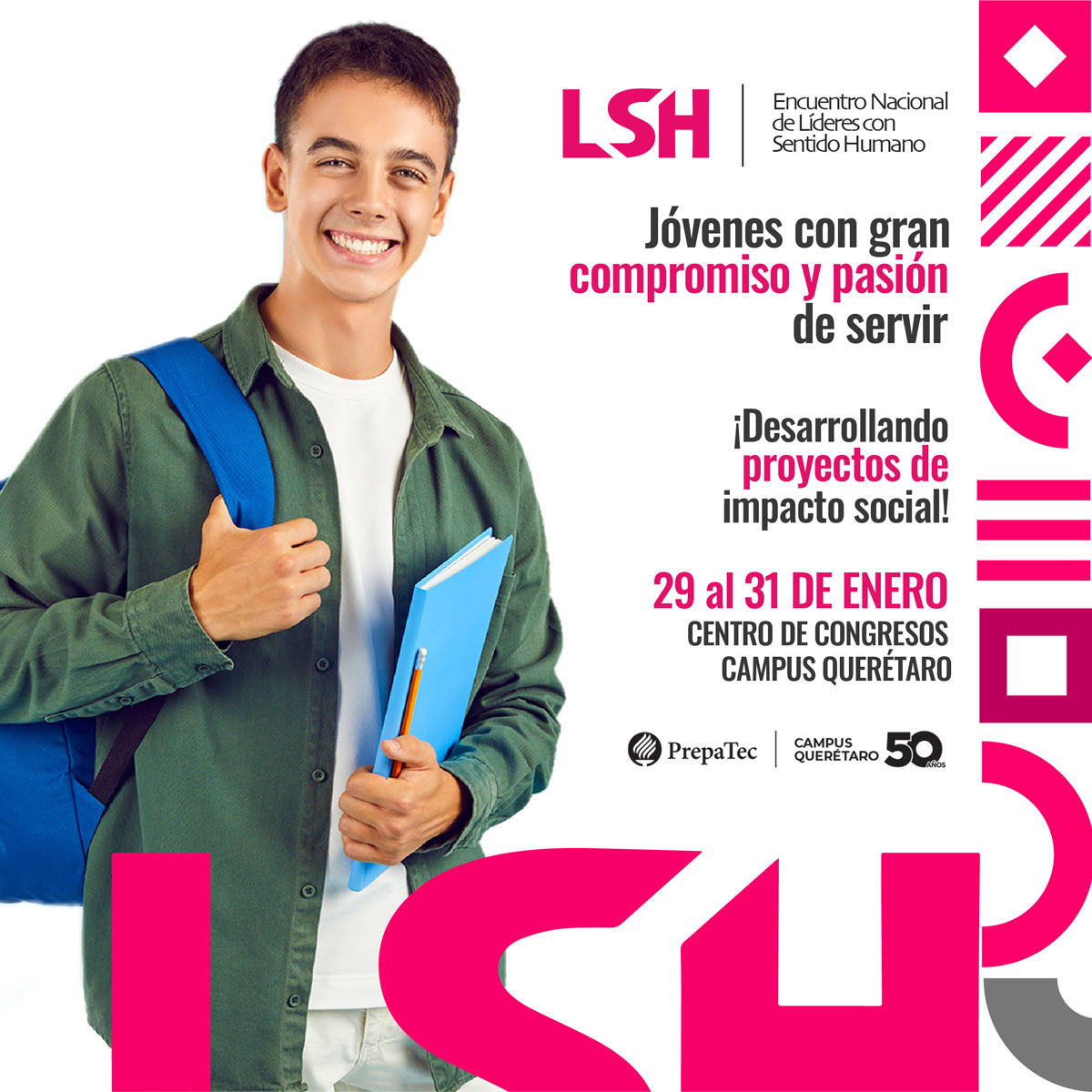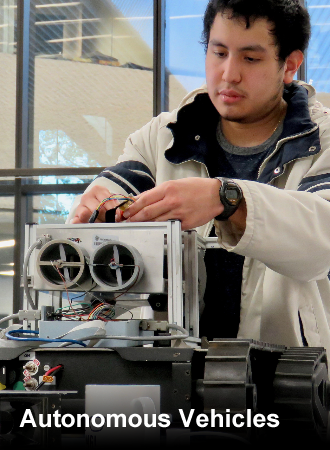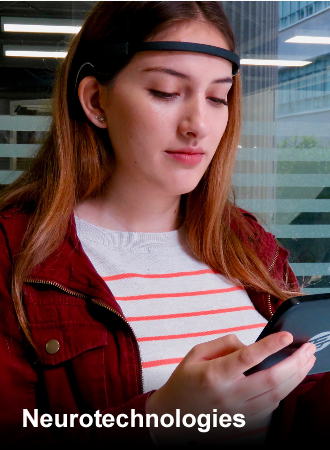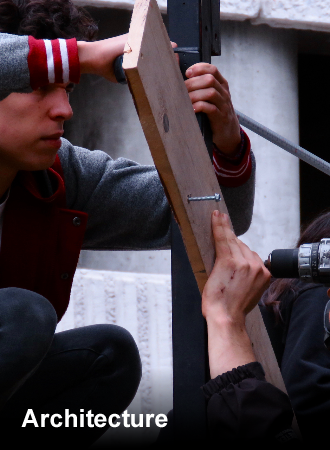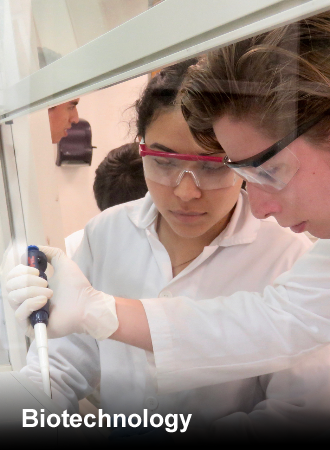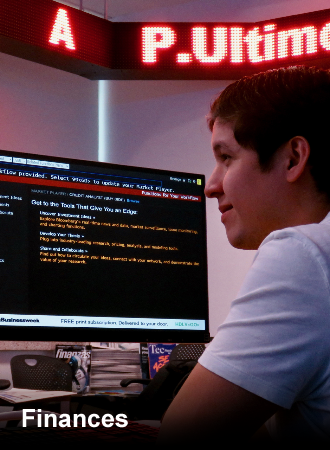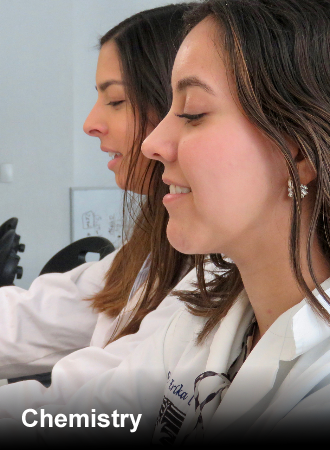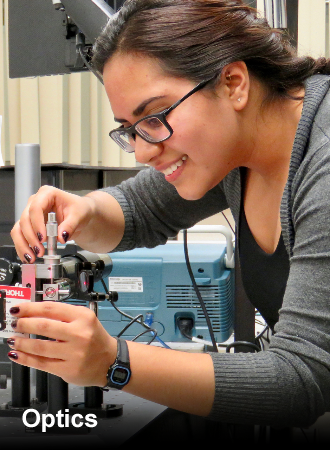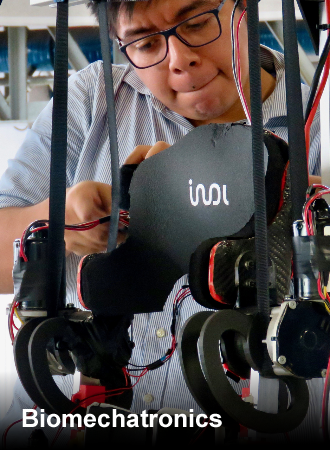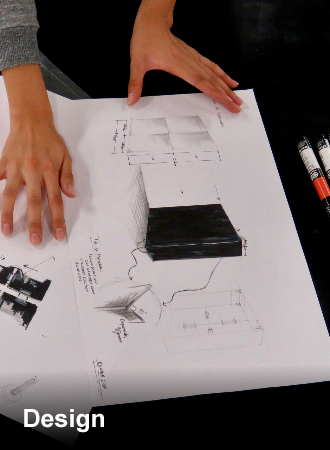Objeto destacado del mes
Las colecciones que resguarda el Tecnológico de Monterrey incluyen obras de arte y documentos de épocas y orígenes diversos, en su mayoría relacionados con la historia y la cultura mexicanas. En esta sección presentamos el objeto destacado del mes, es decir, una obra de nuestro acervo seleccionada para difundirse entre nuestros estudiantes y la comunidad en general. Para mayor información con respecto a las obras incluidas como objeto destacado del mes y su disponibilidad para consulta favor de escribir a: patrimonio_cultural@servicios.itesm.mx
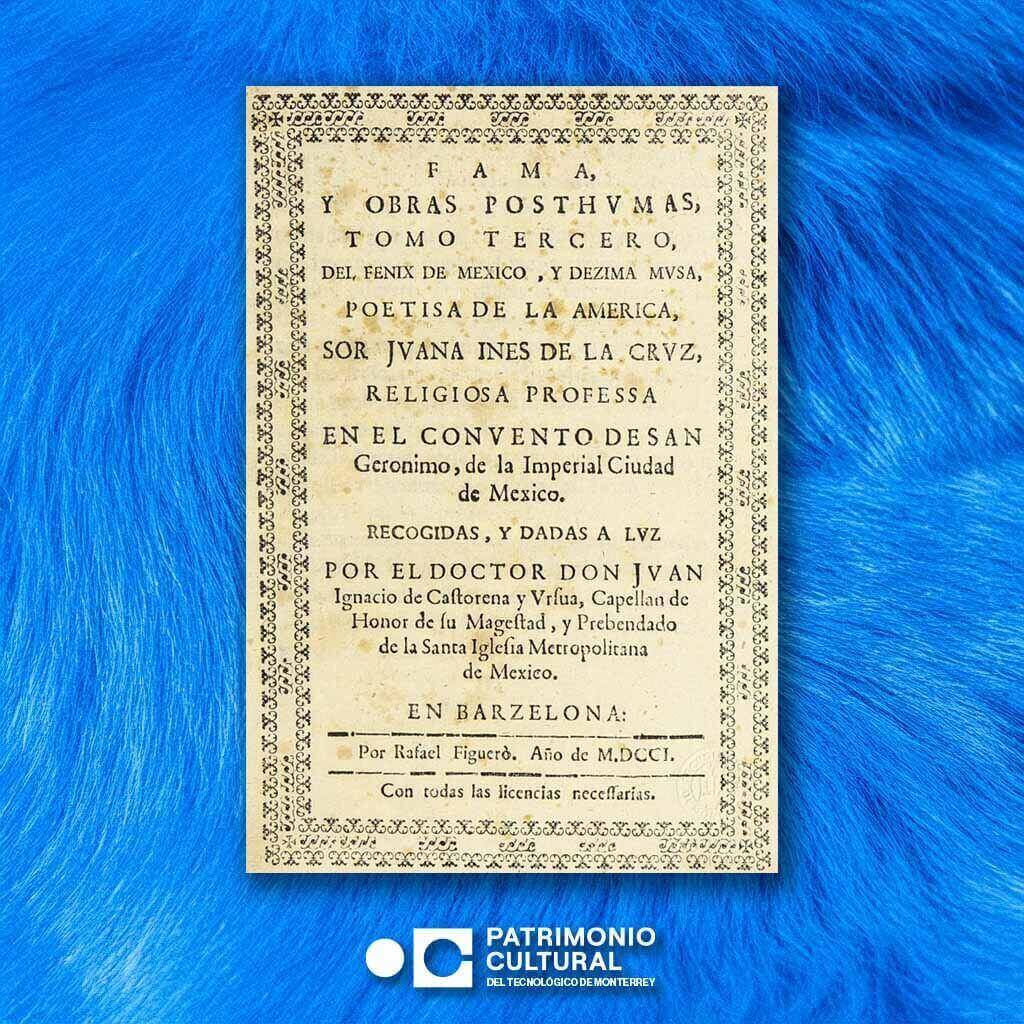
Mayo 2025
Sor Juana Inés de la Cruz (1651-1695), Fama, y obras posthvmas, tomo tercero, del fenix de México, dezima mvsa, poetisa de la America, Sor Jvana Ines de la Crvz, religiosa professa en el Convento de San Geronimo de la imperial Ciudad de Mexico, 1701. Colección Sor Juana Inés de la Cruz. Fondo G.R.G. Conway. Biblioteca de Colecciones Especiales "Miguel de Cervantes Saavedra". Campus Monterrey. Patrimonio Cultural del Tecnológico de Monterrey®.
Se trata de una obra que compila, de manera póstuma, las obras completas conocidas hasta 1700 de Sor Juana Inés de la Cruz. Su primera edición fue en Madrid.
Este ejemplar consiste en la tercera de las ediciones de Fama y obras póstumas, y la primera en imprimirse en Barcelona en 1701, lo que evidencia la importancia y el impacto de la obra de la monja jerónima en España.
En este libro aparece publicada la "Respuesta a Sor Filotea de la Cruz", que incluye valiosos datos biográicos de Sor Juana. En la conmemoración del 330 aniversario luctuoso de la Décima Musa, esta obra es el objeto destacado del mes.
Esta obra también está disponible para su consulta en el Repositorio Institucional del Tecnológico de Monterrey a través del siguiente enlace: https://hdl.handle.net/11285/657467
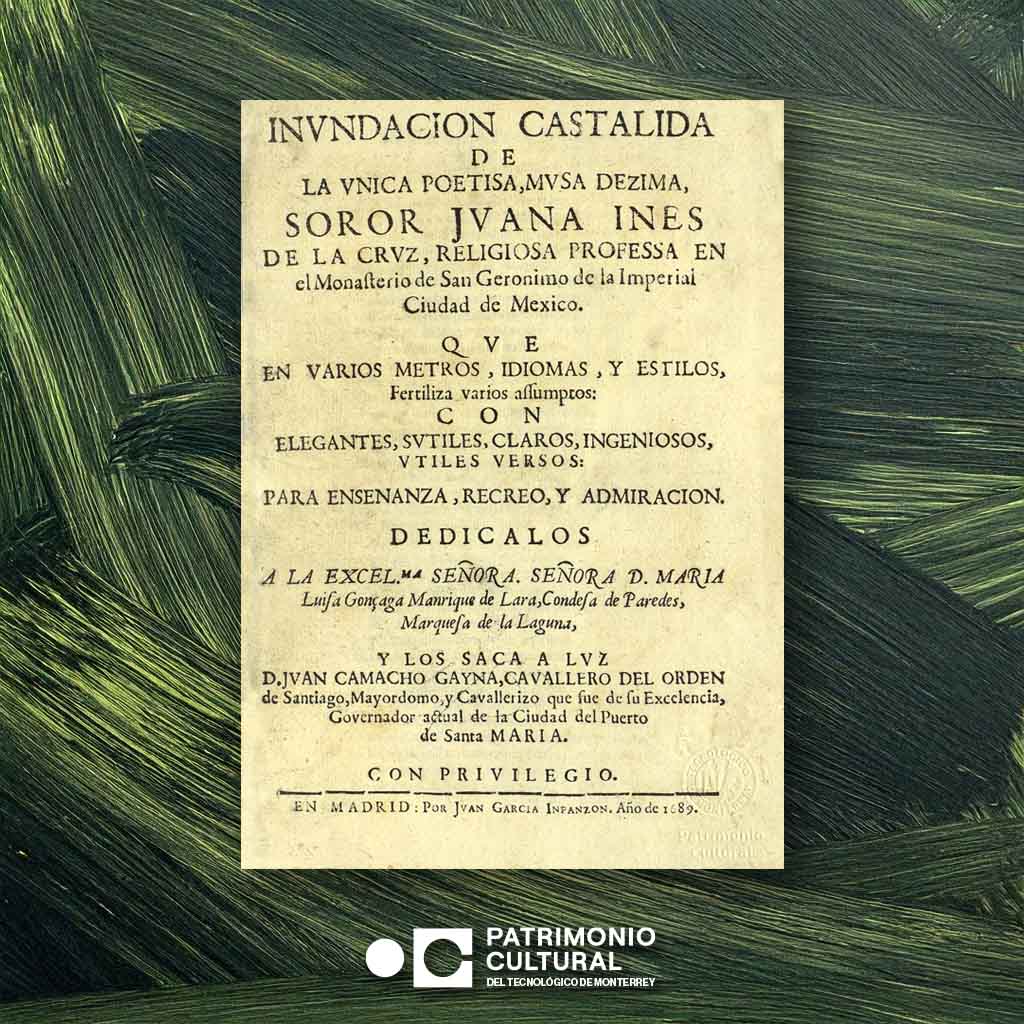
Abril 2025
Sor Juana Inés de la Cruz (1651-1695), Inundación castálida de la única poetisa, musa décima, Sor Juana Inés de la Cruz, religiosa profesa en el Monasterio de San Gerónimo de la Imperial Ciudad de México, 1689. Primera edición. Colección Sor Juana Inés de la Cruz. Fondo Méndez Plancarte. Biblioteca de Colecciones Especiales "Miguel de Cervantes Saavedra". Campus Monterrey. Patrimonio Cultural del Tecnológico de Monterrey®.
Inundación castálida es la primera publicación que reúne la obra de Sor Juana en un solo volumen. Fue editada en 1689 en Madrid, gracias al apoyo de su amiga y protectora, la virreina María Luisa Manrique de Lara y Gonzaga, condesa de Paredes y marquesa de la Laguna.
El título está basado en el mito de la ninfa Castalia, quien habitaba en la fuente del mismo nombre, consagrada a las Musas. Se creía que esta fuente tenía el poder de inspirar a los poetas, lo que hace referencia a la abundante creatividad e inspiración de la monja jerónima.
Este libro se convirtió en la carta de presentación de Sor Juana en Europa y tuvo gran éxito, pues fue reeditado nueve veces, consolidándose como auténtico best seller. En el mes en el que se conmemora su 330 aniversario luctuoso, esta obra, que la dio a conocer a nivel mundial, es el objeto destacado del mes.
Esta obra también está disponible para su consulta en el Repositorio Institucional del Tecnológico de Monterrey a través del siguiente enlace: https://hdl.handle.net/11285/657107
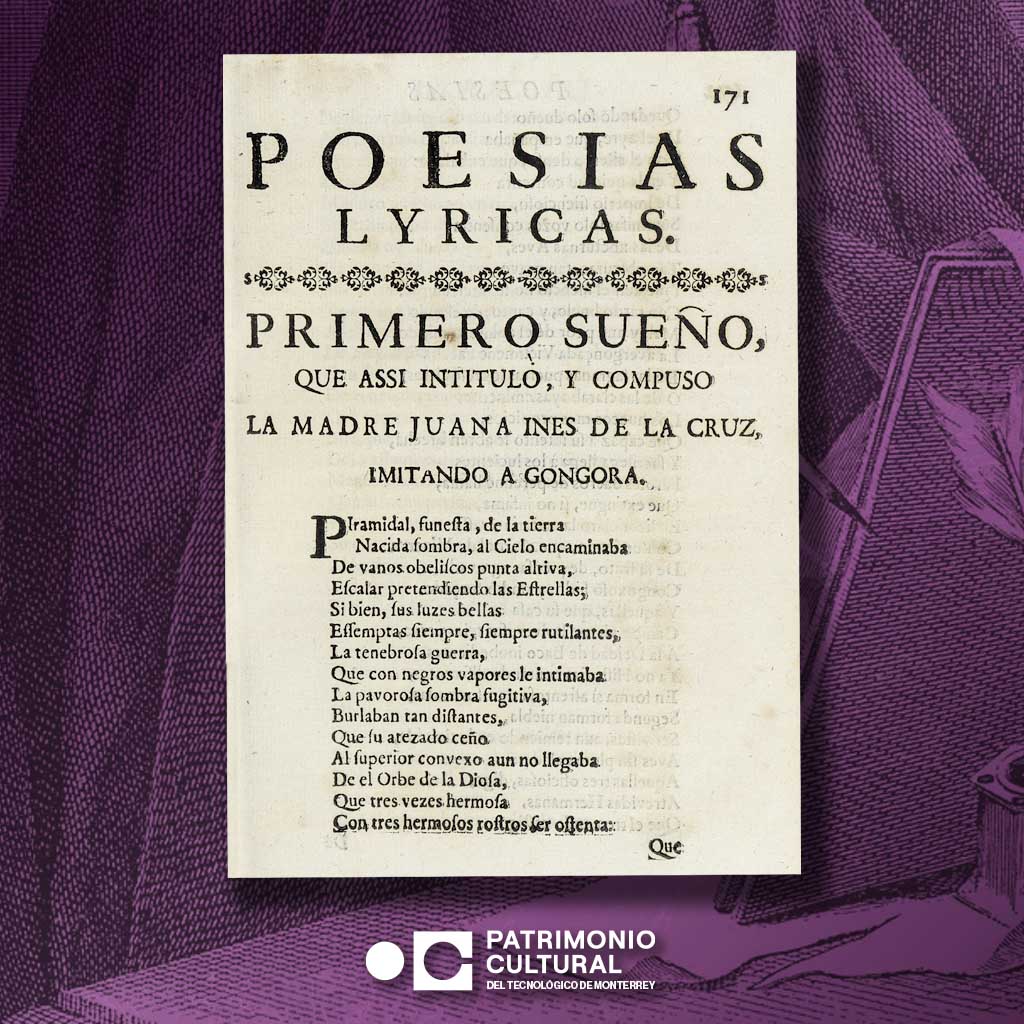
Marzo 2025
Sor Juana Inés de la Cruz (1651-1695), "Primero sueño", Segundo tomo de las obras de Sor Juana Inés de la Cruz, monja professa en el monasterio del señor San Geronimo en la Ciudad de México, 1693. Colección Sor Juana Inés de la Cruz. Fondo G.R.G. Conway. Biblioteca de Colecciones Especiales "Miguel de Cervantes Saavedra". Campus Monterrey. Patrimonio Cultural del Tecnológico de Monterrey®.
El Sueño, como Sor Juana Inés de la Cruz llamaba a su poema, se dio a conocer en 1690. Explora el viaje del alma hacia el conocimiento en 975 versos. Es la única obra que la monja jerónima confesó haber escrito por gusto.
Este poema se publicó por primera vez en la edición sevillana del Segundo tomo en 1692. Un año después, Joseph Llopis imprimió y pagó una segunda edición en Barcelona. Este ejemplar perteneció al bibliófilo mexicano Joaquín García Icazbalceta.
En 2025 se conmemora el 330 aniversario luctuoso de Sor Juana Inés de la Cruz. La Biblioteca Cervantina le rinde un homenaje al seleccionar este poema como objeto destacado del mes de marzo.
Esta obra también está disponible para su consulta en el Repositorio Institucional del Tecnológico de Monterrey a través del siguiente enlace: https://hdl.handle.net/11285/657429
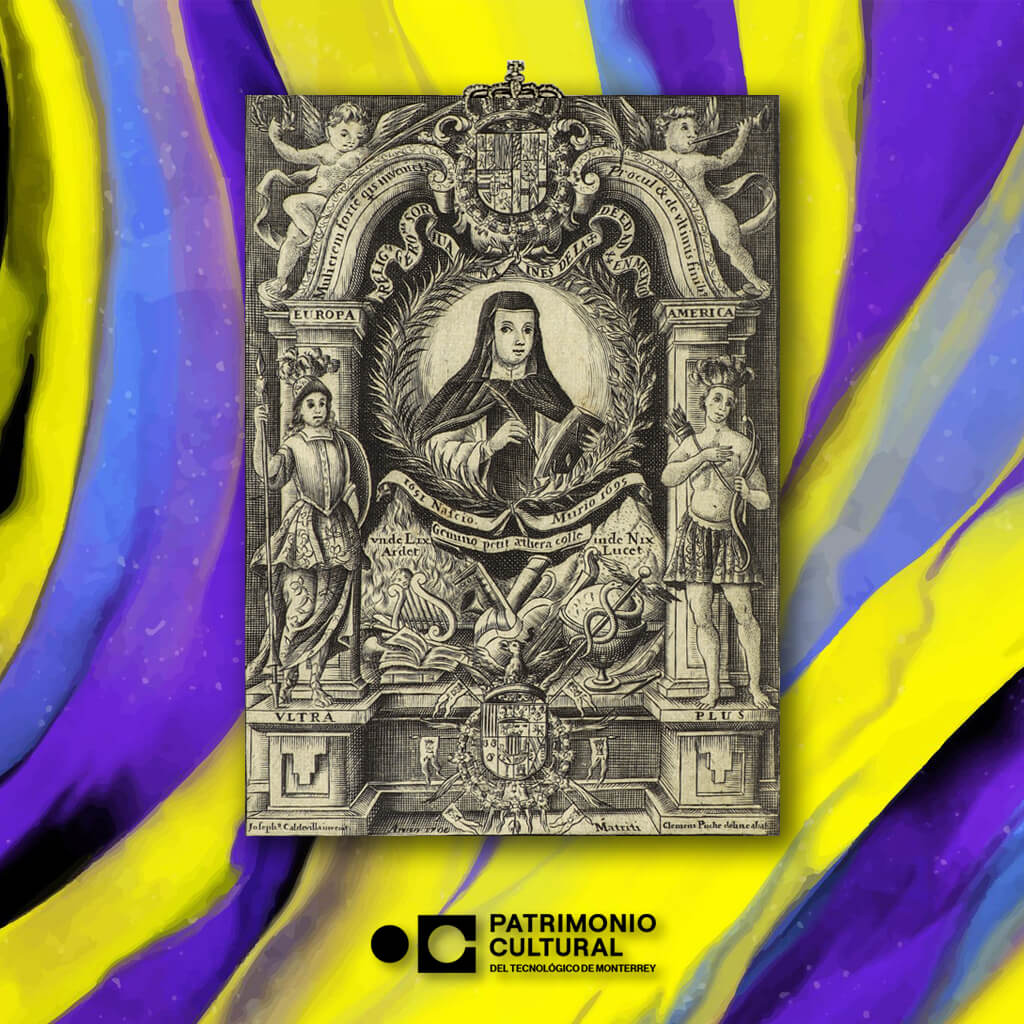
Febrero 2025
Sor Juana Inés de la Cruz (1651-1695), Frontispicio de Poemas de la única poetisa americana: musa dezima sor Juana Inés de la Cruz, religiosa professa en el monasterio de San Geronimo de la ciudad de México, 1725. Colección Sor Juana Inés de la Cruz. Fondo Méndez Plancarte. Biblioteca de Colecciones Especiales "Miguel de Cervantes Saavedra". Campus Monterrey. Patrimonio Cultural del Tecnológico de Monterrey®.
El frontispicio es una reproducción del grabado que apareció en la primera edición de Fama y obras póstumas, publicada en Madrid por Manuel Ruiz de Murga en 1700. En el ámbito de la ilustración, un frontispicio es una imagen que funciona como portada, a modo de fachada inicial de un libro.
El grabado fue realizado por Joseph Caldevilla a partir de un dibujo de Clemente Puche y representa a Sor Juana Inés de la Cruz en el centro, simbolizando un puente entre Europa y América. En la parte superior, sobre uno de los listones de la derecha, se distingue la cifra "44 años", en referencia a la edad en la que falleció. Esta edición, publicada en Madrid en 1725, consta de tres volúmenes y perteneció a Alfonso Méndez Plancarte, quien dirigió el proyecto de las obras completas de Sor Juana Inés de la Cruz para el Fondo de Cultura Económica.
Este año se conmemoran 330 años del fallecimiento de la monja jerónima Sor Juana Inés de la Cruz, una de las figuras más emblemáticas de la literatura novohispana y del Siglo de Oro. En honor a su invaluable legado intelectual y literario, la Biblioteca Cervantina del Tecnológico de Monterrey rinde homenaje a su obra, resguardando y difundiendo su producción escrita, testimonio de su genialidad y su incansable búsqueda de conocimiento.
Esta obra también está disponible para su consulta en el Repositorio Institucional del Tecnológico de Monterrey a través del siguiente enlace: https://hdl.handle.net/11285/657114
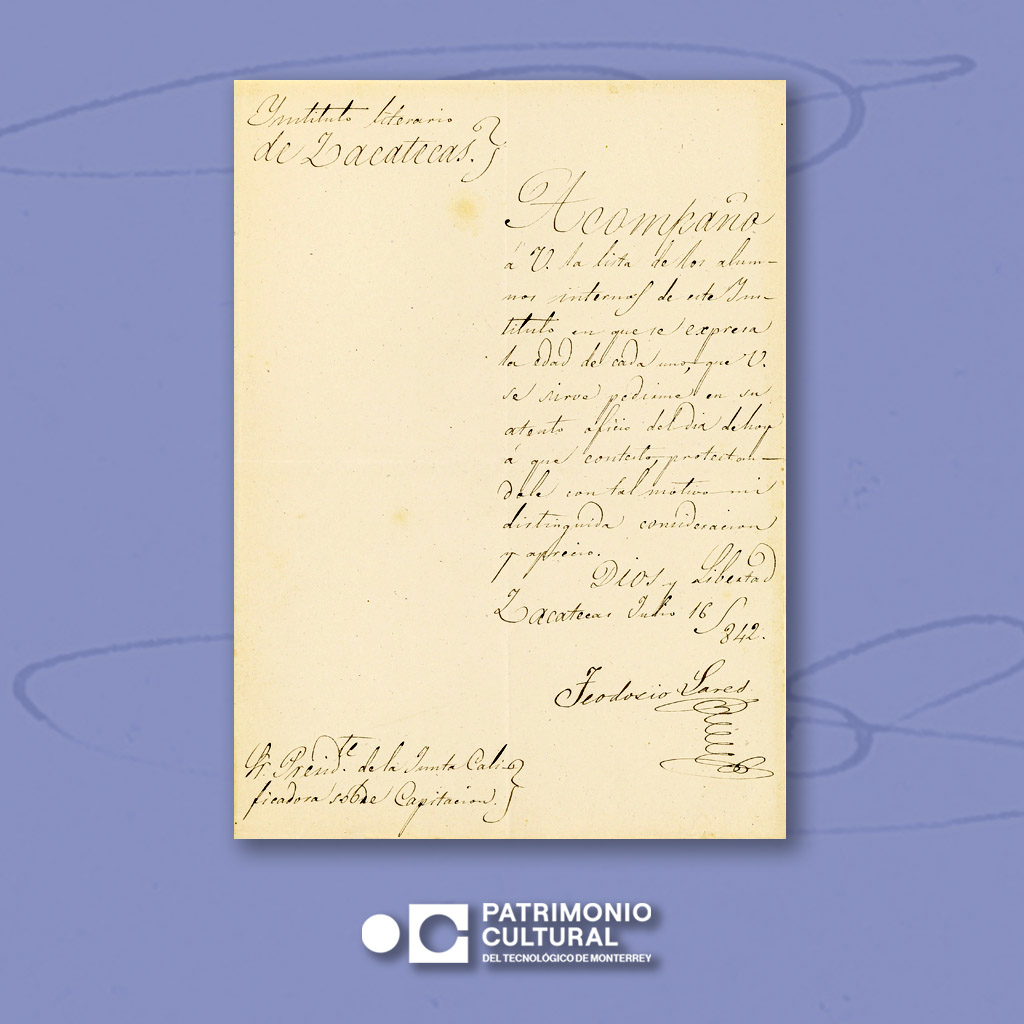
Enero 2025
Teodosio Lares, Carta a la Junta Directiva de la Hacienda Pública del Estado de Zacatecas, 1842. Fondo Archivo Histórico de la Real Caja de Zacatecas 1576-1936, Colección Sociedad de Amigos de Zacatecas, A.C. en comodato al Tecnológico de Monterrey®. Registro Memoria del Mundo de México, UNESCO, 2021. Patrimonio Cultural del Tecnológico de Monterrey®.
Teodosio Lares (1806-1870) fue un importante abogado, político, escritor, humanista y miembro destacado del Ateneo Mexicano, quien redactó esta carta para informar a las autoridades de la Hacienda Pública sobre la cantidad de alumnos aceptados en el Instituto Literario de Zacatecas (1837-1867).
Lares fue director del instituto de 1834 a enero de 1848, e impartió las cátedras de Derecho Civil y Canónico en el mismo plantel educativo. El Instituto Literario de Zacatecas se estableció como un centro de enseñanza pública, financiada con las rentas estatales, manejado por un director laico donde la educación para los alumnos comprendía desde estudios secundarios a profesional. Es relevante su participación en el instituto, pues a raíz del mismo se crean los distintos niveles de educación pública desde las primeras letras hasta profesional.
A los 155 años de su fallecimiento rememoramos a Teodosio Lares por sus grandes aportaciones a la educación pública del país, por su contribución en el campo administrativo en el Proyecto de Ley de Bancarrotas y en la Organización de la Justicia Contenciosa.
Por año
Enero, 2019
Yvonne Domenge (1946-2019), Clytia, 2000. Acero dulce. Campus Estado de México. Patrimonio Cultural del Tecnológico de Monterrey®.
La escultora nos invita a mirar ese cruce de caminos que parecería no existir entre ciencia y arte. Clytia es una escultura monumental que se halla a medio camino entre las áreas de profesional y preparatoria del Tecnológico de Monterrey en el Estado de México, a un lado del túnel que lleva hacia los estacionamientos es el centro geográfico del campus. Clytia en la mitología griega era una ninfa del mar que se había enamorado de Helios, al ver que él no la amaba sino a Leucótoe, se venga. Los dioses al saberlo, la convirtieron en heliotropo. El título de la obra aduce a una criatura del mar que es etérea, y su amor inasible.
-Carlos A. Molina
Febrero, 2019
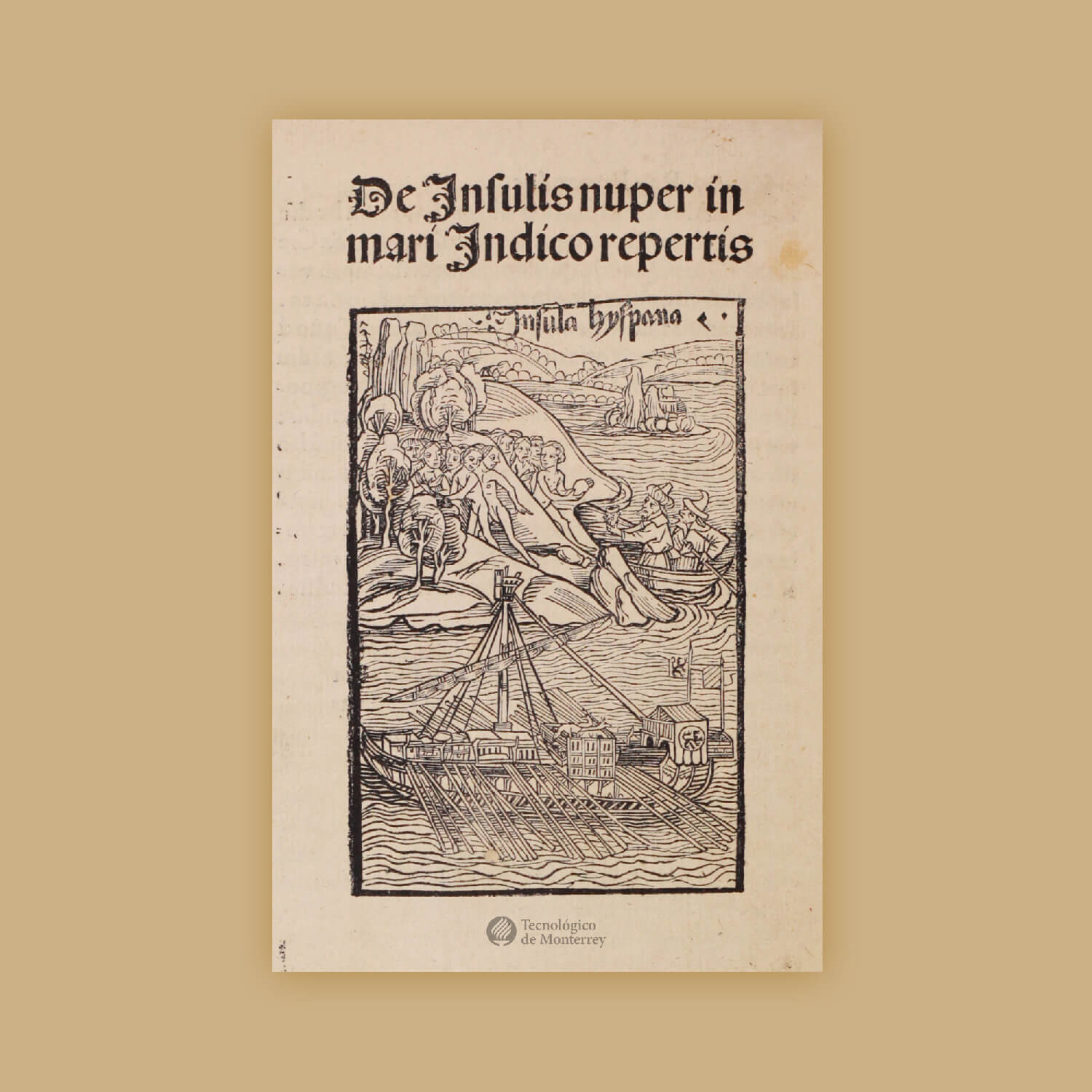
Cristóbal Colón, De insulis nuper in mari Indico repertis, 1494. Fondo Salvador Ugarte. Biblioteca de Colecciones Especiales "Miguel de Cervantes Saavedra". Campus Monterrey. Patrimonio Cultural del Tecnológico de Monterrey®.
El documento De Insulis nuper in mari Indico repertis consiste en la segunda carta de Cristóbal Colón. Su título se traduce como "Las islas se han descubierto recientemente en el mar de la India". Esta carta va dirigida al rey Fernando y a Gabriel Sánchez que describe lo ocurrido en el viaje del descubrimiento. La importancia de este material radica en ser uno de los primeros best-sellers de la época, a través del cual pudieron difundirse las primeras noticias del descubrimiento del Nuevo Mundo, pues la versión en latín fue la que más circuló en Europa a partir de su publicación.
-Marcela Beltrán Bravo.
Marzo, 2019
Leonora Carrington (1917-2011), Dos figuras con cuervos, s/f. Aguatinta sobre papel. Campus Estado de México. D.R.© Leonora Carrington/ARSNY/SOMAAP/México/2023. Patrimonio Cultural del Tecnológico de Monterrey®.
Leonora Carrington era descendiente de una familia acomodada inglesa. Huyendo de la terrible situación de horror vivida tras la captura de su pareja, el pintor surrealista Max Ernst, en la Segunda Guerra Mundial, llegó a México en 1942. Esta litografía retrata a dos figuras que conversan con unos cuervos que las acompañan. Lo mismo los colores contrastantes, de la nebulosa al fondo sugiere una cueva o un bosque cubierto, tienen una carga emblemática, ambas peculiaridades del cuadro no son incidentales ni decorativas. Su obra apuesta por no revelarnos las claves para descifrarla y asociar libremente figuras, motivos, recuerdos y colores.
Abril, 2019
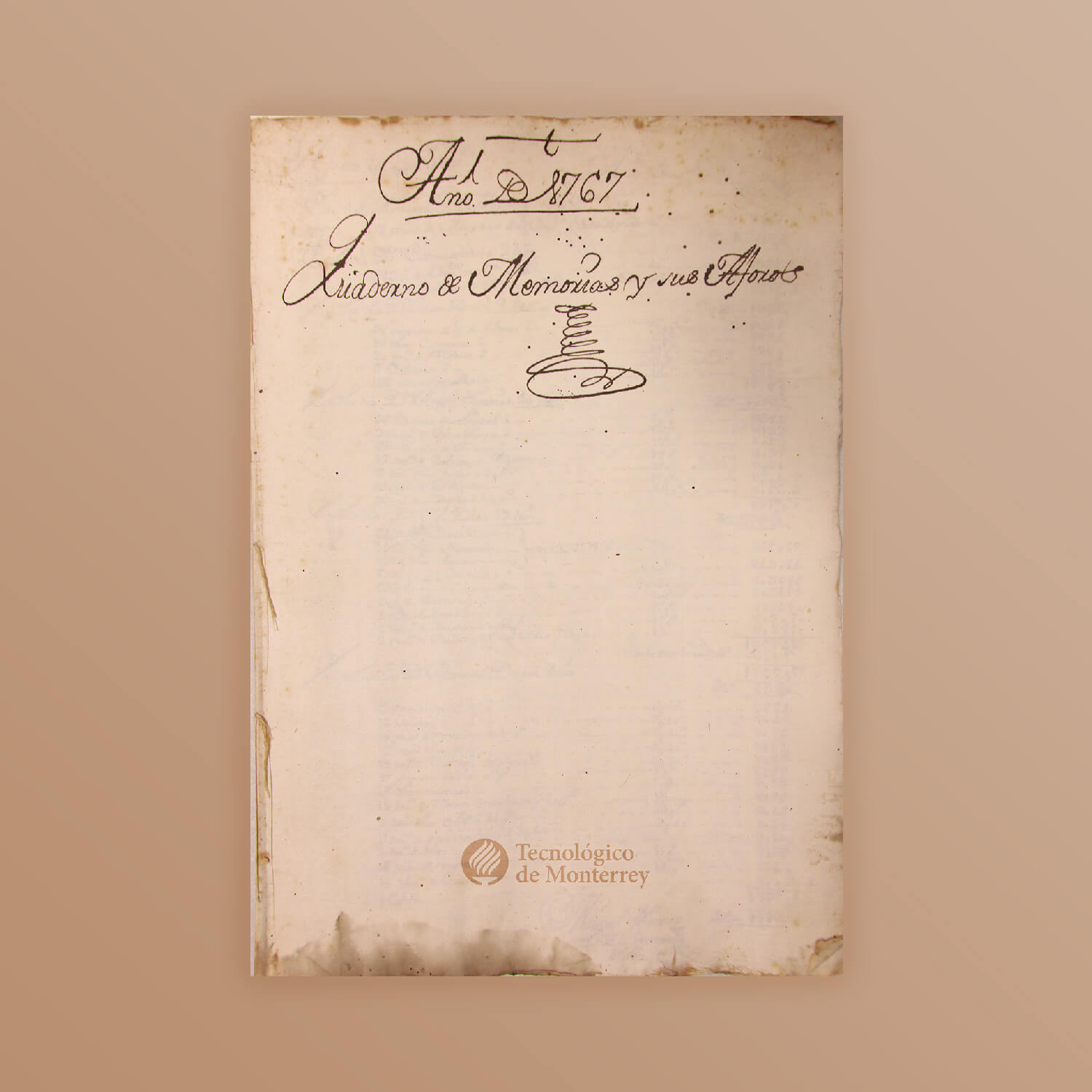
Cuaderno de memorias y sus aforos (manuscrito), 1767. Fondo Archivo Histórico de la Real Caja de Zacatecas 1576-1936, Colección Sociedad de Amigos de Zacatecas, A.C. en comodato al Tecnológico de Monterrey®.
Registro Memoria del Mundo de México, UNESCO, 2021. Patrimonio Cultural del Tecnológico de Monterrey®.
En el Cuaderno de memorias y sus aforos de 1767, quedaron registrados los productos y mercancías que entraron durante dicho año a la ciudad. Las anotaciones que elaboraban los oficiales reales para el cobro de la alcabala eran muy puntuales, pues anexaban: día, mes, comerciante, cantidad de productos o mercancías por registro, precio, el total del producto o la mercancía y, por último, lo que se debía pagar de impuesto. Todas las hojas del cuaderno de memorias van rubricadas o con la firma del oficial real.
Este documento está disponible para su consulta en el Repositorio Institucional del Tecnológico de Monterrey a través del siguiente enlace: https://hdl.handle.net/11285/682783
Mayo, 2019
Irma Palacios (1943), Memoria en bronce, 1995. Bronce a la cera perdida. Campus Estado de México. Patrimonio Cultural del Tecnológico de Monterrey®.
La artista guerrerense nacida en 1943, desde muy joven formó parte del grupo de creadores posterior a la ruptura, quienes se interesaron por un tipo de arte más lírico e internacional, y buscaron eliminar las pretensiones de los movimientos o grupos de los años 60 y 70. La obra presenta un cuerpo grande que aparenta ser piedra, y dos mástiles pequeños que simulan ramas de un árbol. Su obra ha sido catalogada como parte del abstraccionismo lírico, donde su precedente más notable en nuestro país fue la artista Lilia Carrillo.
Junio, 2019
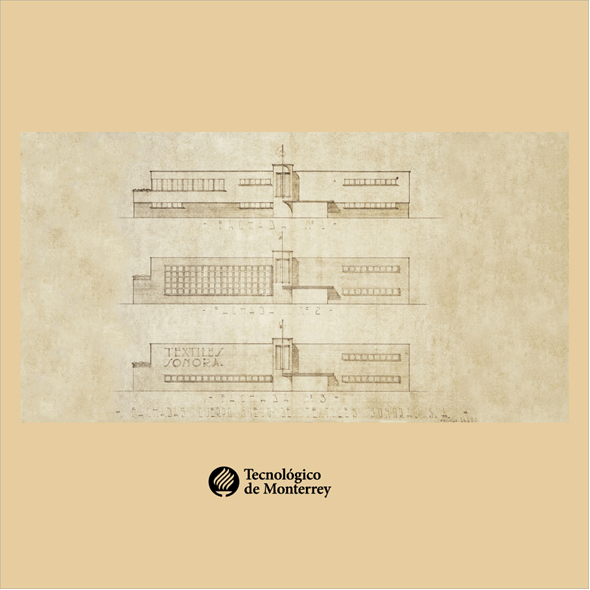
Gustavo Aguilar Beltrán (1918-2019), Fachadas de Textiles de Sonora, S.A., 1945. Fondo Arq. Gustavo Aguilar Beltrán. Campus Sonora Norte. Patrimonio Cultural del Tecnológico de Monterrey®.
Textiles Sonora fue un proyecto impulsado por los hermanos Rivero Solano y diseñado por el arquitecto Gustavo Aguilar Beltrán en Hermosillo, Sonora en 1945. Este se convertiría en una de las fábricas manufactureras de algodón más importantes del país y abriría muchas oportunidades de crecimiento económico en la región a través de la manufactura de textiles locales.
Agosto, 2019
Yolanda Andrade (1950), El niño y el infierno, 1985. Plata sobre gelatina. Campus Estado de México. Patrimonio Cultural del Tecnológico de Monterrey®.
El muchachito cuya mirada retadora nos impreca desde El niño y el infierno, tomada por Yolanda Andrade (n. 1950), es uno de esos mexicanos de aquel submundo aparente. Su práctica ha estado siempre en las calles, retratando la cotidianeidad, enseñado alumnos a mirar al sesgo, a volver a ver eso que nos pasa inadvertido diariamente. Andrade fue profesora de fotografía en el Tecnológico de Monterrey, allí enseñó a mirar y hacer coincidir enunciados sobre condiciones retadoras en el presente con la construcción de posibilidades para el futuro.
-Carlos A. Molina
Septiembre, 2019
Manuel Maples Arce (con ilustraciones de Jean Charlot), Vrbe. Super-poema bolchevique en 5 cantos, Ciudad de México, 1924: Editorial Andrés Bota e hijos. Fondo Porfirio Martínez Peñaloza. Campus Querétaro. Patrimonio Cultural del Tecnológico de Monterrey®.
Vrbe, escrita en 1924 por Manuel Maples Arce, es la obra más representativa del estridentismo – principal movimiento artístico de vanguardia en México. Esta obra adopta ideas del socialismo soviético de principios del siglo XX y, al mismo tiempo, una expresión estética afín a la vanguardia europea. Su primera edición fue publicada en Ciudad de México y cuenta con ilustraciones hechas por el pintor francés Jean Charlot. Un ejemplar de esta edición forma parte del Fondo Porfirio Martínez Peñalosa, que es resguardado por la Biblioteca del Campus Querétaro.
Octubre, 2019
Arnaldo Coen (1940), El sonido que disgrega, s/f. Óleo sobre tabla. Campus Estado de México. Patrimonio Cultural del Tecnológico de Monterrey®.
Arnaldo José Coen Ávila (n. 1940) ha trabajado entre disciplinas diversas preguntándose dónde es que se distinguen las unas de las otras. Innova en los medios añadiendo tecnología a la práctica de la pintura, describe gráficamente cómo funciona la estructura de una pieza musical, hace esculturas e interviene en diversas museografías. El sonido se disgrega habla de haces de luz que van y vienen de la superficie del cuadro a nuestra mirada, se descomponen en una miríada de colores y nos recuerdan que las imágenes que relacionamos con la música funcionan de un modo muy parecido: provocando que nuestra percepción se aguce al advertir tres dimensiones.
-Carlos A. Molina
Noviembre, 2019
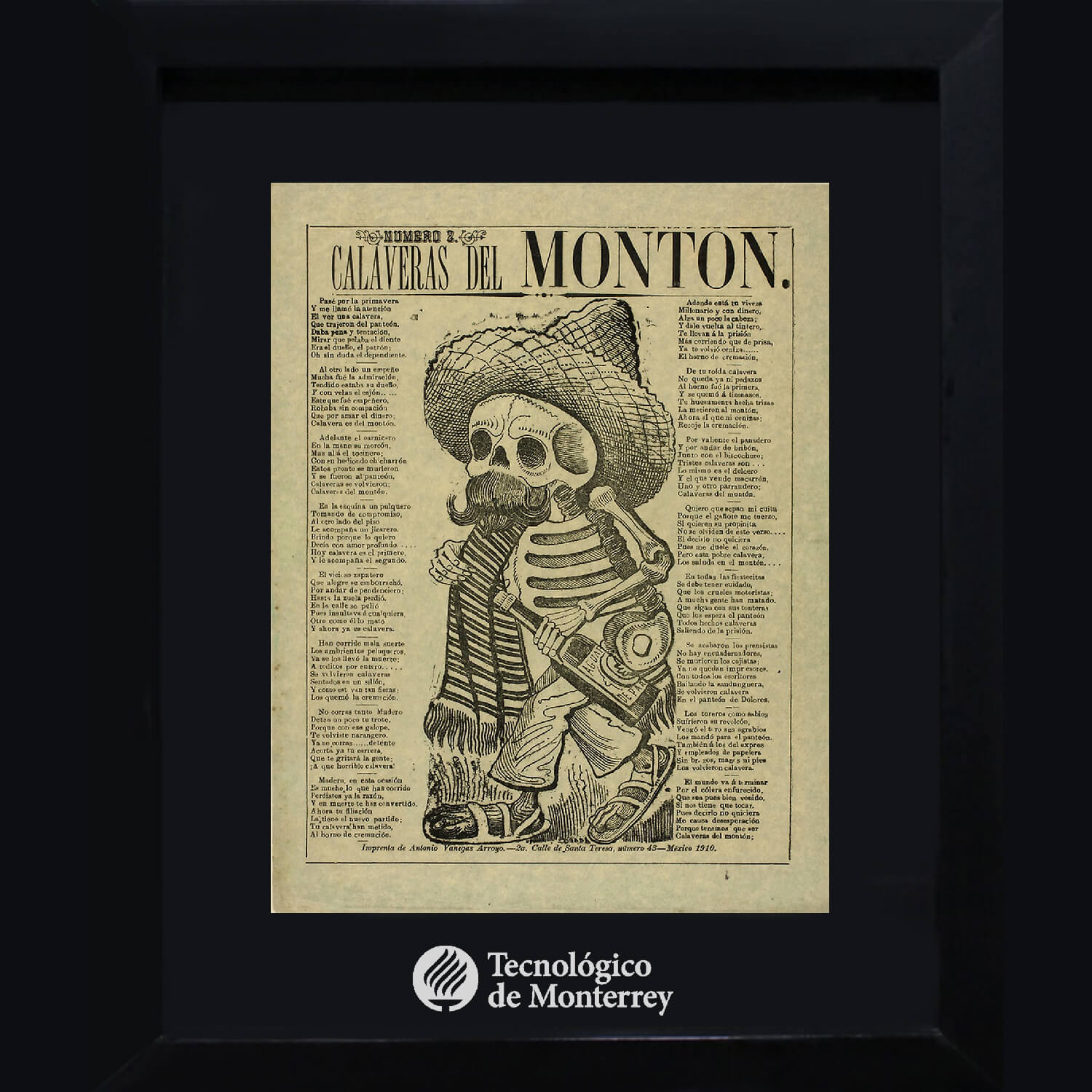
José Guadalupe Posada (1852-1913), Calaveras del montón núm. 8, 1910. Zincografía. Campus Estado de México. Patrimonio Cultural del Tecnológico de Monterrey®.
José Guadalupe Posada (1852-1913) fue un grabador, dibujante e ilustrador, cuyo trabajo prácticamente anónimo, se ha convertido involuntariamente, en parte del imaginario de “lo mexicano”. Durante su carrera destacó su colaboración con la imprenta de Vanegas Arroyo, con la cual realizó las Calaveras del montón, hojas sueltas que retrataban las famosas calaveritas escritas en verso, con las que se hace alusión a la muerte de forma irónica y burlona, aprovechando situaciones históricas o recientes. En los versos se cuentan las distintas situaciones de gente local, el panadero, el carnicero, el pulquero, el zapatero, sin embargo, destaca la mención en dos estrofas de Francisco I. Madero.
Diciembre, 2019
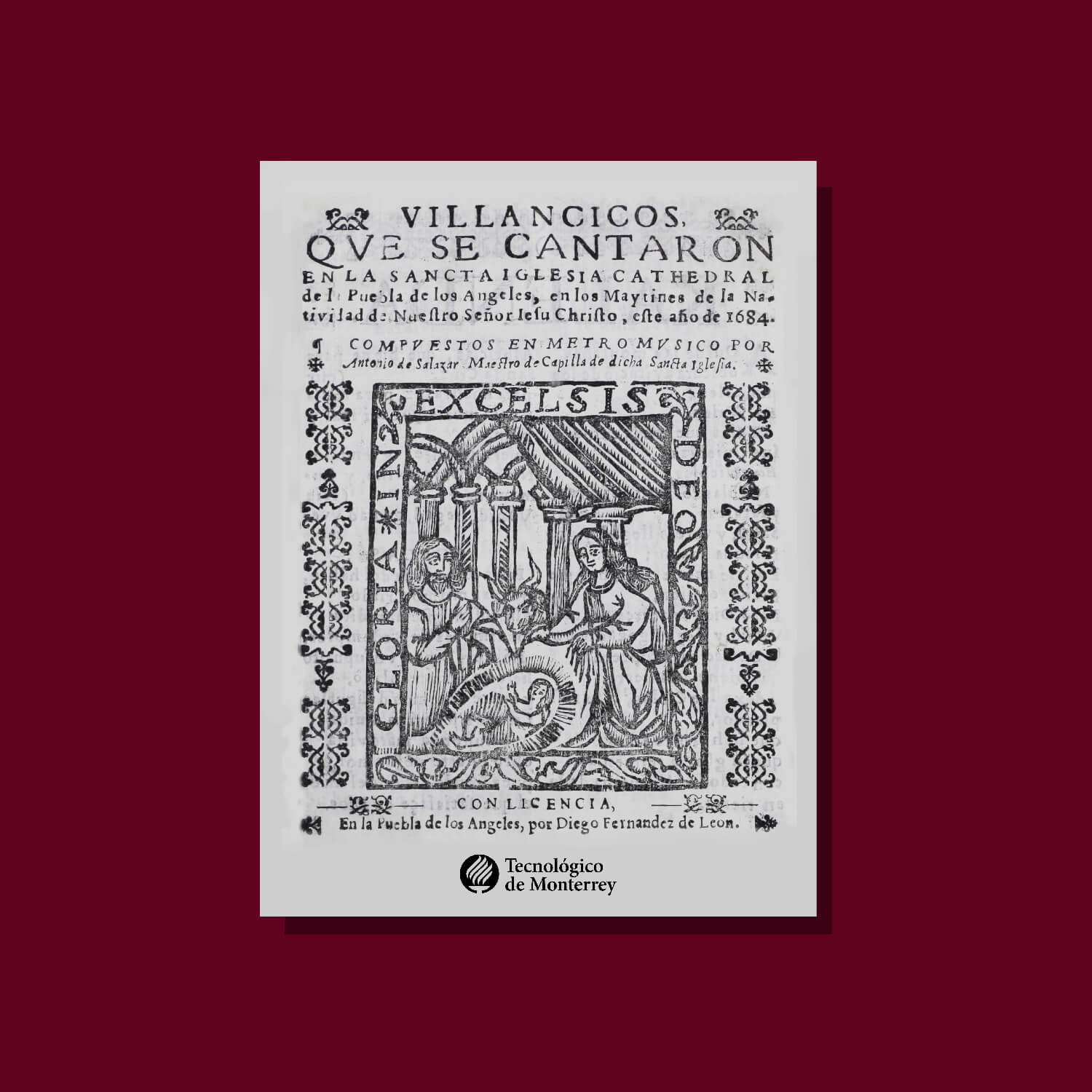
Antonio de Salazar, Villancicos que se cantaron en la Sancta Iglesia Cathedral de la Puebla de los Angeles, en los Maytines de la Natividad de Nuestro Señor Iesu Christo, este año de 1684. Fondo Conde Zambrano. Biblioteca de Colecciones Especiales "Miguel de Cervantes Saavedra". Campus Monterrey. Patrimonio Cultural del Tecnológico de Monterrey®.
Esta obra data de 1684 y es probablemente la primera edición de Los villancicos de la Natividad. Este ejemplar se encuentra empastado en una miscelánea de 16 villancicos poblanos y posee marcas de fuego en los tres cantos. En la portada de diseño barroco se puede ver la representación tradicional del nacimiento de Cristo junto con las palabras latinas Gloria In Excelsis Deo, que, de acuerdo con la tradición cristiana, usaron los ángeles para informar a los pastores la nueva noticia. Estos villancicos se cantaron entre la medianoche y el amanecer del 25 de diciembre de dicho año.
Enero, 2020
Jorge González Camarena (1908-1980), Detalle de: El Quijote en Monterrey, 1954. Óleo sobre madera. Biblioteca de Colecciones Especiales "Miguel de Cervantes Saavedra". Campus Monterrey. Patrimonio Cultural del Tecnológico de Monterrey®.
En esta obra, de formato amplio y apaisado, se representa la imagen de Don Quijote junto al Cerro de la Silla y las montañas de La Huasteca, dos de los elementos orográficos más característicos de la ciudad de Monterrey. En la obra destacan además los acompañantes del protagonista de la novela clásica de Cervantes como son el caballo Rocinante, Sancho Panza y su jumento, mejor conocido como "el rucio". Asimismo, también se observa la balanza, como símbolo de justicia.
Febrero, 2020
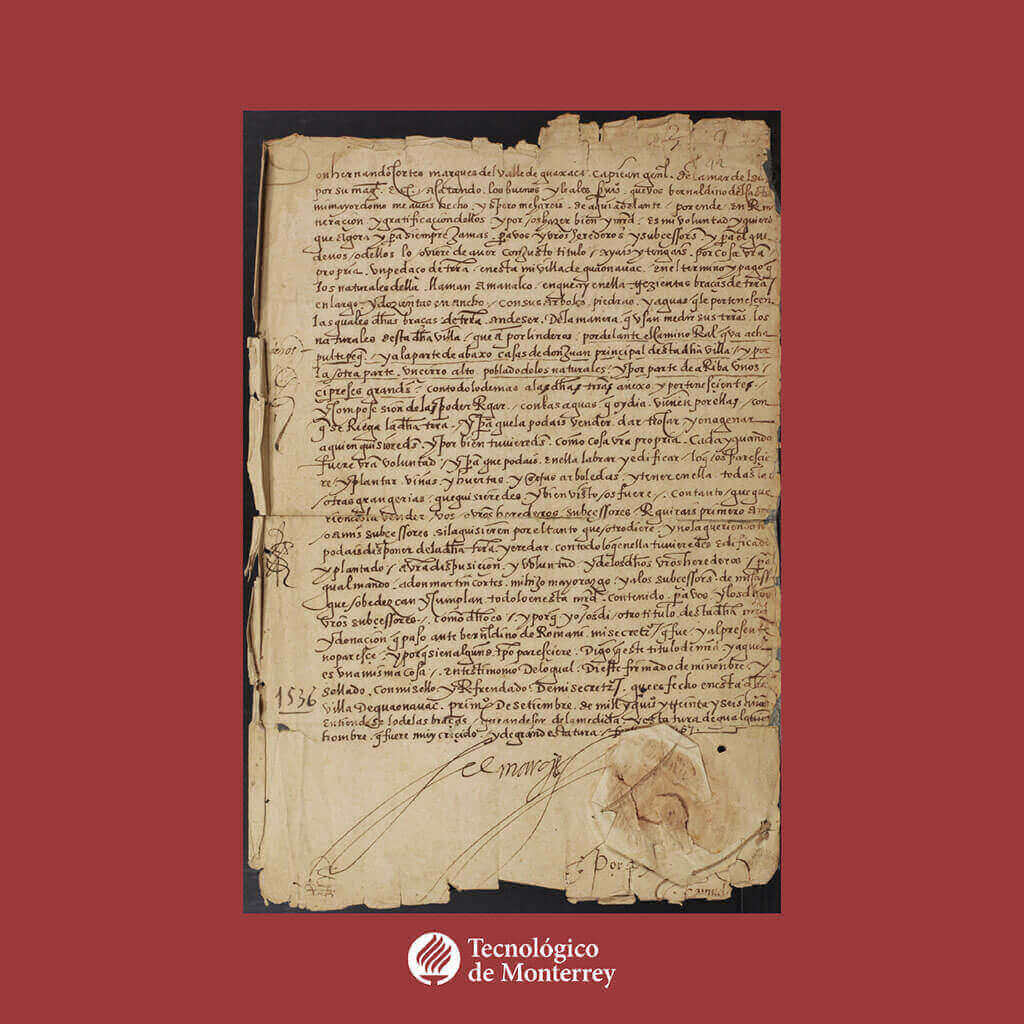
Hernán Cortés (1485-1547), Título de una concesión de tierras, hecha por Hernán Cortés a Bernardino del Castillo (manuscrito), Cuernavaca, 1536. Fondo G.R.G. Conway. Biblioteca de Colecciones Especiales "Miguel de Cervantes Saavedra". Campus Monterrey. Patrimonio Cultural del Tecnológico de Monterrey®.
Documento que data del siglo XVI donde Hernán Cortés cedió una parte de sus tierras a Bernardino del Castillo. En este escrito se puede observar la firma autógrafa del Marqués del Valle de Oaxaca (Hernán Cortés) título que le fue concedido por Carlos V el 6 de julio de 1529 como recompensa por sus servicios a la corona. Esta obra forma parte del fondo G.R.G. Conway, el cual perteneció al ingeniero civil e historiador George Robert Graham Conway, quien reunió muchos documentos que corresponden a este período. El archivo digital está disponible para su consulta en el Repositorio Institucional del Tecnológico de Monterrey.
Abril, 2020
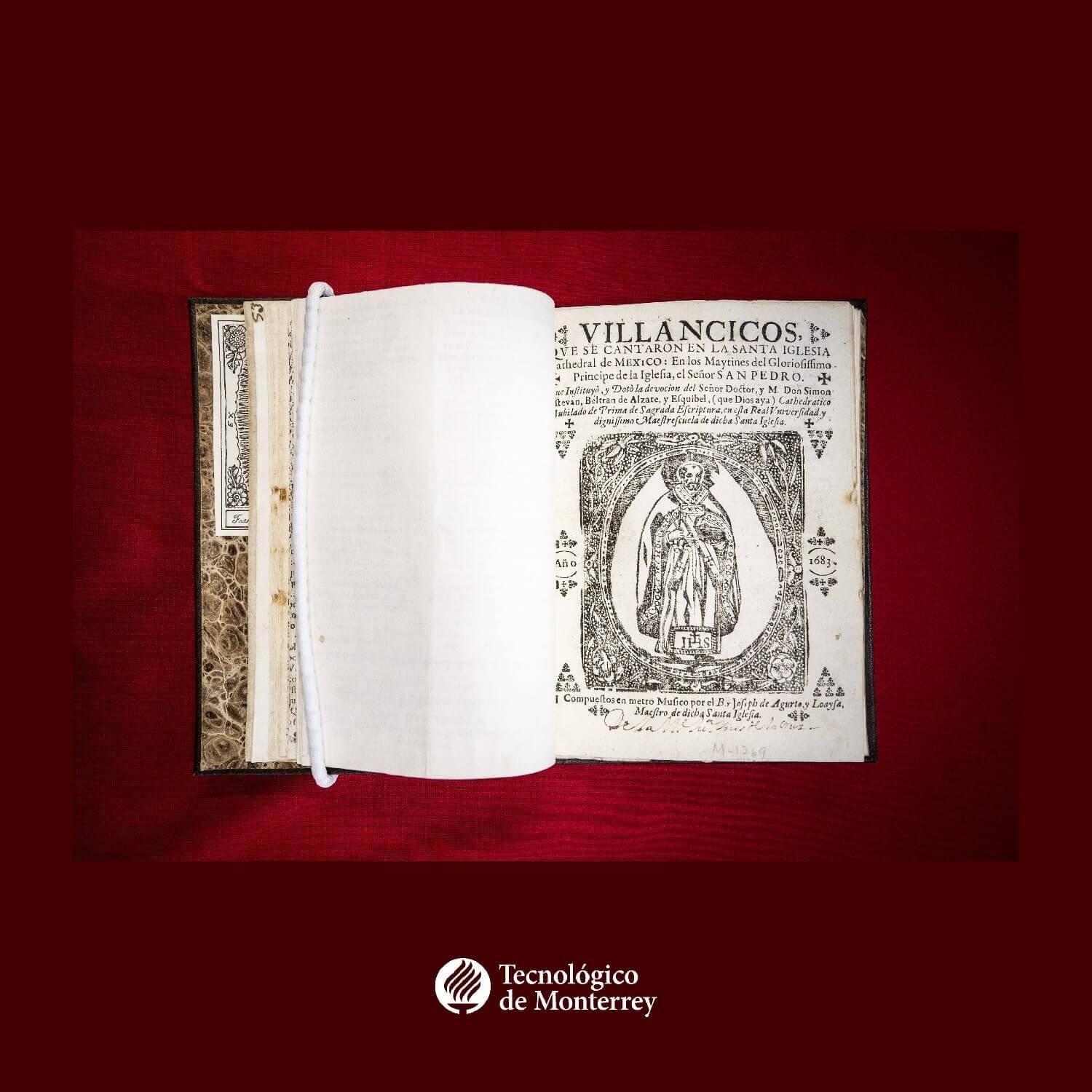
Sor Juana Inés de la Cruz (1648-1695), Villancicos a San Pedro Nolasco, 1677. Fondo Salvador Ugarte. Biblioteca de Colecciones Especiales "Miguel de Cervantes Saavedra". Campus Monterrey. Patrimonio Cultural del Tecnológico de Monterrey®.
Esta obra data de 1677 y consiste en un cuadernillo de ocho páginas el cual es probablemente la primera edición de los Villancicos a San Pedro Nolasco. Este ejemplar tiene un interés especial, pues incluye algunas correcciones y comentarios en los márgenes y sobre el texto escritos en tinta por la propia Sor Juana, así como su nombre en la portada.
Mayo, 2020
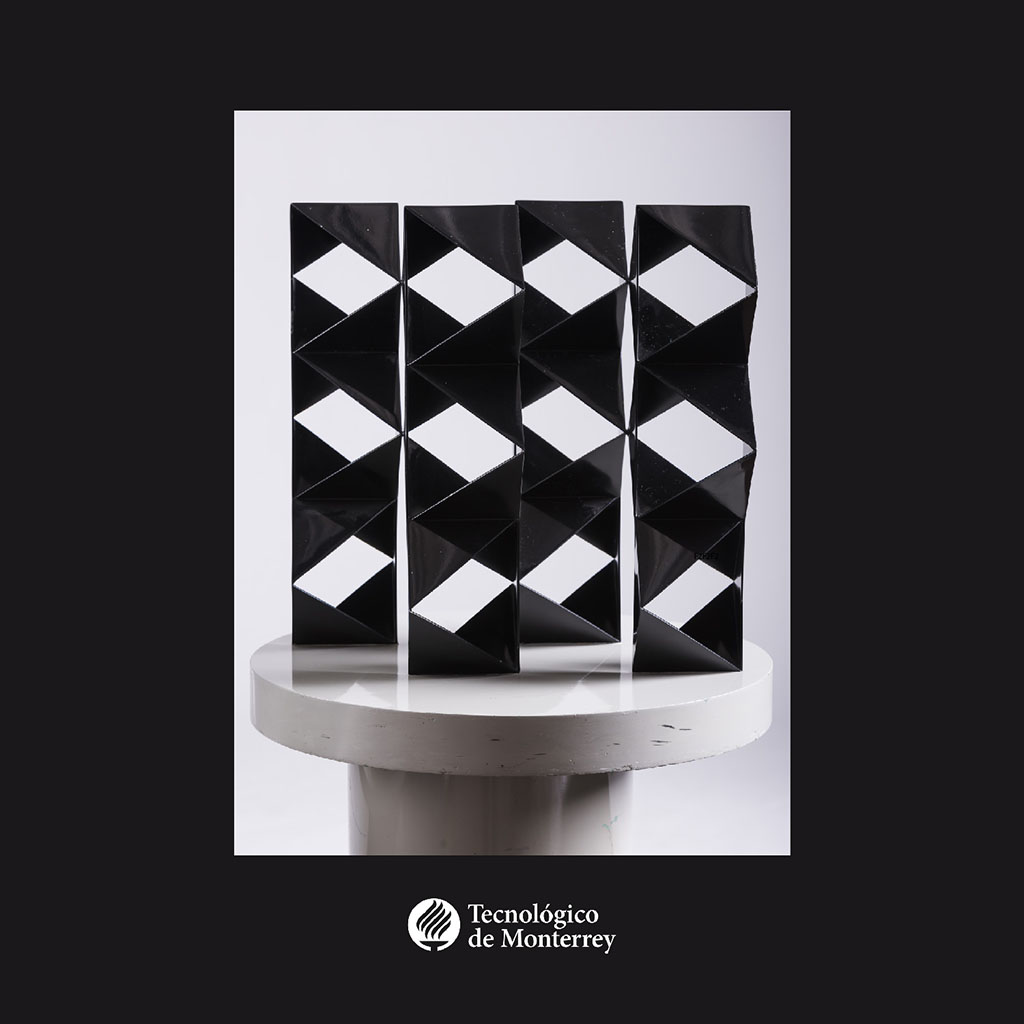
Jesús Mayagoitia (1948), Cuatro torres, 1991. Acero pintado. Campus Estado de México. Patrimonio Cultural del Tecnológico de Monterrey®.
Foto: Luis Enrique Sandoval
Jesús Mayagoitia, es un artista reconocido mundialmente cuyo interés siempre ha sido la calidad en la producción escultórica y la educación estética para todos. En su obra se aprecian las diversas configuraciones que cuerpos geométricos proyectados sobre un plano, la manera en que los percibimos en el espacio y cómo nos relacionamos a partir de ello. Cuatro torres, es una escultura giratoria cuyo pedestal cuenta en su interior con un motor que obliga a percibir desde distintos ángulos las formas y espacios que crea. Ganador del Premio Henry Moore en 1987, Mayagoitia no solo es un creador, sino promotor y docente en México desde los años setenta en la Escuela Nacional de Artes Plásticas, actual Facultad de Artes y Diseño en la UNAM.
Junio, 2020

Giovanni Battista Ramusio (1485-1557), Terzo volume delle navigationi et viaggi…, 1556. Fondo Salvador Ugarte. Biblioteca de Colecciones Especiales “Miguel de Cervantes Saavedra”. Campus Monterrey. Patrimonio Cultural del Tecnológico de Monterrey®.
Giovanni Battista Ramusio (1485-1557) fue un diplomático, geógrafo y humanista italiano de la República de Venecia. Formó parte de la corte del rey francés Luis XII, en donde se desempeñó en la exploración francesa en América del Norte y se interesó en las rutas marítimas a América. Delle Navigationi et viaggi es conocida como su obra más importante ya que fue el primer trazado geográfico moderno, publicado entre 1550 y 1606. Esta obra recopila diversos relatos de viajes que datan desde exploraciones en la antigüedad clásica hasta el siglo XVI. El ejemplar que se muestra es la primera edición del tercer volumen. Una reproducción facsimilar de este ejemplar fue incluida en la exposición Visión de Anáhuac. Alfonso Reyes, realizada en el Museo Nacional de Antropología entre diciembre de 2019 y marzo de 2020.
Julio, 2020

José Reyes Meza (1924-2011), Historia de la medicina, 1969. Mural transportable al fresco. Escuela de Medicina, CITES. D.R. © José Reyes Meza/SOMAAP/México/2023. Patrimonio Cultural del Tecnológico de Monterrey®.
Este mural fue realizado para el vestíbulo del edificio principal de la cadena de Farmacias Benavides en Monterrey, adquirido en 2001 por el Tecnológico de Monterrey. En la obra se representa la síntesis de la historia de la medicina desde la época prehispánica hasta el desarrollo moderno. En febrero de 2019, debido a la demolición para la remodelación del campus, se realizaron las gestiones para rescatar la obra y reubicarla en la Escuela de Medicina, CITES. José Reyes Meza, es considerado como uno de los últimos muralistas de la vanguardia mexicana. Su obra se puede encontrar en colecciones públicas y privadas, principalmente en México y los Estados Unidos, como el Museo Nacional de Historia, Museo de Arte de Phoenix y el museo Alfa de Monterrey, entre otros.
-Lizette Zaldívar Larrañaga
Agosto, 2020
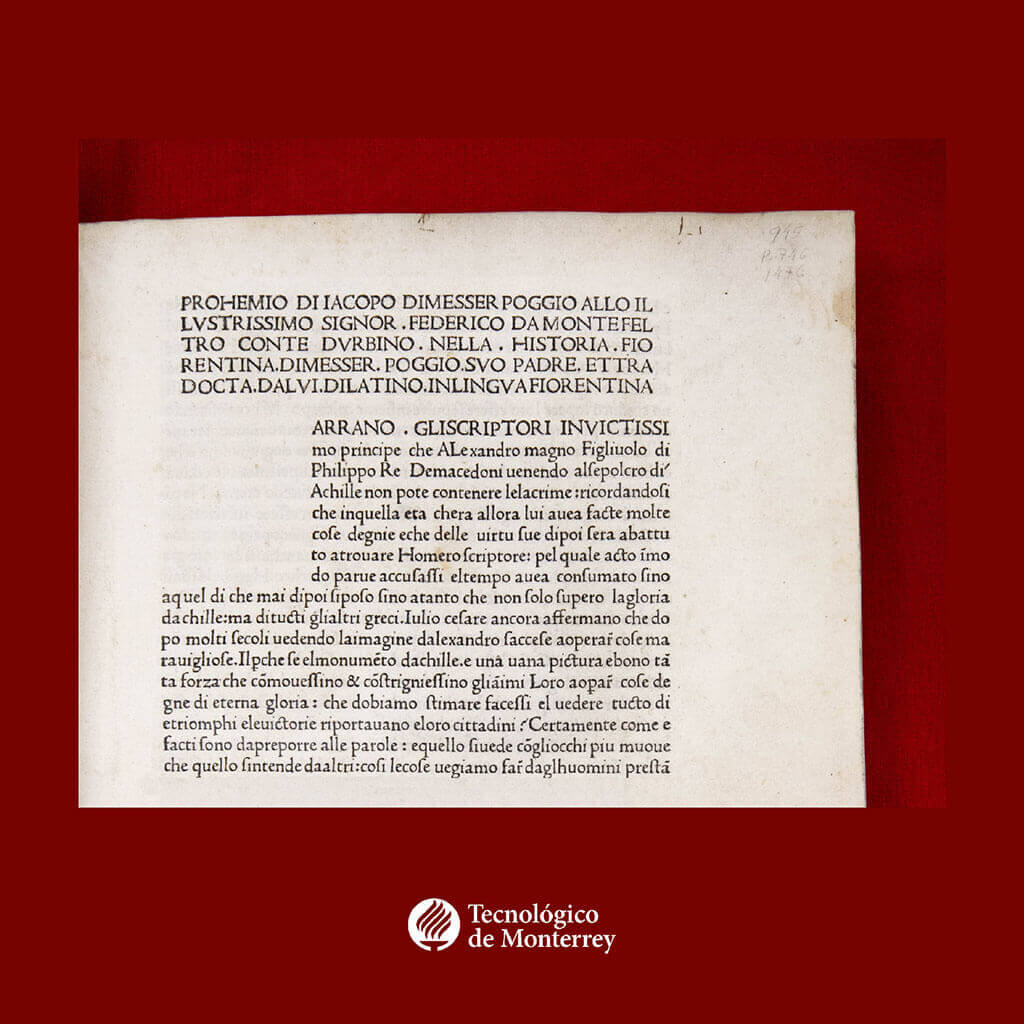
Poggio Bracciolini (1380-1459), Historia Fiorentina, 1476. Fondo Salvador Ugarte. Biblioteca de Colecciones Especiales “Miguel de Cervantes Saavedra”. Campus Monterrey. Patrimonio Cultural del Tecnológico de Monterrey®.
Bracciolini, Poggio (1380-1459) es conocido como uno de los humanistas y calígrafos más eminentes durante los principios del Renacimiento. Este autor creó los manuscritos humanistas, los cuales sirvieron para el nuevo arte de la impresión como prototipo de las fuentes romanas. Historia Florentina, publicado en 1476, surge del interés de este autor por recopilar manuscritos griegos y latinos y por estudiar edificios y esculturas. Esto lo llevó a indagar más en sus últimos años acerca de la historia de Florencia. El ejemplar que se muestra pertenece a la colección de Incunables del Tecnológico de Monterrey.
Septiembre, 2020
Jorge González Camarena (1908-1980), Microcosmos, 1954. Vestíbulo de Rectoría, Campus Monterrey. Patrimonio Cultural del Tecnológico de Monterrey®.
Microcosmos es uno de los murales realizados como díptico en el vestíbulo de la actual rectoría. Ambos abordan del origen de la vida y el universo. El lateral izquierdo, Microcosmos, describe desde la base del mosaico el surgimiento de la vida desde la tierra y culmina con una figura humana interconectada con el tronco y las raíces. La postura del personaje nos recuerda al hombre de Vitruvio o el estudio de las proporciones ideales de Leonardo da Vinci. Los brazos de esta figura, a diferencia del tronco, parecen diseñados artificialmente y se podrían interpretar como la herramienta humana para la construcción de la civilización. Enmarcan a la figura por un lado con la representación del fuego y por otro del agua, los cuales participan en el ciclo de la vida en conjunto con el reino animal, vegetal y mineral en la parte inferior izquierda.
Octubre, 2020
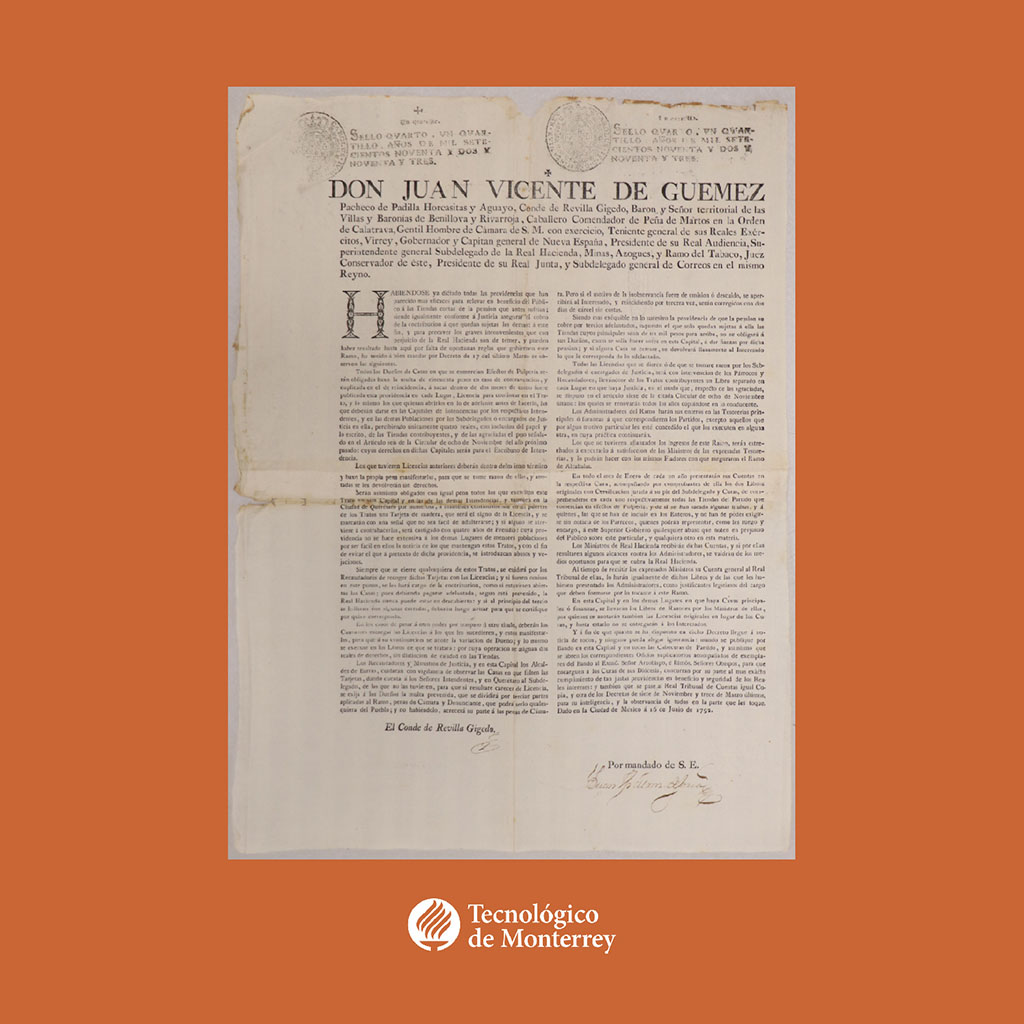
Don Juan Vicente de Güemes Pacheco de Padilla Horcasitas y Aguayo, conde de Revillagigedo…,virrey, gobernador y capitán general de Nueva España … Habiéndose ya dictado todas las providencias que han parecido más eficaces para relevar en beneficio del público a las tiendas cortas de la pensión que antes sufrían... (bando/decreto impreso), 1792. Fondo Archivo Histórico de la Real Caja de Zacatecas, Colección Amigos de Zacatecas, A.C. en comodato al Tecnológico de Monterrey®. Registro Memoria del Mundo de México, UNESCO, 2021. Patrimonio Cultural del Tecnológico de Monterrey®.
Juan Vicente de Güemes Pacheco de Padilla Horcasitas y Aguayo, conde de Revillagigedo, fue virrey de la Nueva España de 1789 a 1794. Durante este período dictó diferentes ordenamientos, el propósito del virrey era reestructurar la Nueva España. Para ello, ordenó un estudio minucioso sobre las rentas que se producían en el virreinato. Uno de los ramos que se regularizaron fueron las pulperías o tiendas de abarrotes, y con este decreto de 1792, todos los dueños de las pulperías debían tener licencias vigentes, llevar registros de sus ventas y presentarlos anualmente ante las autoridades. Este bando en Zacatecas dio pie a la generación de censos sobre la cantidad de tiendas que había en la ciudad y en las localidades de su jurisdicción.
Este documento está disponible para su consulta en el Repositorio Institucional del Tecnológico de Monterrey a través del siguiente enlace: https://hdl.handle.net/11285/681195
Noviembre, 2020

Adolfo Mexiac, (1927-2019), Atrapando estrellas, 1990. Resinas y acrílicos sobre madera y tela. Campus Estado de México. D.R. © Adolfo Mexiac/SOMAAP/México/2023. Patrimonio Cultural del Tecnológico de Monterrey®.
Mexiac, fue un grabador y pintor michoacano, cuya obra se asocia con la Escuela Mexicana de Pintura y el Taller de la Gráfica Popular, ya que fue integrante de ambos grupos. Dedicó su trabajo a representar el México que le tocó vivir y al que incuestionablemente amaba. Atrapando estrellas, es una pieza cuya composición está dada en dos planos principales: el fondo y el personaje que sostiene en diagonal unas redes. Es una escena típica de corte popular con una paleta de colores fríos en la cual predomina en las dos terceras partes de la pieza, un ocre grisáceo y la tercera parte inferior, en azul, representa al agua. Destacan las redes que sostiene el personaje principal cuya acción nos recuerda a un pescador de lago de Pátzcuaro que emula al cielo y los reflejos de las luces de día de muertos podrían ser las estrellas, que no vemos propiamente en el cuadro, y que sin embargo imaginamos con las transparencias del agua en los pies del pescador.
Diciembre, 2020
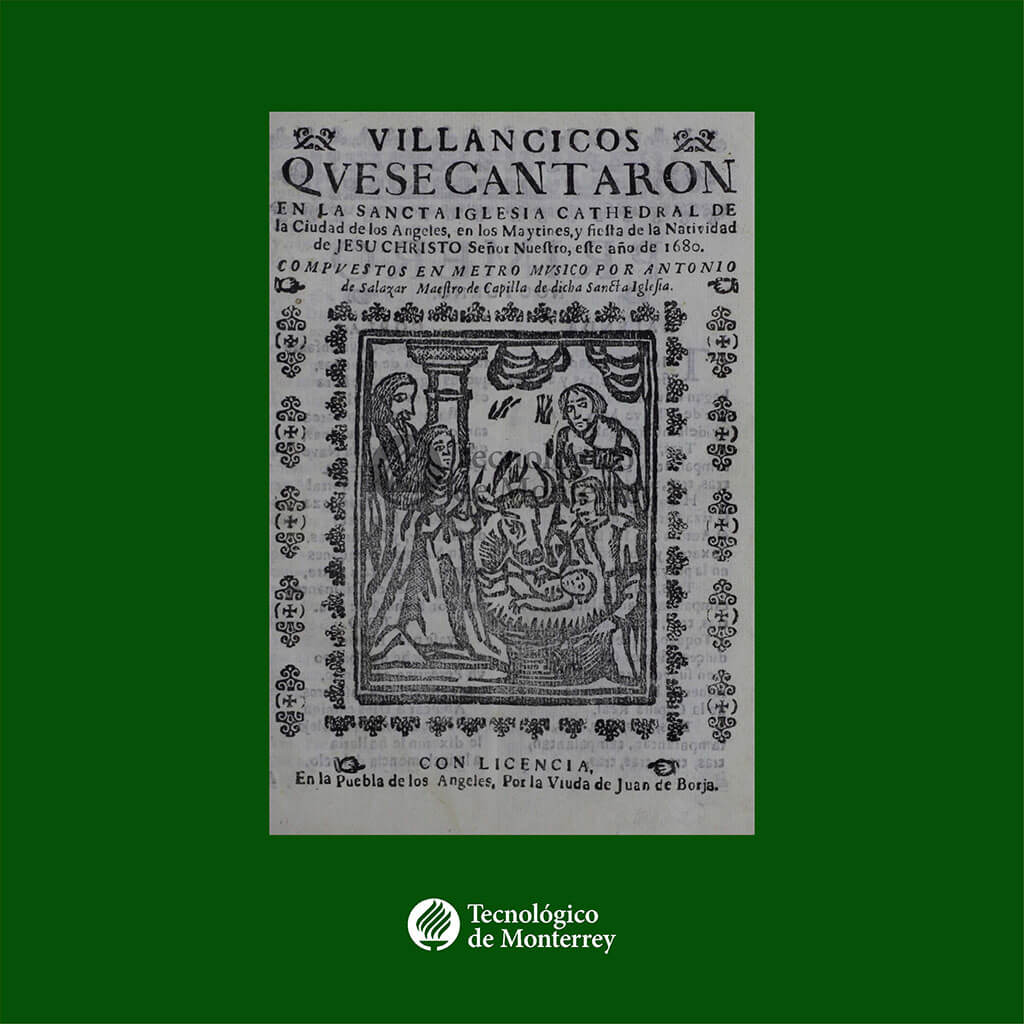
Antonio de Salazar, Villancicos qve se cantaron en la sancta iglesia Cathedral de la ciudad de los Angeles, en los maytines, y fiestas de la Natividad de Jesu Christo Señor Nuestro, este año de 1680, Viuda de Juan de Borja. Fondo Conde Zambrano. Biblioteca de Colecciones Especiales “Miguel de Cervantes Saavedra”. Campus Monterrey. Patrimonio Cultural del Tecnológico de Monterrey®.
Los villancicos son composiciones utilizadas en el ámbito eclesiástico, cuyo significado cobra vida a través de la conjugación de la música, la poesía y la representación. En la época novohispana, estas obras jugaron un rol importante por su contribución a la divulgación de la doctrina cristiana. La obra que aquí se muestra fue compuesta por Antonio de Salazar (1650-1715), quien fue nombrado maestro de la capilla de la Catedral de Puebla en 1679. Salazar se dedicó a componer música sacra y musicalizó diversos villancicos escritos, incluyendo algunos escritos por sor Juana Inés de la Cruz para distintas festividades. Sus obras fueron reconocidas en toda la Nueva España y es considerado un innovador ya que introdujo cánticos en diversas formas literario-musicales que no eran comunes en América. El Tecnológico de Monterrey custodia diversos villancicos, de Antonio de Salazar y otros autores, incluyendo estos que fueron cantados en la Catedral de Puebla en la navidad de 1680.
Enero, 2021
Francisco de Alvarado, Vocabulario en lengua misteca, hecho por los Padres de la Orden de Predicadores, que residen en ella, y últimamente recopilado, y acabado por el Padre Fray Francisco de Aluarado, vicario de Tamaçulapa, de la misma Orden, 1593. Impresor: Pedro Balli. Fondo Salvador Ugarte. Biblioteca de Colecciones Especiales “Miguel de Cervantes Saavedra”. Campus Monterrey. Patrimonio Cultural del Tecnológico de Monterrey®.
Breve glosario elaborado a partir de la obra de Antonio de los Reyes y otros dominicos. Contiene información sobre la cultura material, la organización social y la religión de la época precolonial, y demuestra la forma en que se forjaron las traducciones para las ideas y tecnologías introducidas por los españoles. Esta obra recoge miles de vocablos y se presenta ordenada alfabéticamente con 18 de las 28 letras de nuestro alfabeto. El ejemplar que se muestra forma parte de la Colección Impresos mexicanos del siglo XVI, la cual cuenta con Registro Memoria del Mundo, Región América Latina y el Caribe otorgado por la UNESCO al Tecnológico de Monterrey en conjunto con la Biblioteca Nacional de México.
Este documento está disponible para su consulta en el Repositorio Institucional del Tecnológico de Monterrey a través del siguiente enlace: https://hdl.handle.net/11285/638981
Febrero, 2021
Thomas Harriot (con grabados de Theodor de Bry, 1590), Admiranda narratio fida tamen, de commodis et incolarvm ritibvs Virginiae. Fondo Salvador Ugarte. Biblioteca de Colecciones Especiales “Miguel de Cervantes Saavedra”. Campus Monterrey. Patrimonio Cultural del Tecnológico de Monterrey®.
Esta obra es un caso ejemplar que muestra cómo los impresos cobran relevancia no solo por el testimonio histórico que ofrecen sus textos, sino también por su aportación artística como obras gráficas. El texto comparte, a manera de informe, las experiencias que vivió el astrónomo y matemático inglés Thomas Harriot en las costas de Carolina del Norte durante una expedición a las Américas organizada por Sir Walter Raleigh. Harriot describe la organización social y costumbres de los pueblos nativos, así como los recursos naturales y minerales que se encontraron en esas tierras. La narración fue publicada por primera vez en inglés en 1588 con ilustraciones del acuarelista John White; posteriormente en 1590, el célebre grabador Theodor de Bry colaboró para editar una versión traducida a cuatro idiomas que incluía grabados inspirados en las ilustraciones de White. El ejemplar mostrado aquí es la versión en latín con grabados de Theodor de Bry.
Marzo, 2021
Alonso de Molina, Confessionario mayor, en lengua mexicana y castellana, 1565. Fondo Salvador Ugarte. Biblioteca de Colecciones Especiales “Miguel de Cervantes Saavedra”. Campus Monterrey. Patrimonio Cultural del Tecnológico de Monterrey®.
El autor de esta obra es el reconocido lexicógrafo fray Alonso de Molina, quien llegó a la Nueva España desde una temprana edad, en donde rápidamente aprendió la lengua náhuatl; esto facilitó su convivencia con los indígenas y lo convirtió en un reconocido maestro de náhualt, a pesar de no ser hablante nativo. Este confesionario mayor era un manual para los sacerdotes en la Nueva España en la lengua originaria con traducciones en castellano y la utilizaban para realizar el sacramento de confesión. Esta obra data de 1565 y fue impresa por Antonio de Espinosa.
Abril, 2021
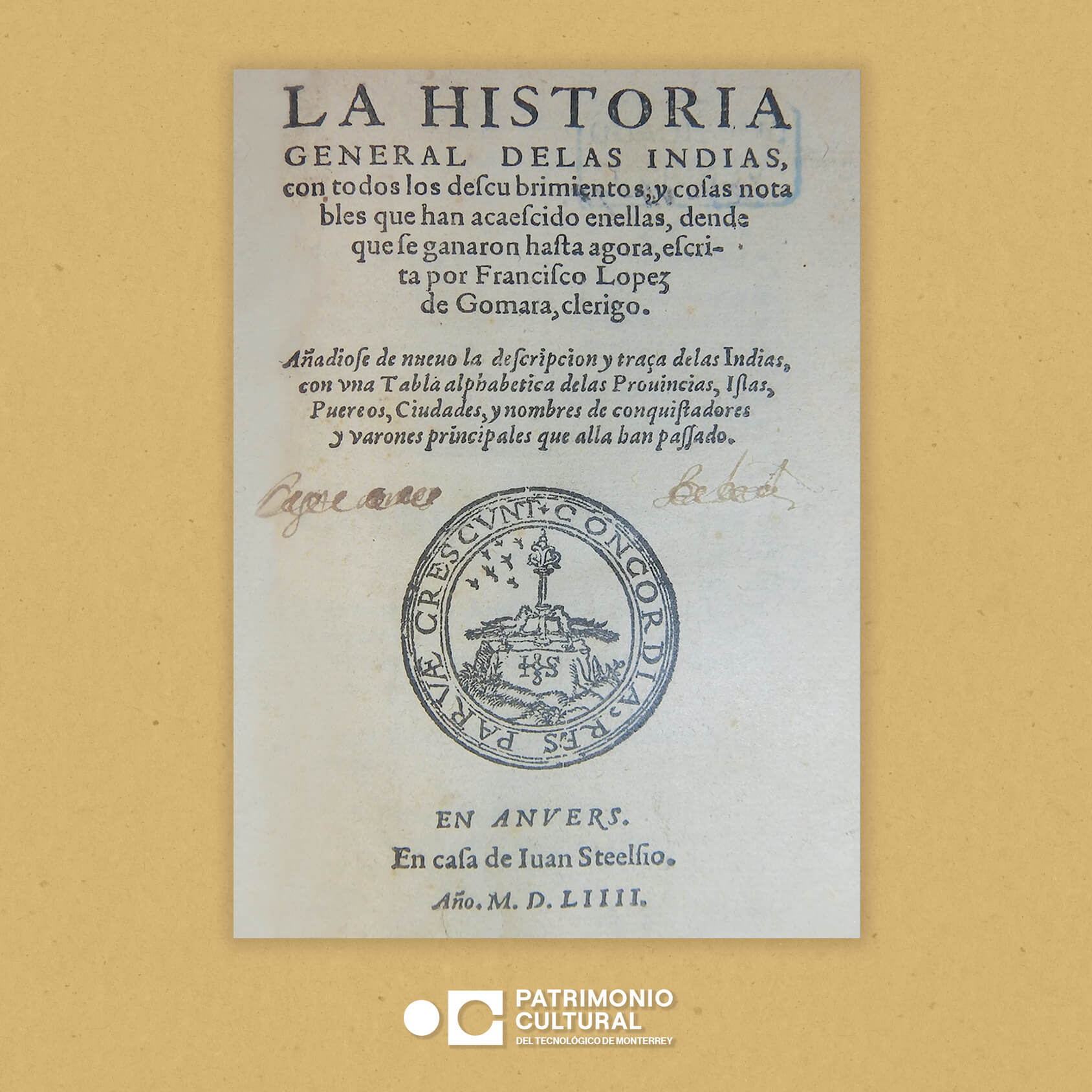
Francisco López de Gómara, Historia General de las Indias, 1554. Fondo Pedro Robredo. Biblioteca de Colecciones Especiales "Miguel de Cervantes Saavedra". Campus Monterrey. Patrimonio Cultural del Tecnológico de Monterrey®.
En su libro Historia General de las Indias, Francisco López de Gómara, quien nunca estuvo en América, narró desde una perspectiva eurocéntrica, el descubrimiento y conquista del nuevo continente. La publicación de este libro llevó al autor a tener varios enfrentamientos discursivos con Bernal Díaz del Castillo y fray Bartolomé de las Casas. En 1556 por Real Cédula se prohibió su impresión en España; en gran medida porque engrandecía a la figura de Hernán Cortés o por las críticas dirigidas a los Reyes Católicos.
Mayo, 2021
Girolamo Benzoni, America pars qvarta..., (con grabados de Theodor de Bry), 1594. Fondo Salvador Ugarte. Biblioteca de Colecciones Especiales "Miguel de Cervantes Saavedra". Campus Monterrey. Patrimonio Cultural del Tecnológico de Monterrey®.
Girolamo Benzoni fue un explorador, comerciante y viajero, que estuvo en América durante quince años (1541-1555). A su regreso a Milán escribe Americae pars quarta: sive insignis et admiranda historia de reperta primum Occidentali India a Christophoro Columbo. Benzoni narra el proceso de evangelización y la actitud que tenían los naturales ante los conquistadores, manifiesta su desacuerdo con la conquista de España sobre América por considerarlo un hecho de sangre, muerte y destrucción, pero también muestra horror ante la antropofagia de los indígenas. La primera edición se publicó en 1565 y se realizaron varias traducciones de la misma en lenguas europeas, incluyendo ediciones en latín, pero no en castellano. La primera edición en español se realizó hasta 1967 en Venezuela, enseguida aparecería otra publicada en España con una introducción y notas de Manuel Carrera Díaz. La relevancia de la obra de Girolamo Benzoni fue la introducción de los grabados realizados por Theodor de Bry.
Junio, 2021
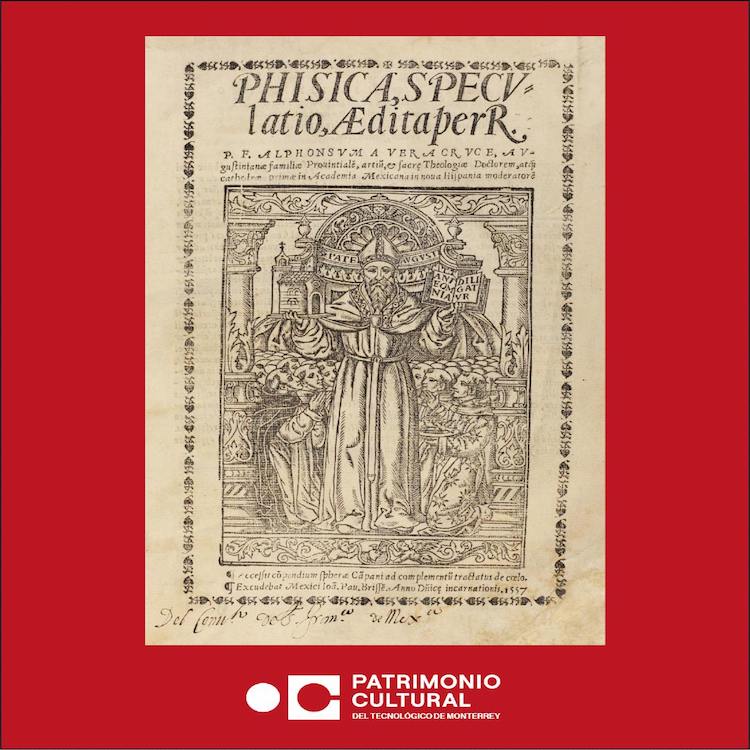
Alonso de la Vera Cruz, Phisica, specvlatio, 1557. Fondo Salvador Ugarte. Biblioteca de Colecciones Especiales "Miguel de Cervantes Saavedra". Campus Monterrey. Patrimonio Cultural del Tecnológico de Monterrey®.
Considerado el primer libro de física escrito en América, Phisica, specvlatio fue publicado en 1557. Su autor, fray Alonso de la Vera Cruz, fue uno de los filósofos novohispanos más reconocidos y estuvo a cargo de la primera cátedra de filosofía creada durante el virreinato en la Real y Pontificia Universidad de México. La obra tenía como propósito introducir los principales conceptos de física al “Nuevo Mundo”, abarcando los temas elaborados por Aristóteles. Este ejemplar forma parte de la colección Impresos Mexicanos del siglo XVI, la cual cuenta con un Registro Regional Memoria del Mundo otorgado por la UNESCO al Tecnológico de Monterrey en conjunto con la Biblioteca Nacional de México.
Este documento está disponible para su consulta en el Repositorio Institucional del Tecnológico de Monterrey a través del siguiente enlace: https://hdl.handle.net/11285/637161
Julio, 2021
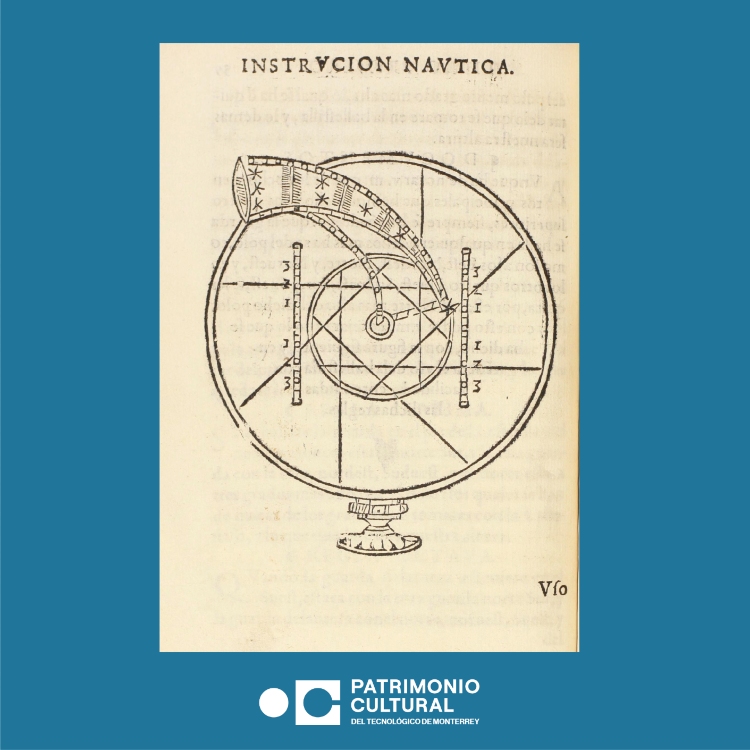
Diego García Palacio, Instrucion nauthica, para el buen uso, y regimiento de las Naos, su traça, y y gouierno conforme a la altura de Mexico, 1587. Fondo Salvador Ugarte. Biblioteca de Colecciones Especiales "Miguel de Cervantes Saavedra". Campus Monterrey. Patrimonio Cultural del Tecnológico de Monterrey®.
Esta obra, escrita por Diego García Palacio y publicada en 1587, tenía como propósito la aplicación de las teorías de navegación. Se encuentra dividida en cuatro libros o secciones. El primero abarca las esferas celestes y terrestres y estudia herramientas de navegación como el compás náutico, el cuadrante y la bastilla, al igual que el cálculo de las horas del día. En el segundo se narran los fenómenos astronómicos y se estudia el movimiento del sol y de la luna, así como la actividad de las mareas. La tercera parte se enfoca en los movimientos de los astros y la manera que afectan a los humanos. En la cuarta y última sección se aborda la construcción de barcos tomando en cuenta los rasgos del Océano Pacífico. El ejemplar que se muestra forma parte de la colección Impresos Mexicanos del siglo XVI.
Este documento está disponible para su consulta en el Repositorio Institucional del Tecnológico de Monterrey a través del siguiente enlace: https://hdl.handle.net/11285/637299
Agosto, 2021
Juan Gerson, Tripartito del Christianissimo y consolatorio doctor Juan Gerson de doctrina Christiana, 1544, Fondo Salvador Ugarte. Biblioteca de Colecciones Especiales "Miguel de Cervantes Saavedra". Campus Monterrey. Patrimonio Cultural del Tecnológico de Monterrey®.
El Tripartito… tenía como propósito facilitar la impartición de la doctrina cristiana durante el proceso de evangelización, a través de recomendaciones orientadas no solo a los sacerdotes sino también a seglares y niños. Esta obra fue escrita originalmente en latín por el teólogo y canciller Juan Gerson (1363-1429). La edición en castellano que se presenta fue encomendada por Fray Juan de Zumárraga a Juan Cromberger e impresa en México en 1544. Se le considera la primera obra impresa en América con ilustraciones en xilografía.
Este documento está disponible para su consulta en el Repositorio Institucional del Tecnológico de Monterrey a través del siguiente enlace: https://hdl.handle.net/11285/637123
Septiembre, 2021
Guillermo Ceniceros, (1939). Conmemorativo 2000. Escultura en acero. Campus Estado de México. Patrimonio Cultural del Tecnológico de Monterrey®.
Este obelisco monumental fue elaborado por Guillermo Ceniceros Reyes, autor de importantes obras públicas en México, Canadá y Estados Unidos. En la obra, el artista eligió usar la representación de rostros vistos de perfil como alusión a los estudiantes y profesores. Se vuelve emblemático al haber sido testigo del paso de un siglo a otro. Esta obra se realizó en Campus Estado de México como parte del proyecto constructivo del edificio que alberga el teatro, los talleres de Arte y Cultura y la alberca, ubicados a un costado de este. Recientemente se realizó un importante trabajo de restauración con base en la propuesta de su creador, quien enfatizó el contraste de color y formas, en el contexto donde se emplaza la obra. Para consultar un breve video sobre el proceso de restauración, favor de dar clic en el siguiente ENLACE.
-Lizette Zaldívar Larrañaga
Octubre 2021
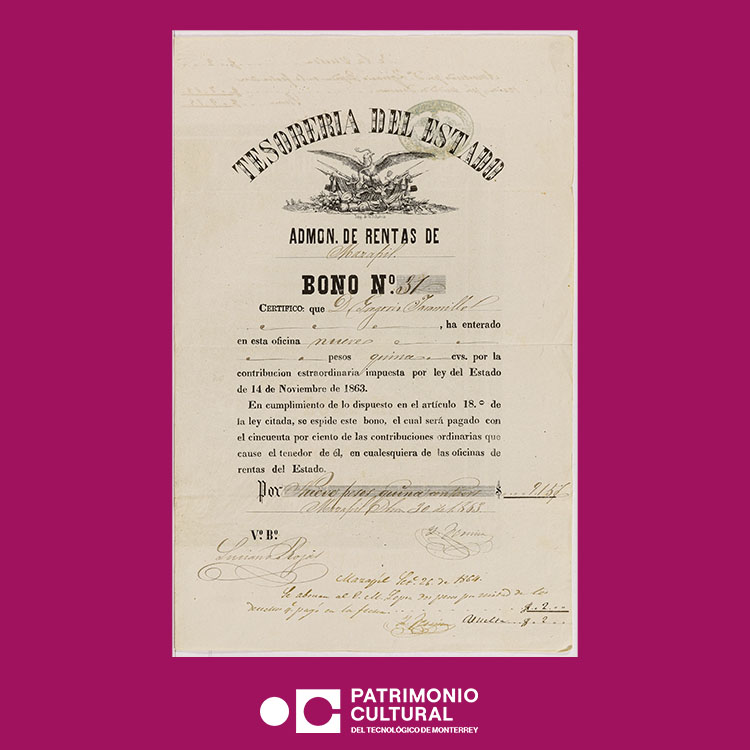
Bono No. 31, Tesorería del Estado de Zacatecas, 1864. Fondo Archivo Histórico de la Real Caja de Zacatecas 1576-1936, Colección Sociedad de Amigos de Zacatecas, A.C. en comodato al Tecnológico de Monterrey®.
Registro Memoria del Mundo de México, UNESCO, 2021. Patrimonio Cultural del Tecnológico de Monterrey®.
Las contribuciones extraordinarias fueron un recurso que utilizaron los gobiernos mexicanos para cubrir las necesidades del erario, en este caso, los gastos bélicos que se generaron antes y durante el Segundo Imperio encabezado por Maximiliano de Habsburgo. Los bonos eran documentos que amparaban el pago de las cuotas extra que se realizaban de manera adicional a las contribuciones ordinarias que se cobraban por parte de la Hacienda Pública del país. Este documento forma parte del Archivo Histórico de la Real Caja de Zacatecas, el cual se resguarda en Campus Zacatecas.
Este documento está disponible para su consulta en el Repositorio Institucional del Tecnológico de Monterrey a través del siguiente enlace: https://repositorio.tec.mx/handle/11285/637852
Noviembre 2021
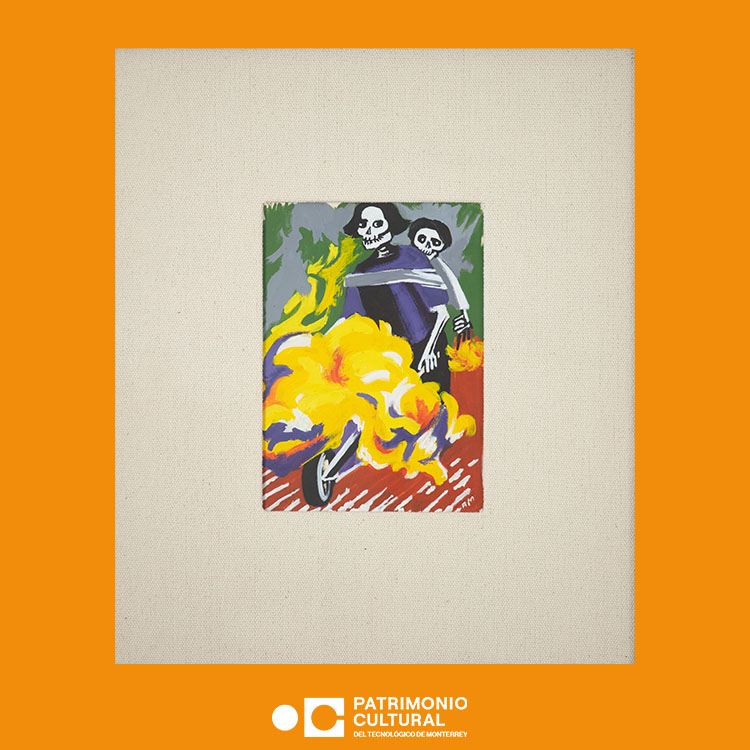
Adolfo Mexiac (1927-2019) Acarreando cempasúchil, 1993. Serigrafía, Núm. 280/500. Campus Estado de México. D.R.® Adolfo Mexiac/SOMAAP/México/2023. Patrimonio Cultural del Tecnológico de Monterrey®.
Esta pieza es la reproducción en serigrafía de una pintura en acrílico del mismo nombre. Se retrata a una calaca madre y su hijo, a quien carga en las espaldas con rebozo, mientras porta un carrito con flores de cempasúchil, flor importante en los altares del Día de muertos. Mexiac fue un artista que formó parte del Taller de la Gráfica Popular, donde desarrolló profusamente las distintas técnicas de grabado, sobre todo con una intención de poner al alcance al pueblo su imaginario artístico. Acarreando cempasúchil, forma parte de una carpeta de grabados editada por el Tecnológico de Monterrey, Campus Estado de México en 1993, para celebrar esa importante festividad mexicana.
Diciembre 2021
Arnold Belkin (1930-1992) Coatlicue, 1980. Dibujo en tinta, acuarela, y lápices conté sobre papel. Campus Estado de México. D.R.® Arnold Belkin/SOMAAP/México/2023.Patrimonio Cultural del Tecnológico de Monterrey®.
Artista canadiense que inspirado por el arte mexicano decidió trasladarse a México en 1948. Estudió en la Escuela de Pintura y Escultura “La Esmeralda” en el contexto de la Revolución Cubana por lo que su inclinación hacia el arte social, a inicios de los años sesenta, lo llevó a formar parte del movimiento artístico de ruptura, Nueva Presencia. Coatlicue, que en náhuatl significa “la que tiene su falda de serpientes”, es un dibujo realizado en técnica mixta que representa a la diosa de la fertilidad, la vida y la muerte. Dicha falda suele configurarse con una hilera de serpientes, asociada con el significado de su nombre, sin embargo, en esta obra se aprecia un entramado de músculos internos cubiertos por alas que descienden hacia los pies. En el centro de la imagen aparece un cinturón con un cráneo humano que conecta con ambos costados del personaje, hacia dos serpientes de piedra. En las representaciones prehispánicas comúnmente se agregan dos pechos desnudos para simbolizar la fertilidad, en este caso el artista presenta un tórax abierto, exponiendo el corazón y sus arterias, símbolo de la vida y reflexión acerca de la condición humana.
Enero, 2022
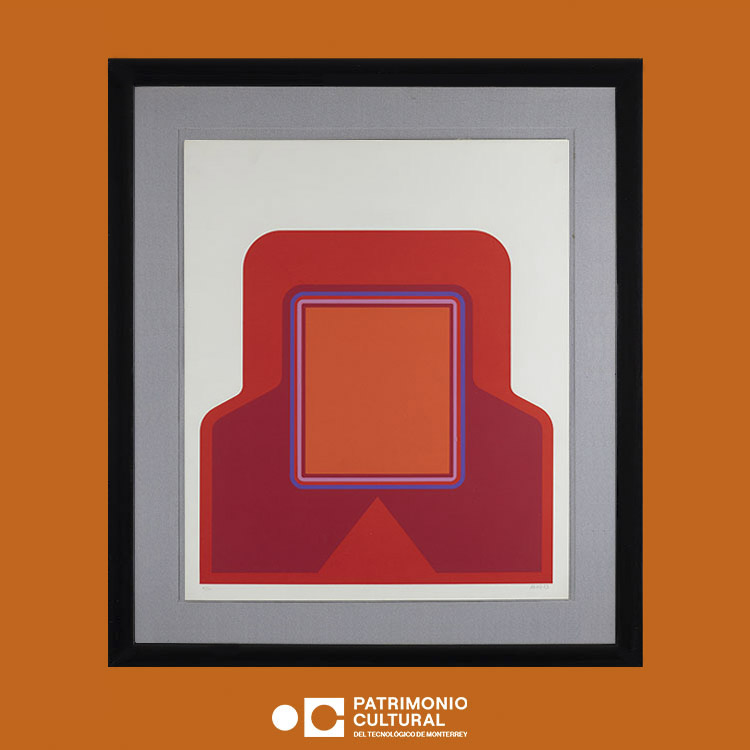
Vicente Rojo (1932-2021), Sin título, 1973. Serigrafía. Campus Estado de México. D.R. ® Vicente Rojo/SOMAAP/México/2023. Patrimonio Cultural del Tecnológico de Monterrey®.
Vicente Rojo Almazán, fue un artista nacido en Barcelona quien emigró a México en 1949, donde estudió pintura, y por más de cincuenta años se desarrolló como diseñador gráfico, pintor y escultor. Es considerado como uno de los fundadores del diseño gráfico en México, donde colaboró y fundó editoriales, suplementos culturales y varias publicaciones. Rojo está asociado al grupo de artistas denominados de ruptura, sin embargo, su aporte más relevante fue en el desarrollo del diseño gráfico en la industria editorial mexicana. Esta pieza es una serigrafía abstracta a cuatro tintas que pertenece a una de las series principales identificada como Señales. En ella explora las formas geométricas básicas de gama cromática cálida, claramente simétrica y balanceada con la forma central delineada por una franja azul.
Febrero, 2022
Guillermo Meza (1917-1997). Óxido de plata, 1989. Óleo sobre tela. Campus Estado de México. Patrimonio Cultural del Tecnológico de Monterrey®.
Guillermo Meza realizó Óxido de plata en 1989, ejemplar de toda su obra, tiene esa peculiar atmósfera como de cosa soñada y a medio explicar. Meza pinta misterios y la figura humana, pero negada. Allí los personajes no tienen rostro, su identidad está obliterada y esa aparente ceguera sugiere para nosotros una posibilidad para ver más allá. Teñido de cierto surrealismo, críticos de arte en México lo han llamado “pintor de lo imposible”. El óxido de plata, se trata de la técnica pictórica que decora o añade un efecto metálico, aquí necesario para la armadura de nuestro personaje. Guillermo Meza es recordado como un hombre muy tímido, renuente a presumir su talento, hosco al exhibir su trabajo. Fue primero descubierto como joven talento por Diego Rivera a principios de los años cuarenta, el reconocido muralista lo mandó a presentarse con la galerista Inés Amor y exponiendo en su negocio fue que Igor Stravinsky, un músico ruso de fama internacional le pidió ilustrara un ballet suyo. Allí también lo encontró Santos Balmori, importante arquitecto mexicano que lo contrató para trabajar en sus proyectos urbanísticos.
Dr. Carlos Molina Posadas, 2016.
Marzo, 2022
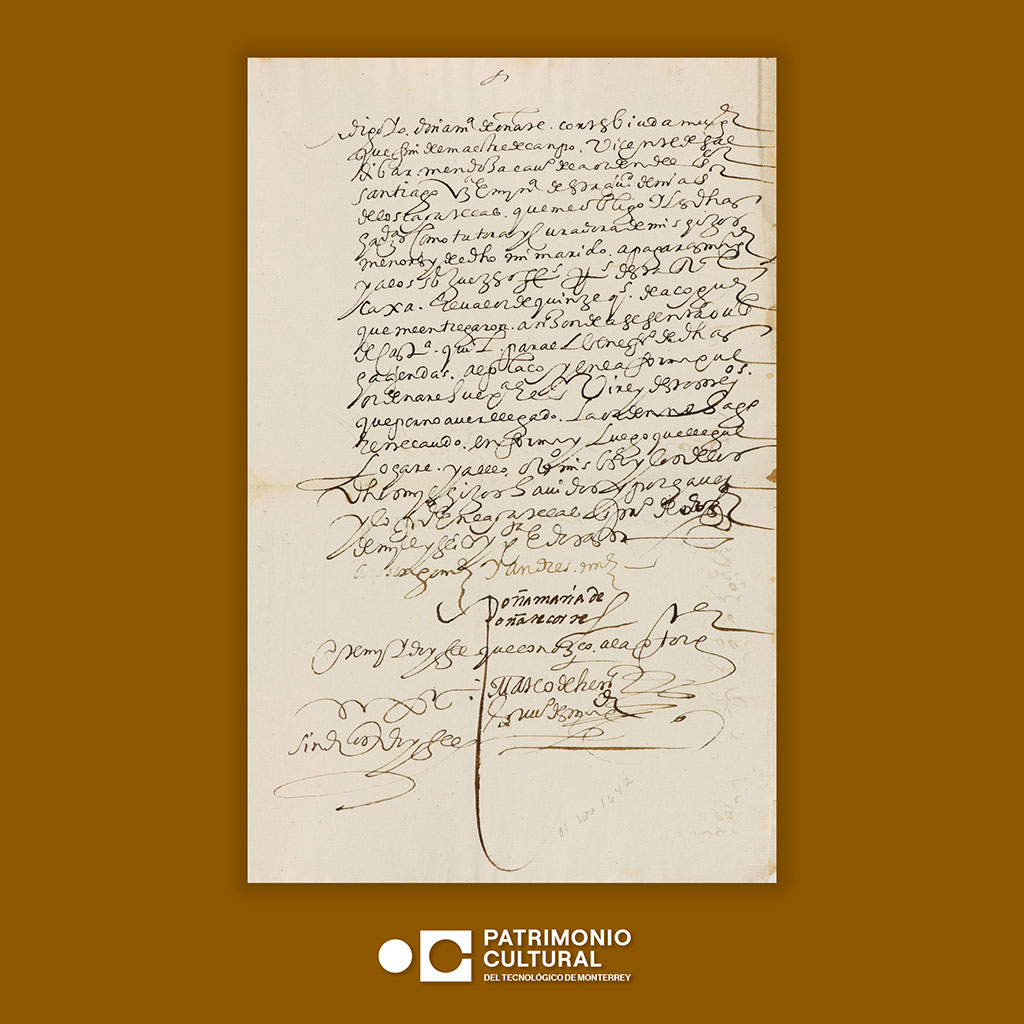
Digo yo doña María de Oñate Cortés viuda mujer que fui del maestre de campo Vicente de Zaldívar caballero de la orden de San Santiago, vecina y minera de esta ciudad de nuestra señora de los Zacatecas, 1642. Fondo Archivo Histórico de la Real Caja de Zacatecas 1576-1936, Colección Sociedad de Amigos de Zacatecas, A.C. en comodato al Tecnológico de Monterrey®. Registro Memoria del Mundo de México, UNESCO, 2021. Patrimonio Cultural del Tecnológico de Monterrey®.
María de Oñate Cortés perteneció a una de las familias más importantes de la ciudad de Zacatecas, era hija de Juan de Oñate El adelantado, conquistador y gobernador de Nuevo México e Isabel Cortés Moctezuma. De ambos lados descendía directamente de los fundadores de la ciudad, por el lado paterno era nieta de Cristóbal de Oñate y por el lado materno de Juanes de Tolosa. Al morir Vicente de Zaldívar Mendoza, su marido, María de Oñate se convirtió en la curadora y tutora de las posesiones que heredarían sus hijos, era conocida en la ciudad y en la Real Caja, como minera. La importancia de este documento radica en la firma de esta mujer minera y zacatecana del siglo XVII.
El documento está disponible para su consulta en el Repositorio Institucional del Tecnológico a través del siguiente enlace: https://hdl.handle.net/11285/639903
Abril, 2022
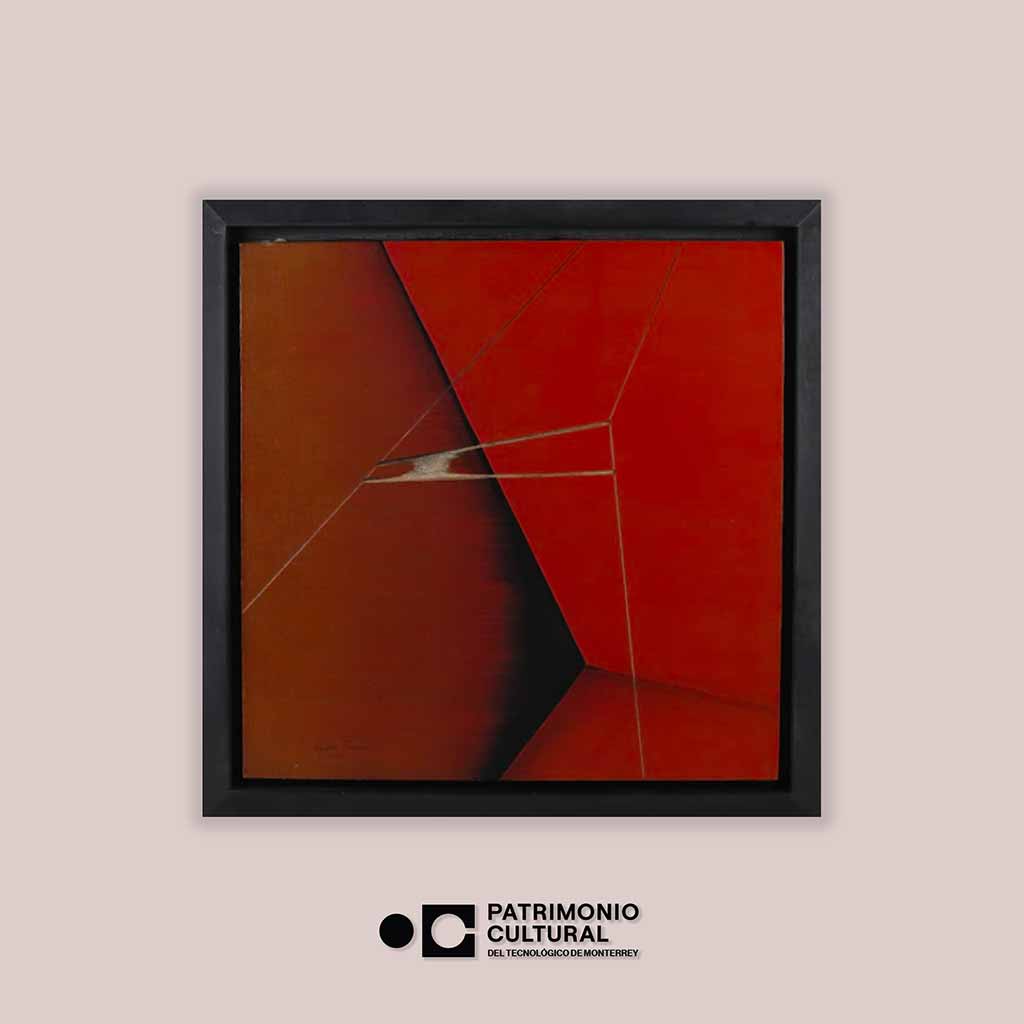
Águeda Lozano (1944). No. 48-85. Pintura acrílica sobre tela. Campus Estado de México. D.R.® Águeda Lozano ADAGP/SOMAAP/México/2023. Patrimonio Cultural del Tecnológico de Monterrey®.
Originaria de Chihuahua, estudió en Monterrey en el Taller de Artes Plásticas de la Universidad Autónoma de Nuevo León entre 1960 y 1964. Se mudó a París en 1971 e inició su interés por la abstracción en el Programa de Residencias Art-Explora-Cité Internationale des Arts. En 2016 instaló una escultura en la Plaza de México en el Distrito XVI de París con ello se convirtió en la primera artista mexicana en exhibir en ese sitio. La principal preocupación de Águeda Lozano es la representación de los espacios geometrizados integrando elementos orgánicos como la curva, la mancha y la textura. En esta obra compuesta por tres paralelepípedos rojos, Águeda construye junto con diagonales en tonos sepias y una forma orgánica que pareciera tensar las principales líneas que atraviesan la imagen, un juego armónico que, asociado con el título de la obra, nos recuerda a las composiciones musicales o quizá de manera velada un rango de tiempo cuyo límite pareciera ser, el año de la creación de la obra.
Esta pieza está disponible para su consulta en Repositorio Institucional del Tecnológico de Monterrey a través del siguiente enlace: https://hdl.handle.net/11285/676151
Mayo, 2022
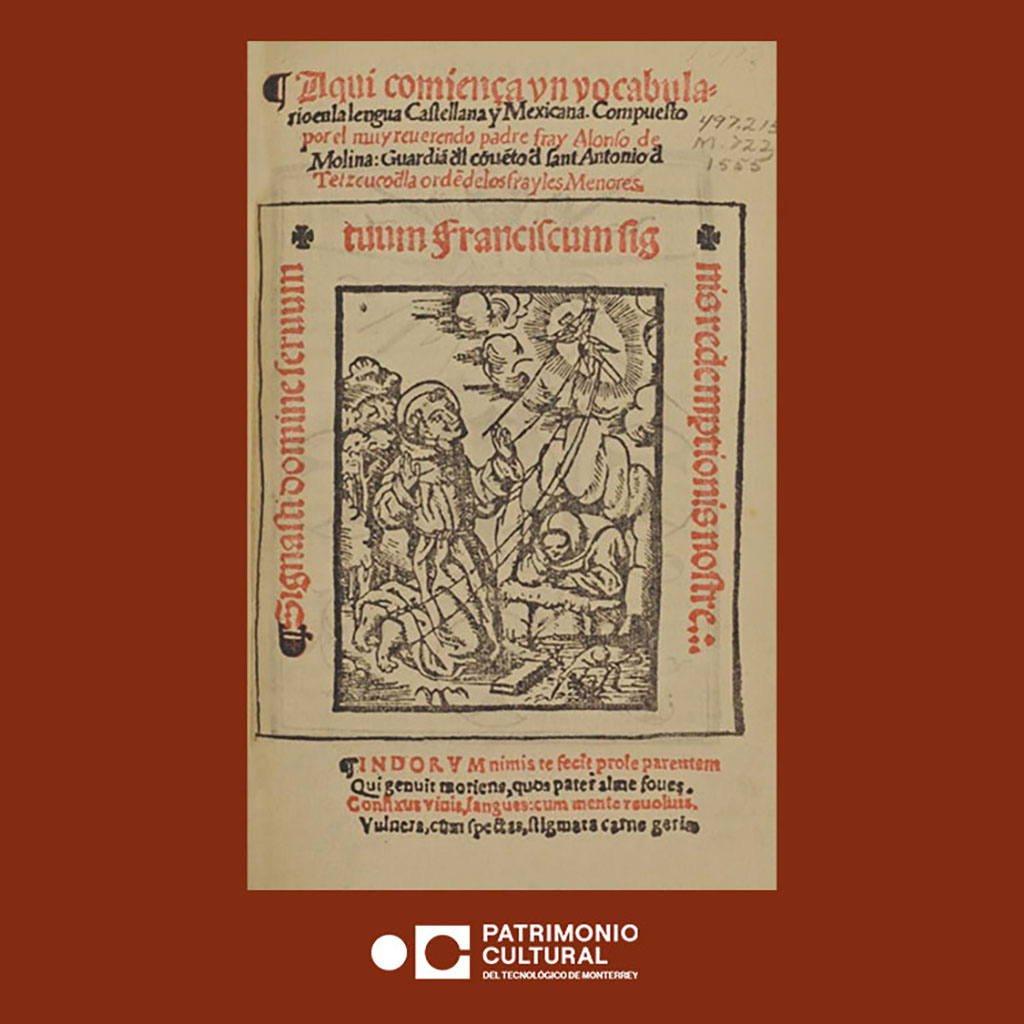
Alonso de Molina (1514-1585), Aqui comiença vn vocabulario en la lengua Castellana y Mexicana, 1555. Fondo GRG Conway. Biblioteca de Colecciones Especiales "Miguel de Cervantes Saavedra". Campus Monterrey. Patrimonio Cultural del Tecnológico de Monterrey®.
Fray Alonso de Molina nació en España hacia 1514, llegó a México cuando era niño y falleció en este lugar en 1585. Fue el primer sacerdote católico ordenado en la Nueva España y el primer maestro de náhuatl no indígena. Como lingüístico franciscano trabajó como intérprete, en la elaboración de gramáticas, vocabularios, doctrinas y en traducciones de obras a la lengua mexicana. Este libro es el primer vocabulario de las lenguas indígenas impreso en América, en casa de Juan Pablos y con licencias del virrey Luis de Velasco y del arzobispo Alonso de Montúfar, quienes fueron los segundos en ocupar dichos cargos, respectivamente. La obra fue revisada por Fray Bernardino de Sahagún. En el texto se incluyen metáforas, diversidad de vocablos de las distintas provincias y explicaciones de conceptos que tenían los indígenas y los desconocían los españoles o viceversa. Además, el texto se completa con avisos para facilitar su consulta, explicaciones sobre números y la manera de contar. Terminó de imprimirse el día 4 de mayo 1555.
Esta obra está disponible para su consulta en el Repositorio Institucional del Tecnológico de Monterrey a través del siguiente enlace: https://hdl.handle.net/11285/639187
Junio, 2022
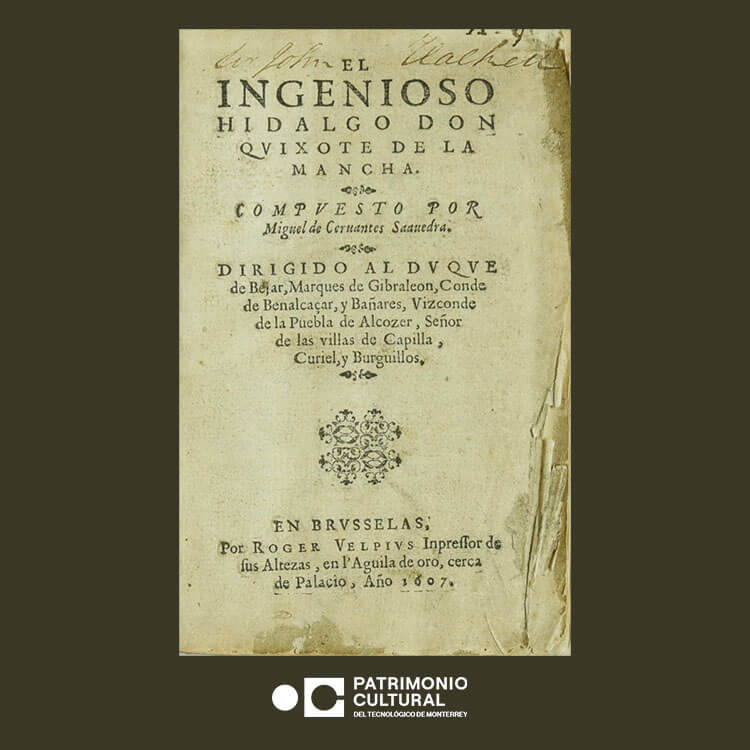
Miguel de Cervantes Saavedra (1547-1616), El Ingenioso Hidalgo Don Qvixote de la Mancha, 1607. Edición de Roger Velpivs. Fondo Carlos Prieto “Colección Cervantina”. Biblioteca de Colecciones Especiales “Miguel de Cervantes Saavedra”. Campus Monterrey. Patrimonio Cultural del Tecnológico de Monterrey®.
Esta obra de Miguel de Cervantes Saavedra fue publicada en Bruselas en 1607 y ha sido tomada como base parcial o total en las traducciones y ediciones posteriores. Este ejemplar es el más antiguo de los Quijotes que se resguarda en la Biblioteca Cervantina del Tecnológico de Monterrey, el cual fue donado a la universidad en 1954 por Carlos Prieto. La llegada de la Colección Cervantina a nuestra institución significó la fundación de la Biblioteca de Colecciones Especiales “Miguel de Cervantes Saavedra”.
Esta edición es de tamaño octavo, conserva su encuadernado original en pergamino y contiene dedicatoria, privilegio, reclamos y signaturas, así como el ExLibris de Pitfirrane. Roger Velpius elaboró con sumo cuidado esta edición pues se basó en la segunda impresión de Juan de la Cuesta y enmendó varias de sus erratas de imprenta e incorrecciones. Consta de 52 capítulos divididos en cuatro partes y comprende, como todas las ediciones anteriores a 1615, solo la primera parte de la novela.
La importancia de Don Quijote como primera novela moderna en español va más allá de una parodia de las novelas de caballería, ya que inaugura el uso de diversas técnicas narrativas como la recapitulación, el uso de digresiones y del metadiscurso, además de la introducción de otros géneros literarios en el texto y la construcción de sus personajes, convirtiéndola en una historia entrañable para toda la humanidad.
Esta obra está disponible para su consulta en el Repositorio Institucional del Tecnológico de Monterrey a través del siguiente enlace: https://repositorio.tec.mx/handle/11285/648309
Julio, 2022
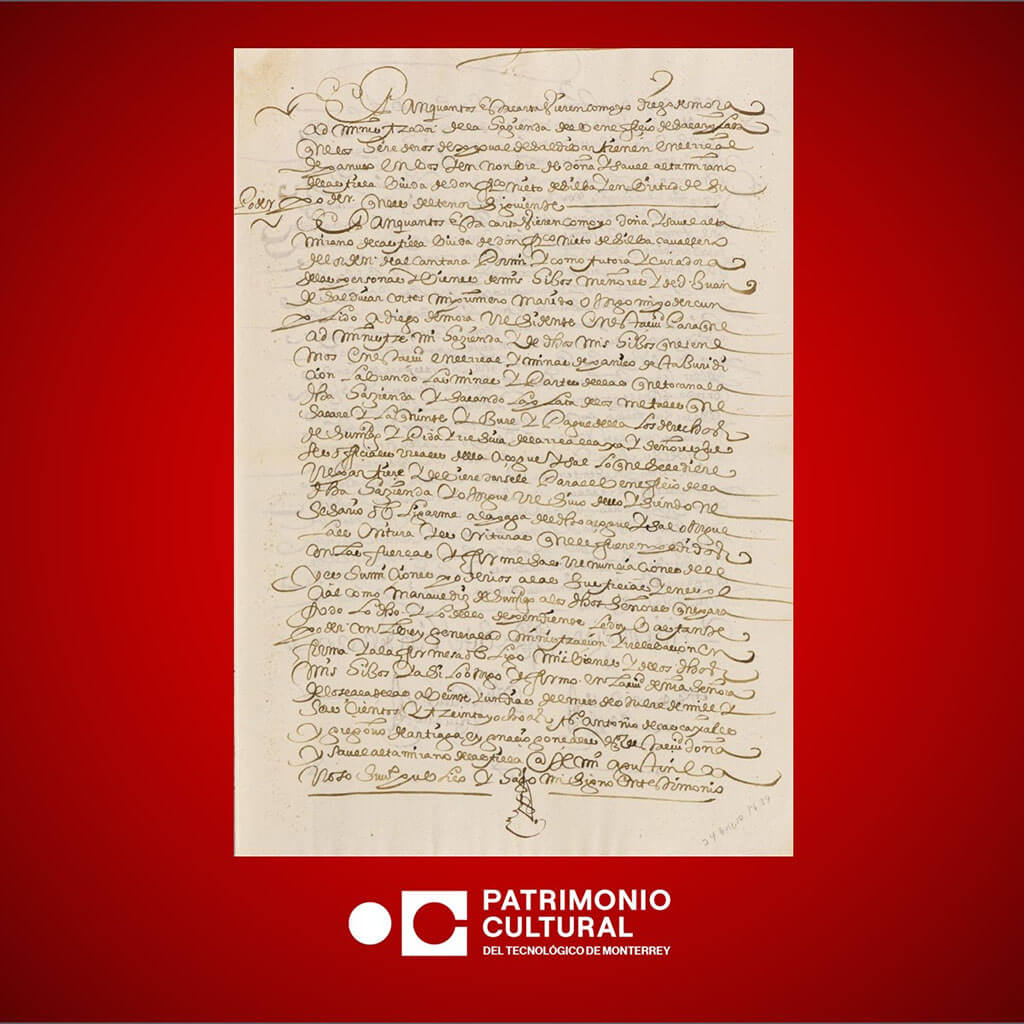
Real Hacienda contra Doña Isabel de Castilla Altamirano por 827 pesos 1 tomín 7 granos del valor de 10 quintales de azogue, 1639. Fondo Archivo Histórico de la Real Caja de Zacatecas, 1576-1936, Colección Sociedad de Amigos de Zacatecas, A.C. en comodato al Tecnológico de Monterrey®. Registro Memoria del Mundo de México, UNESCO, 2021. Patrimonio Cultural del Tecnológico de Monterrey®.
La distribución de azogue o mercurio para limpiar la plata que se extraía de las minas, estaba a cargo de los oficiales reales de la Real Hacienda y Caja de la ciudad de Zacatecas. Ellos en su carácter de funcionarios, recibían el azogue que llegaba de España o Perú y lo repartían a los mineros. Algunos dueños de minas tenían administradores que se hacían cargo de ellas, para ello, les daban un poder para que en su nombre solicitaran y pagaran el azogue que se requería en sus haciendas de beneficio de sacar plata. Como en este caso, el concedido por doña Isabel de Castilla Altamirano viuda de Juan de Zaldívar Cortés otorgó a Diego de Mora. La deuda que se adquiría por el azogue, no recaía en el administrador, sino en la propietaria de la mina, por esa razón la obligación de pago por el azogue, era de doña Isabel de Castilla Altamirano.
Esta obra está disponible para su consulta en el Repositorio Institucional del Tecnológico de Monterrey a través del siguiente enlace: https://hdl.handle.net/11285/639822
Asimismo, le invitamos a consultar este y otros documentos en la exposición "De la A a la Z. La Real Caja de Zacatecas" en: http://tinyurl.com/exposiciones-virtuales
Agosto, 2022

Carlos Mérida Americanismo y abstracción, 1978. Serigrafía. Campus Estado de México. D.R.® Carlos Mérida/SOMAAP/México/2023. Patrimonio Cultural del Tecnológico de Monterrey®.
Carlos Mérida fue un artista guatemalteco que llegó a la escena artística del México posrevolucionario donde exploró las posibilidades de la abstracción geométrica; sus obras interpretan la identidad latinoamericana. Criticó el nacionalismo de las corrientes dominantes del momento y propuso enaltecer los modelos indígenas a través de un purismo geométrico, enfocado en los valores estéticos de la línea, forma y color. En esta obra, la contraposición del ocre y azul del fondo resalta la simplificación de las formas. Mérida nos sitúa en un espacio atemporal y sin referencias espaciales, por su parte, las figuras recuerdan a esculturas prehispánicas. Americanismo y abstracción, se caracteriza por el carácter geometrizante de las formas y trazos que la componen. Dentro de la obra se aprecian dos siluetas que representan al hombre moderno y su contraparte indígena, que proyecta una conexión entre ambas realidades del México moderno.
Septiembre, 2022
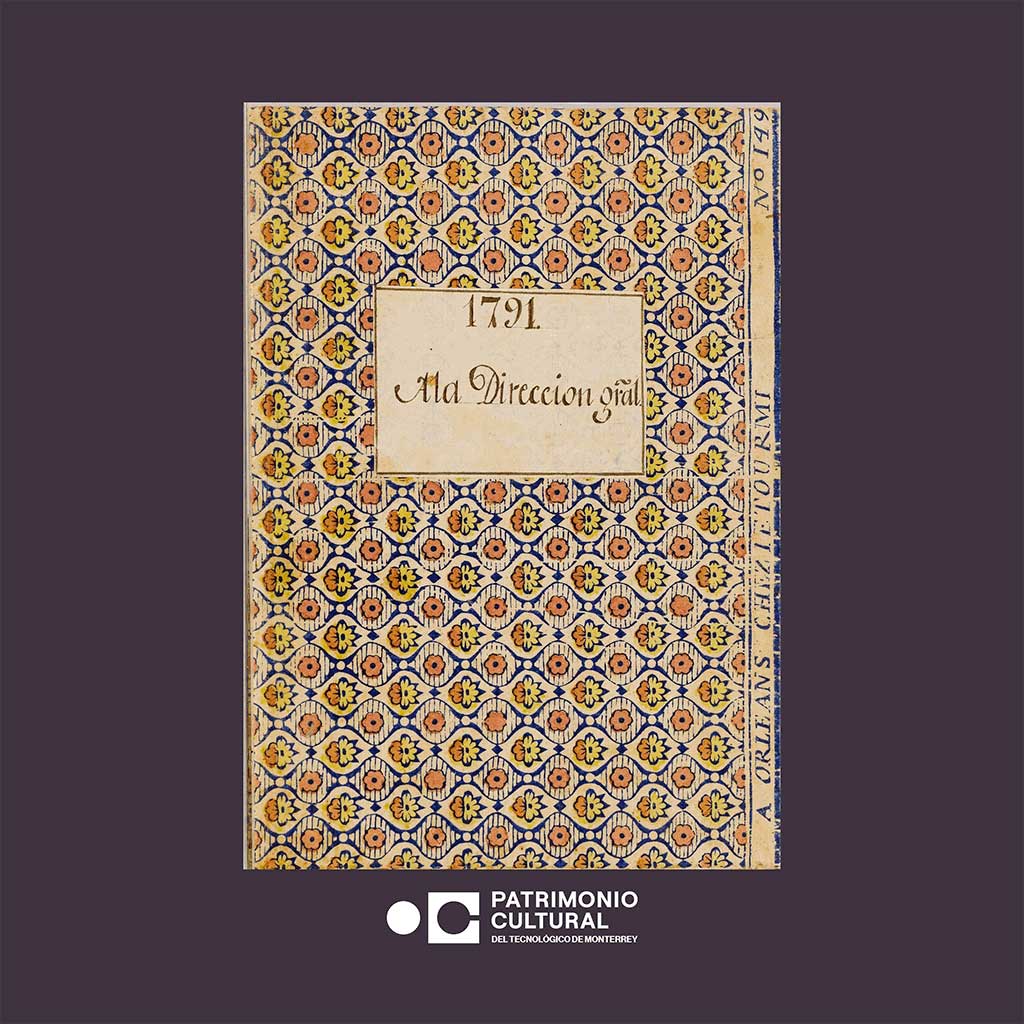
1791. A la Dirección General. Fondo Archivo Histórico de la Real Caja de Zacatecas, 1576-1936, Colección Sociedad de Amigos de Zacatecas, A.C. en comodato al Tecnológico de Monterrey®. Registro Memoria del Mundo de México, UNESCO, 2021. Patrimonio Cultural del Tecnológico de Monterrey®.
El documento 1791. A la Dirección General es un bello ejemplo de encuadernación en papel xilográfico, en el cual, la trama ondulada domina la cubierta y la contracubierta; dentro de una de estas curvaturas se encuentran detalles florales en tonos amarillo, azul y rosa pálido, separadas en su parte más estrecha por pequeños rombos en tono azul. En la otra, flores de seis pétalos en color rosa pálido, rodeadas por líneas paralelas y en el cierre de cada ondulación, un círculo blanco. Este tipo de cuadernos no eran habituales en la Real Caja de la ciudad de Zacatecas, pues los oficiales reales por lo general utilizaban otros más sencillos, es decir, un par de fojas de papel simple, sin sellos, cosidas, a las cuales se les llamaba legajos. No obstante, en este ejemplar se registraron los ingresos y egresos del ramo de alcabalas, un impuesto que se aplicaba a los productos y las mercancías que entraban a la ciudad o pasaban por ella.
Esta obra está disponible para su consulta en el Repositorio Institucional del Tecnológico de Monterrey a través del siguiente enlace: https://hdl.handle.net/11285/683367
Asimismo, le invitamos a consultar este y otros documentos en la exposición "De la A a la Z. La Real Caja de Zacatecas" en: http://tinyurl.com/exposiciones-virtuales
Octubre 2022

Gilberto Aceves Navarro, Autorretratos, 1998. Acrílico sobre Tablaroca. Campus Estado de México. D.R. ® Gilberto Aceves Navarro/SOMAAP/México/2023. Patrimonio Cultural del Tecnológico de Monterrey®.
Gilberto Aceves Navarro es uno de los más importantes representantes de la pintura mexicana, asociado comúnmente a los artistas de la llamada "ruptura". Esta serie de autorretratos es un conjunto de 98 paneles que donó al Tecnológico de Monterrey Campus Estado de México en 1998. La característica de este políptico es la repetición de un autorretrato pintado sobre dos paneles, que posteriormente son separados e intercalados de manera indistinta, conformando una obra múltiple y cuyo dinamismo se expresa por la línea ondulante y gestual del artista.
Esta obra está disponible para su consulta en el Repositorio Institucional del Tecnológico de Monterrey a través del siguiente enlace: https://hdl.handle.net/11285/676114
Noviembre 2022
Juan Carlos Breceda. De la serie: La muerte regresa, s/f, xilografía, Campus Estado de México. Patrimonio Cultural del Tecnológico de Monterrey®.
Esta xilografía es parte De la serie: La muerte regresa de trece piezas impresas en tinta negra. Se aprecian tres calaveras: una lleva un sombrero de ala ancha y aparece tocando un contrabajo, mientras la segunda lo acompaña con una guitarra; una tercera calavera con cabello negro los observa, destaca el patrón de su vestido floreado. Las figuras son alargadas, los cuencos del cráneo conservan los ojos, elemento que el artista utilizó para darle mayor fuerza a la expresión de los personajes. Esta pieza es de Juan Carlos Breceda, pintor sinaloense que recupera el imaginario visual de lo mexicano siguiendo el interés de los artistas por retratar el sincretismo en nuestras tradiciones.
Diciembre, 2022

Mestrovic, Iván. Tarjeta postal con deseos de feliz navidad al Sr. Basave, s/l, s/f, 13.8 x 8.6 cm. Fondo Agustín Basave. Fototeca del Tecnológico de Monterrey. Biblioteca de Colecciones Especiales "Miguel de Cervantes Saavedra". Campus Monterrey. Patrimonio Cultural del Tecnológico de Monterrey®.
El Fondo Agustín Basave reúne testimonios de gran importancia para identificar a las personas más destacadas en distintos ámbitos durante el siglo XX. Coleccionados por el Arq. Agustín Basave del Castillo Negrete, quien fue director del periódico "El Norte" y consejero del Tecnológico de Monterrey, los testimonios abarcan tarjetas de presentación, fotografías autografiadas, cartas, biografías y artículos periodísticos. El objeto destacado de este mes es una tarjeta postal enviada por el escultor yuguslavo Iván Mestrovic, posiblemente de 1949, en la cual le desea una feliz navidad y lo mejor para el año nuevo a Agustín Basave. La imagen de la tarjeta es un bajo relieve con motivo religioso, una de las especialidades de este artista. En el repositorio institucional se pueden encontrar la fotografía personal de Iván Meštrović, su biografía, un artículo periodístico que lo señala como un gran escultor, una carta de su hermano Petar al Arq. Basave, una fotografía de una escultura de su autoría, y esta tarjeta, en la cual aparece su firma autógrafa junto con el mensaje.
Esta obra está disponible para su consulta en el Repositorio Institucional del Tecnológico de Monterrey a través del siguiente enlace: http://hdl.handle.net/11285/623702
Enero, 2023
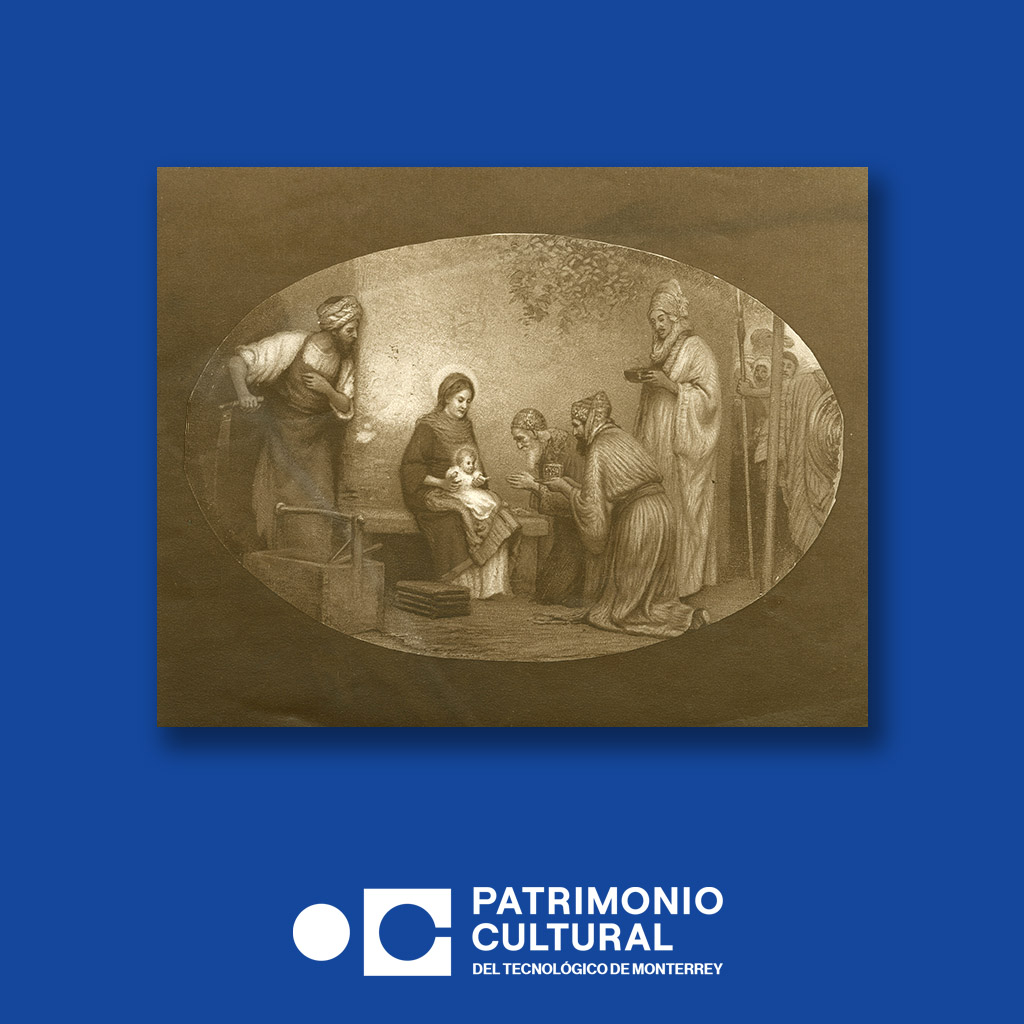
No identificado. Regalos al niño Jesús, Monterrey, N.L., 1940. Impresión a duotono, 14.8 x 11.7 cm. Código 2697. Fondo Alberto Flores Varela. Fototeca del Tecnológico de Monterrey. Biblioteca de Colecciones Especiales "Miguel de Cervantes Saavedra". Patrimonio Cultural del Tecnológico de Monterrey®.
La imagen es una fotografía de una estampa religiosa la cual representa la Epifanía o la Adoración de los Reyes Magos. En ella, se puede observar a Jesús en el regazo de su madre María y a dos de los tres reyes hincados. El que se encuentra en primer lugar es Melchor, a quien se representa generalmente con la barba blanca, entregando el oro. Gaspar se encuentra en segundo lugar, ofreciendo una caja que contiene incienso, de acuerdo con la tradición. Baltasar se encuentra de pie, con una caja que contiene mirra. En el extremo izquierdo recargado en la pared puede observarse a San José con sus atributos de carpintero. Se trata de una tarjeta color sepia duotono y posiblemente sea una reproducción con intenciones de regalo navideño a los clientes del estudio fotográfico.
Esta tarjeta pertenece al Fondo Alberto Flores Varela, quien fue un fotógrafo profesional nacido en 1906. Comenzó como aprendiz en 1919 y, posteriormente, dirigió el estudio fotográfico Foto Selecta. Este fondo resguarda fotografías tomadas entre 1929 y 1996 cuto tema principal revisa la vida litúrgica, las iglesias y algunos personajes del culto católico regiomontano. El archivo fotográfico fue donado al Tecnológico por decisión del propio fotógrafo.
Esta obra está disponible para su consulta en el Repositorio Institucional del Tecnológico de Monterrey a través del siguiente enlace: http://hdl.handle.net/11285/586816
Febrero, 2023
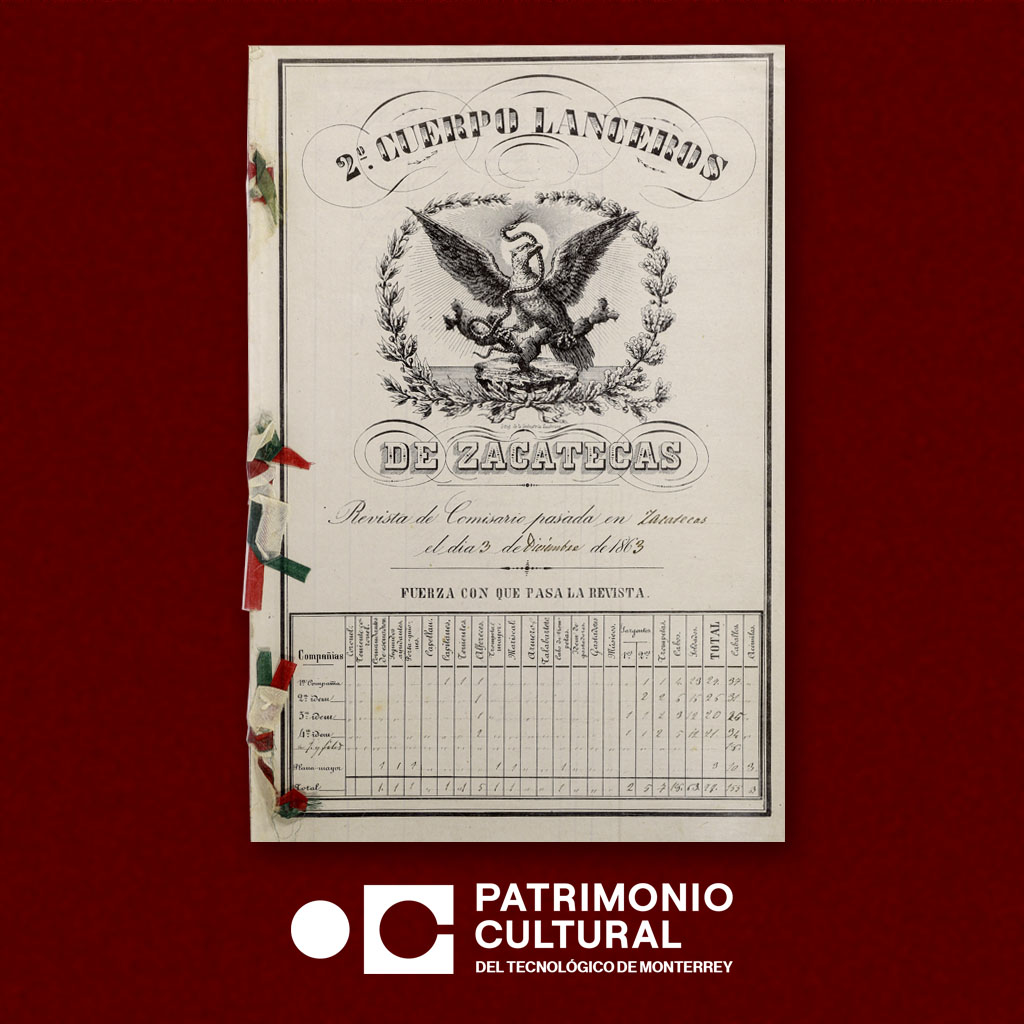
2° Cuerpo de Lanceros de Zacatecas, 1863. Fondo Archivo Histórico de la Real Caja de Zacatecas 1576-1936. Colección Sociedad de Amigos de Zacatecas, A.C. en comodato al Tecnológico de Monterrey®. Registro Memoria del Mundo México, UNESCO, 2021. Patrimonio Cultural del Tecnológico de Monterrey®.
El siglo XIX en México, estuvo marcado por continuos enfrentamientos armados en el territorio nacional entre liberales y conservadores, pero también por las invasiones e intervenciones de países extranjeros como Estados Unidos y Francia. Debido a ello, los estados de la República Mexicana conservaron en sus principales ciudades a la guardia nacional, los regimientos permanentes y posteriormente, estas divisiones estatales quedarían agrupadas en el llamado Ejército de Oriente, creado por Benito Juárez en 1861.
El 2° Cuerpo de Lanceros de Zacatecas fue una unidad de caballería de élite, como su nombre lo menciona, eran soldados que estaban desprovistos de armas de fuego, pero no por ello, dejaban de ser certeros al combatir al enemigo. Estos escuadrones estuvieron vigentes en el ejército mexicano hasta el periodo de Porfirio Díaz.
La relevancia de este documento radica en la belleza del impreso con el águila sobre el nopal devorando a la serpiente, la cual está flanqueada por hojas de laurel y encino. De igual forma, las hojas están unidas con bellos listones de color rojo, blanco y verde, mismos que representan la bandera de México.
Este documento está disponible para su consulta en el Repositorio Institucional del Tecnológico de Monterrey a través del siguiente enlace: https://hdl.handle.net/11285/680879
Marzo, 2023
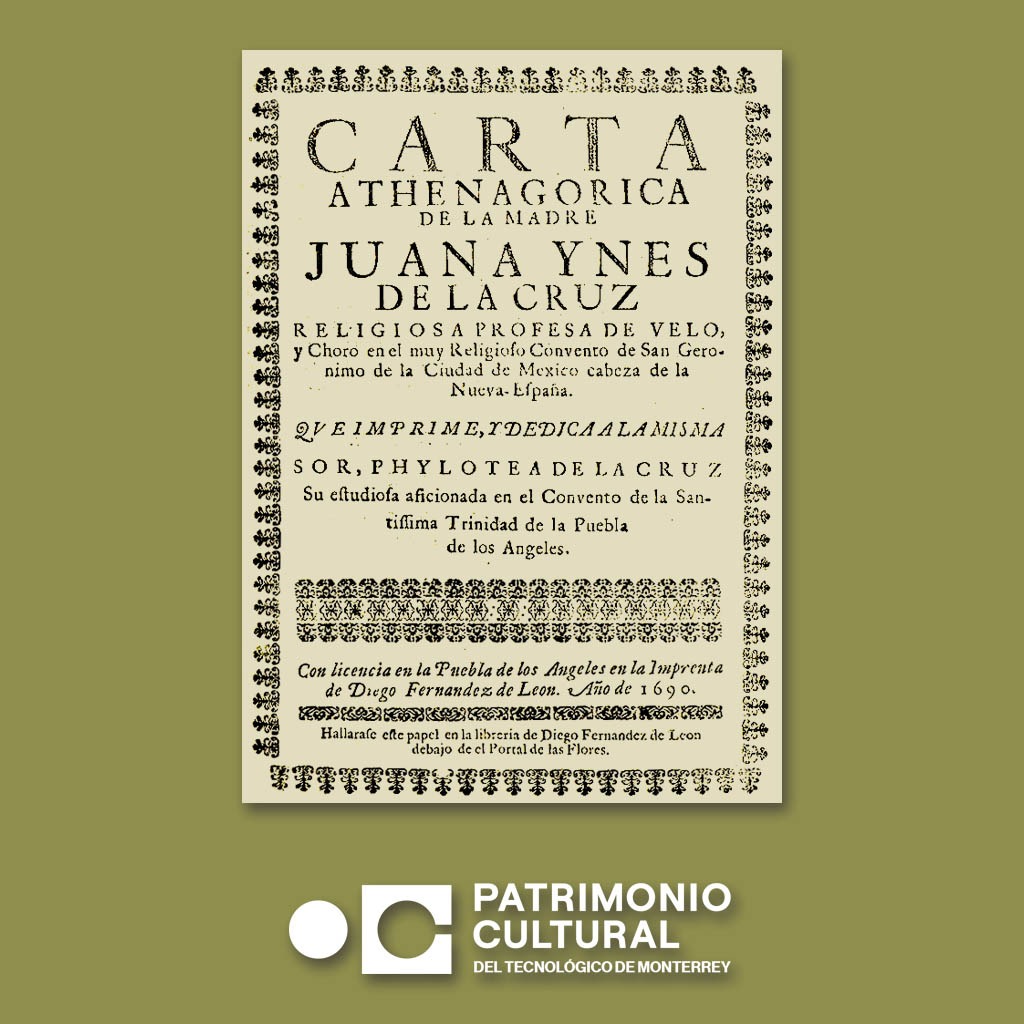
Juana Inés de la Cruz, Sor. Carta Athenagórica de la madre Juana Ynes de la Cruz religiosa profesa de Velo, y Choro en el muy Religioso Convento de San Geronimo de la Ciudad de México cabeza de la Nueva España. Qve imprime y, dedica a la misma Sor, Philotea de la Cruz su estudiosa aficionada en el Convento de la Santissima Trinidad de la Puebla de los Angeles. Imprenta de Diego Fernández de León, 1690. Fondo Salvador Ugarte. Biblioteca de Colecciones Especiales "Miguel de Cervantes Saavedra". Patrimonio Cultural del Tecnológico de Monterrey®.
En el texto titulado Crisis de un sermón, Sor Juana Inés de la Cruz exploró el Sermón del Mandato del jesuita portugués Antonio de Vieira, en el cual el sacerdote planteaba que la mayor fineza de Cristo fue "querer que el amor con que nos amó fuese deuda nuestra para amarnos", contradiciendo a San Agustín, Santo Tomás y San Juan Crisóstomo, los tres doctores de la Iglesia. En su disertación, Sor Juana reivindicó las finezas propuestas por cada filósofo y argumentó en contra de la propuesta de Vieira. Este texto fue publicado el 25 de noviembre de 1690 con el nuevo título de Carta atenagórica, con licencia del obispo de Puebla Manuel Fernández de Santa Cruz, una carta a manera de prólogo, escrita por una supuesta religiosa que firma como Sor Filotea de la Cruz y regaña a Sor Juana por dedicarse a cuestiones teológicas, siendo mujer y monja. Esta publicación generó un gran revuelo en la sociedad novohispana, ya que su aparición parecía una afrenta al arzobispo de México, Francisco de Aguiar y Seijas, cuyo teólogo favorito era, justamente, Antonio de Vieira. Varios meses después, el 1 de marzo de 1691, se publicó la Respuesta de la poetisa a la muy ilustre Sor Filotea de la Cruz, testimonio epistolar en la que Sor Juana defiende su derecho a estudiar y, por extensión, el de todas las mujeres.
Este opúsculo de 35 páginas, mide 19 cm., posee un encuadernado en piel con aplicaciones doradas y el ExLibris de Salvador Ugarte, a cuyo fondo documental pertenece. En el papel se pueden apreciar puntizones y corondeles. Tiene licencia, reclamos, signaturas y colofón, además de anotaciones marginales impresas
Abril, 2023
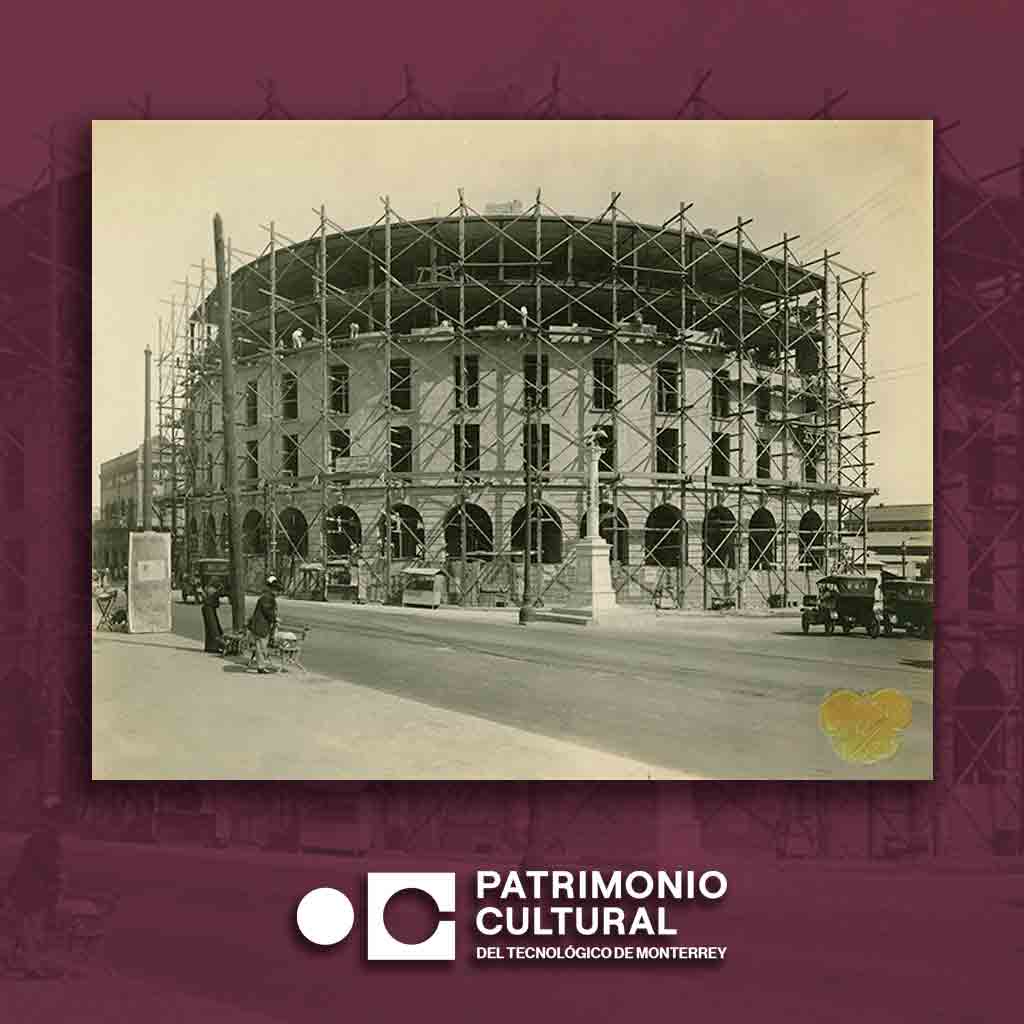
Prieto. Compañía Eléctrica de Tampico, Tampico, Tamaulipas, 1920. Impresión a duotono, 9.5 x 7.5 pulgadas. Fondo Sandoval-Lagrange. Fototeca del Tecnológico de Monterrey. Biblioteca de Colecciones Especiales "Miguel de Cervantes Saavedra". Patrimonio Cultural del Tecnológico de Monterrey®.
Una de las principales construcciones que se localizan en la ciudad de Tampico, Tamaulipas, es el edificio de la antigua compañía de luz, hermosa obra maestra de ingeniería, en ella se utilizaron armazones de hierro fundido importados de Inglaterra y bloques de hormigón color terracota procedentes de India. La edificación se erigió entre 1918 y 1924, etapa de esplendor mexicano que confluye con el auge mercantil y petrolero de la nación. La propiedad perteneció a la compañía de electricidad inglesa llamada Electric Light, Power and Tramways of Tampico, encargada de suministrar energía eléctrica y fuerza motriz para los antiguos transportes colectivos conocidos como tranvías. Entre 1960 y 1970 el edificio fue ocupado por varias oficinas de agencias aduanales, posteriormente pasaría a ser sede de las oficinas del Instituto Mexicano del Seguro Social (IMSS) y desde 1993 hasta la actualidad es ocupado por la Secretaría de Hacienda y Crédito Público (SHCP). Esta impresión a duotono de 1920, es un testimonio fotográfico de la ciudad de Tampico que el 12 de abril de 1823 cumple 200 años de su fundación.
Este documento está disponible para su consulta en el Repositorio Institucional del Tecnológico de Monterrey a través del siguiente enlace: http://hdl.handle.net/11285/587143
Mayo, 2023
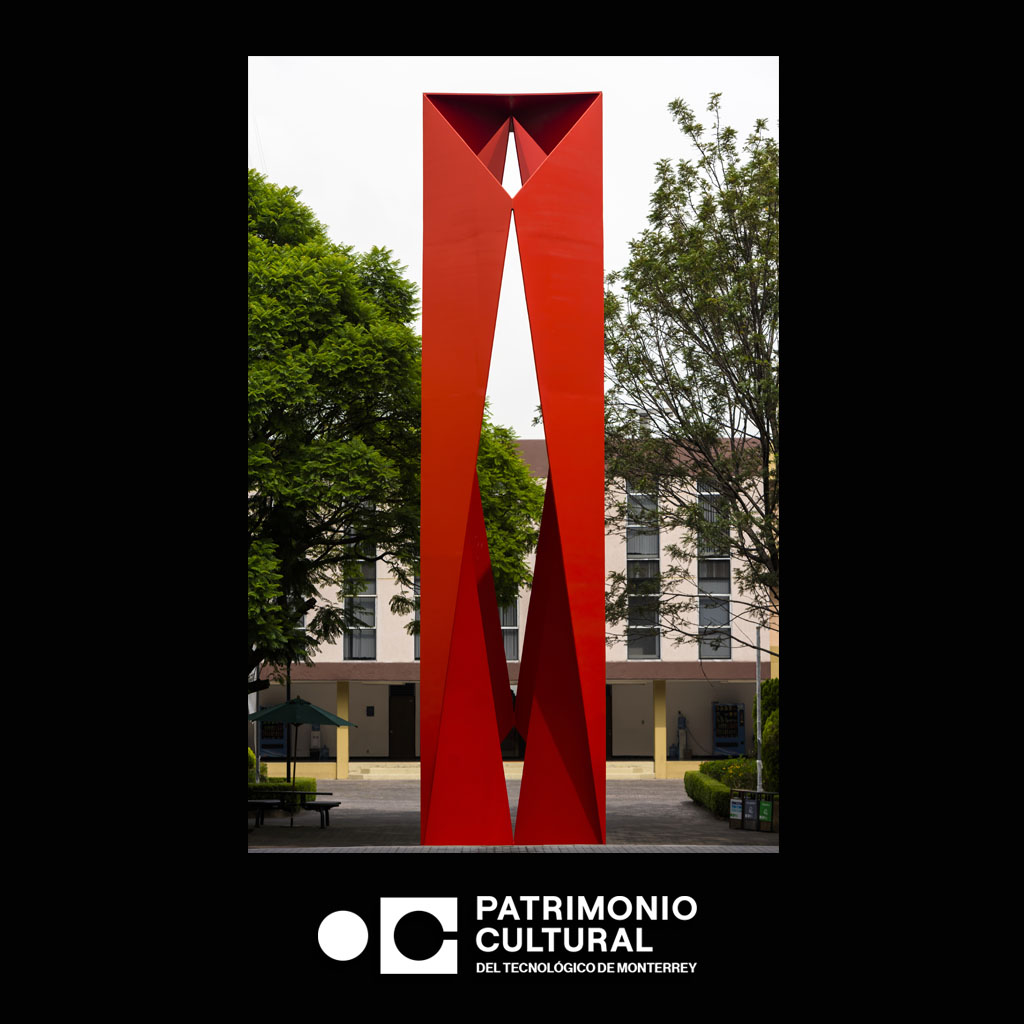
Jesús Mayagoitia, Encuentro de aniversario XX, 1996. Acero pintado, 12 x 4 x 2 m., 12 ton. Foto: Luis Enrique Sandoval. Campus Estado de México. Patrimonio Cultural del Tecnológico de Monterrey®.
La obra representa la conmemoración de dos décadas de existencia del Campus Estado de México. Las formas y líneas se entrecruzan para formar desde una perspectiva las dos equis que representan al número veinte. La "Cosa roja" es el nombre coloquial, la referencia de tránsito cotidiano, con la que los alumnos bautizaron desde hace muchos años esta escultura monumental de Jesús Mayagoitia. Su título es el de la ocasión que le dio motivo hace dos décadas, Encuentro de aniversario XX. Es el nodo de tránsito y comunicación para los que forman parte de la comunidad del campus. Jesús Mayagoitia es reconocido mundialmente y su interés siempre ha sido la calidad en la producción escultórica y la educación estética para todos. Es un escultor mexicano interesado en las diversas configuraciones que cuerpos geométricos toman proyectados sobre un plano, el cómo los percibimos en el espacio y, desde luego, el modo en que nos relacionamos a partir de ello. Ganador del Premio Henry Moore en 1987, Mayagoitia no sólo es un creador, sino un promotor y docente en México desde los años setenta.
Esta obra está disponible para su consulta en el Repositorio Institucional del Tecnológico de Monterrey a través del siguiente enlace: https://hdl.handle.net/11285/675948
Junio, 2023
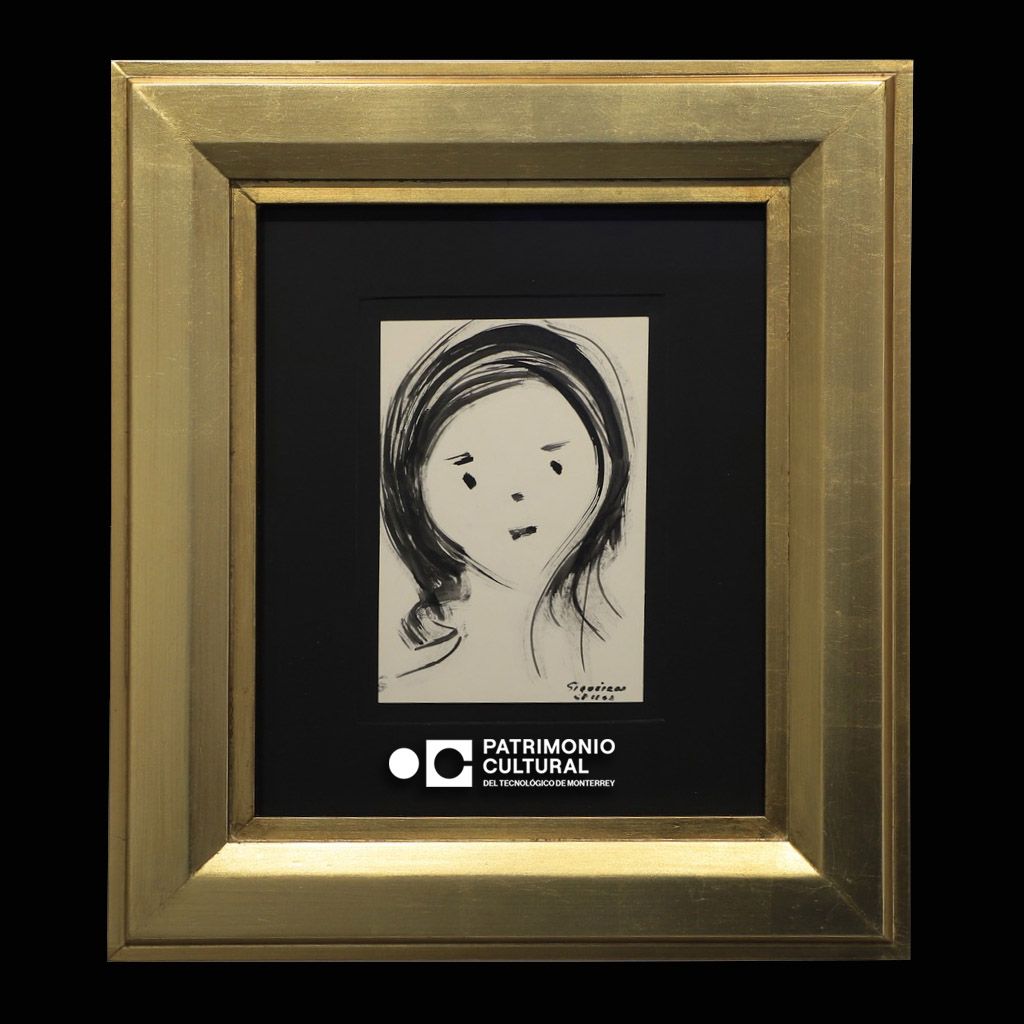
David Alfaro Siqueiros, Boceto de niña, c. 1960. Tinta sobre papel. 24.5 x 16.5 cm. Campus Estado de México. D.R.® David Alfaro Siqueiros/SOMAAP/México/2023. Patrimonio Cultural del Tecnológico de Monterrey®.
David Alfaro Siqueiros (1895-1974), fue miembro de la "Escuela mexicana de pintura", y defendió la democratización del arte encaminado a temas nacionalistas con carga política. Esta pieza corresponde a una etapa tardía de su producción artística en la que experimentó con materiales sencillos como el papel, el gouache y las tintas.
Este dibujo en tinta negra fue realizado con trazo suelto y muestra los rasgos sintéticos del rostro de una niña. Se le considera un ejercicio pictórico o boceto por su sencillez y forma parte de las catorce piezas adquiridas por el Tecnológico de Monterrey, Campus Estado de México en 2002.
Actualmente Boceto de niña está en exhibición en la muestra Siqueiros: Arte y legado en la Galería de Arte del mismo campus del 4 de mayo al 11 de agosto de 2023.
Esta obra está disponible para su consulta en el Repositorio Institucional del Tecnológico de Monterrey a través del siguiente enlace: https://hdl.handle.net/11285/675917
Julio, 2023
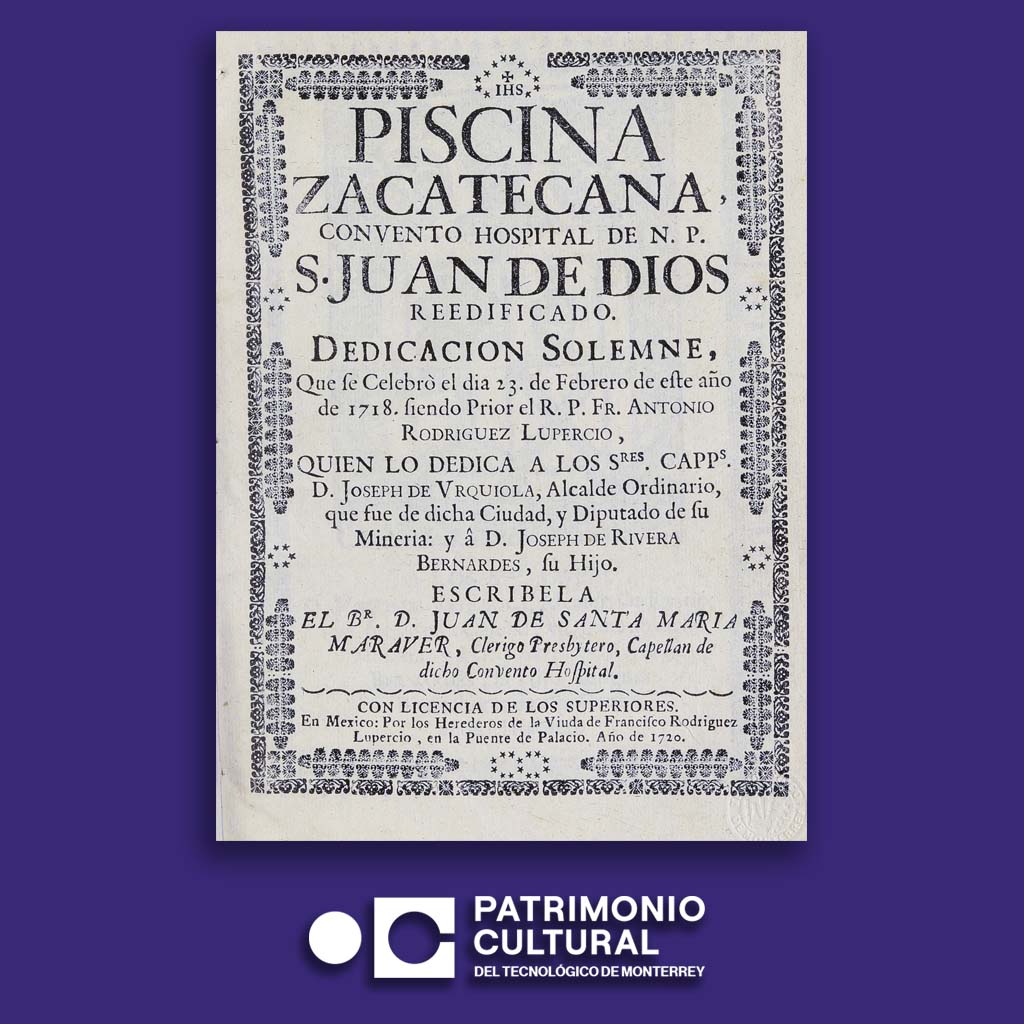
Santa María Maraver, Juan de. Piscina zacatecana, convento hospital de N.P.S. Juan de Dios reedificado, 1720. Fondo Salvador Ugarte. Biblioteca de Colecciones Especiales "Miguel de Cervantes Saavedra". Patrimonio Cultural del Tecnológico de Monterrey®.
Piscina zacatecana es una obra dedicada a la reedificación del convento hospital de San Juan de Dios, cuya celebración se llevó a cabo los días 23, 24 y 25 de febrero de 1718 por Juan de Santa María Maraver. Este impreso fue patrocinado y dedicado al alcalde ordinario José de Urquiola y a su hijo José Rivera de Bernárdez.
Forma parte de los libros más importantes de Zacatecas durante su etapa colonial. En él se describe la ciudad de Zacatecas, se consigna la biografía de fray Ambrosio de Leoz y se relatan los avatares del convento hospital de San Juan de Dios, los festejos, los personajes que participaron, el arco triunfal y el certamen literario que se realizó en honor a la reedificación; así como los resultados de dicho concurso, titulado Palestra ingeniosa, que a la Dedicación del Convento Hospital de N.P. San Juan de Dios Celebraron los ingenios zacatecanos.
Piscina zacatecana es un texto de gran importancia para el estudio de la historia de la ciudad y de las órdenes hospitalarias virreinales.
Esta obra está disponible para su consulta en el Repositorio Institucional del Tecnológico de Monterrey a través del siguiente enlace: https://hdl.handle.net/11285/649831
Agosto, 2023

Mexiac, Adolfo, XX Aniversario VI, 1996. Serigrafía, 28 x 21 cm. D.R.® Adolfo Mexiac/SOMAAP/México/2023. Patrimonio Cultural del Tecnológico de Monterrey®.
Adolfo Mexiac (1927-2019) fue un destacado grabador y pintor michoacano dedicado a expresar en sus obras, los momentos más significativos del México que le tocó vivir. Mexiac se formó en las principales instituciones académicas como la Escuela Nacional de Artes de Morelia, la Academia de San Carlos y en la Escuela Nacional de Pintura, Escultura y Grabado "La Esmeralda".
Mexiac en XX Aniversario VI plasma de forma descendente las letras que dan nombre a esta obra y la remata con las fechas que conmemoran los 20 años del Tecnológico de Monterrey, Campus Estado de México, 1976-1996. Esta obra gráfica es una serigrafía que Mexiac realizó a 6 tintas sobre un papel y que concluye con la firma del mismo autor.
Esta obra está disponible para su consulta en el Repositorio Institucional del Tecnológico de Monterrey a través del siguiente enlace: https://hdl.handle.net/11285/676087
Septiembre, 2023

Título en femenino por el Tecnológico de Monterrey, 1978. Impresión facsimilar sobre papel Fabriano, 22 x 28 cm, cortesía de Elsa Virginia Gutiérrez González.
Antes de 1978, los grados académicos de las mujeres se expedían en masculino. El Tecnológico de Monterrey fue la primera institución en América Latina en hacerlo en femenino. Este hito fue posible gracias a la gestión de la profesora Rosaura Barahona.
Les invitamos a visitar la exposición temporal en conmemoración del 80 aniversario de nuestra institución "Cuando el hilo se hace red. Memoria viva de las mujeres en el Tecnológico de Monterrey" en campus Monterrey (a partir del 31 de agosto), Querétaro (27 de septiembre), Ciudad de México (19 de octubre) y Guadalajara (9 de noviembre).
Octubre, 2023
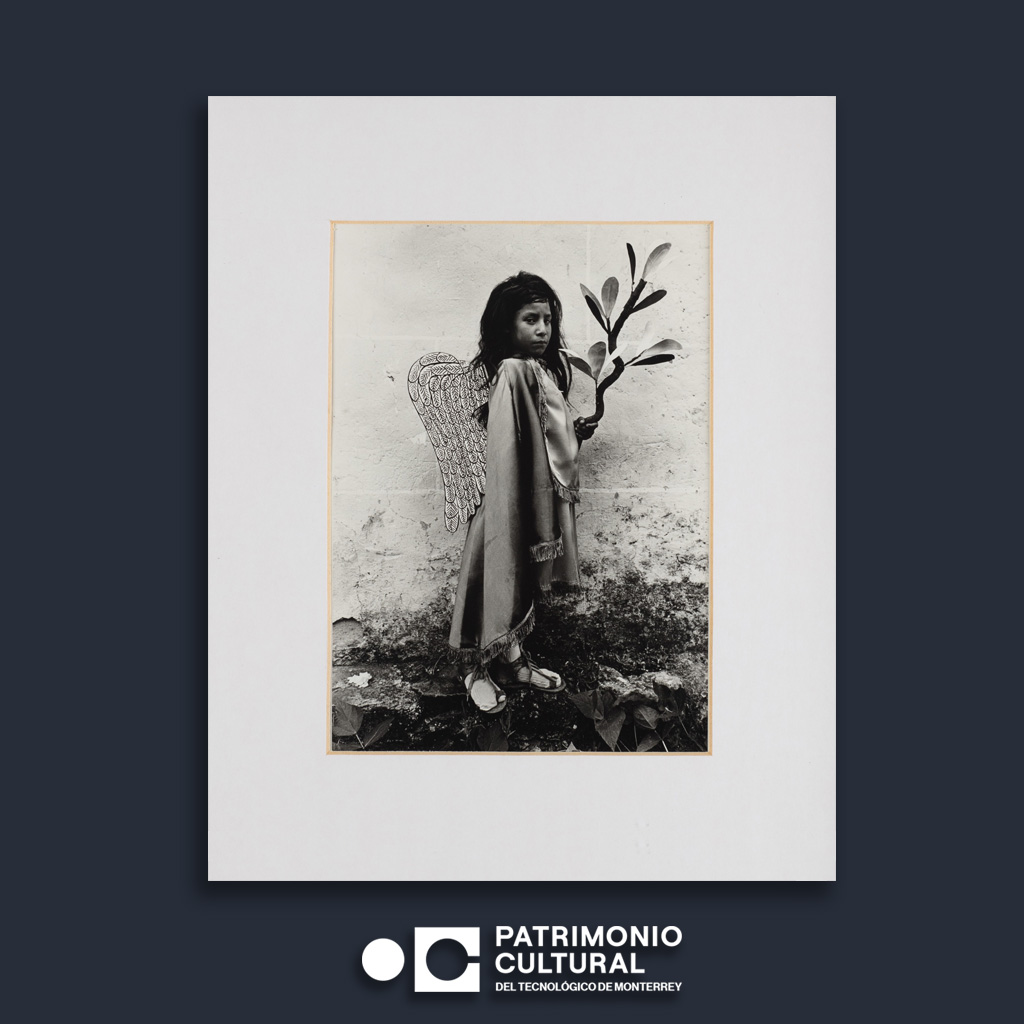
Iturbide, Graciela, Angelito mexicano, 1984. Impresión plata gelatina, 39 x 46 cm. Campus Estado de México. Patrimonio Cultural del Tecnológico de Monterrey®.
Esta imagen fue tomada por la reconocida fotógrafa mexicana Graciela Iturbide (1942) durante una representación de Semana Santa en Chalma, Estado de México. El personaje central lleva un vestuario ritual y una palma del Domingo de Ramos, lo cual, lo convierte en un símbolo de la riqueza cultural y religiosa de México. Graciela Iturbide es reconocida por su sensible abordaje a la vida doméstica, política y religiosa de la mujer en los pueblos indígenas de nuestro país. Su encuadre pone especial atención a las tradiciones locales. La mirada de la persona retratada invita a reflexionar sobre las diversas condiciones que influyen en su vida, incluyendo la condición social, de género, cultural y étnica. Esto nos lleva a considerar la interseccionalidad presente en la cultura mexicana, es decir, cómo diversas identidades y factores se entrelazan y afectan la experiencia de una persona.
Para conocer más sobre el papel de las mujeres en la producción, transmisión y vivencia cultural, les invitamos a visitar la exposición temporal en conmemoración del 80 aniversario de nuestra institución "Cuando el hilo se hace red. Memoria viva de las mujeres en el Tecnológico de Monterrey" en campus Monterrey (inaugurada el 31 de agosto), Querétaro (inaugurada el 27 de septiembre), Ciudad de México (desde el 19 de octubre) y Guadalajara (desde el 9 de noviembre).
Este documento también está disponible para su consulta en el Repositorio Institucional del Tecnológico de Monterrey a través del siguiente enlace: https://hdl.handle.net/11285/676005
Noviembre, 2023

Zamora, Guillermo, Centro Urbano Presidente Miguel Alemán, 1949. Impresión a duotono, 10.2 x 12.7 cm. Fondo Archivo Personal del Arquitecto Mario Pani Darqui, Fototeca del Tecnológico de Monterrey. Biblioteca de Colecciones Especiales "Miguel de Cervantes Saavedra". Campus Monterrey. Registro Memoria del Mundo México, UNESCO, 2016. Patrimonio Cultural del Tecnológico de Monterrey®.
Guillermo Zamora (1915-2002) fue un pionero de la fotografía como registro documental de obras de arte y de arquitectura. Estudió arte en la Academia de San Carlos, cuya formación contribuyó a capturar de manera estética las formas arquitectónicas. Zamora se consolidó como uno de los mejores fotógrafos de cabecera para los arquitectos mexicanos modernos, sobre todo en los proyectos de la Ciudad de México.
La fotografía destaca a un grupo de mujeres y niños en un jardín, frente a uno de los edificios administrativos del Centro Urbano Presidente Miguel Alemán. En el fondo se aprecia el complejo de viviendas multifamiliares que marcó un cambio en la concepción de espacios para las familias modernas en la Ciudad de México. La visión arquitectónica de Mario Pani, influenciada por los principios de Le Corbusier, se centró en la optimización del espacio, brindando funcionalidad y áreas de esparcimiento para sus residentes.
Les invitamos a visitar la exposición temporal en conmemoración del 80 aniversario de nuestra institución "Cuando el hilo se hace red. Memoria viva de las mujeres en el Tecnológico de Monterrey" en Campus Ciudad de México en donde podrán apreciar la reproducción de ésta y otras fotografías de Guillermo Zamora del Fondo Archivo Personal Arquitecto Mario Pani Darqui.
Este documento también está disponible para su consulta en el Repositorio Institucional del Tecnológico de Monterrey a través del siguiente enlace: http://hdl.handle.net/11285/591741
Diciembre, 2023
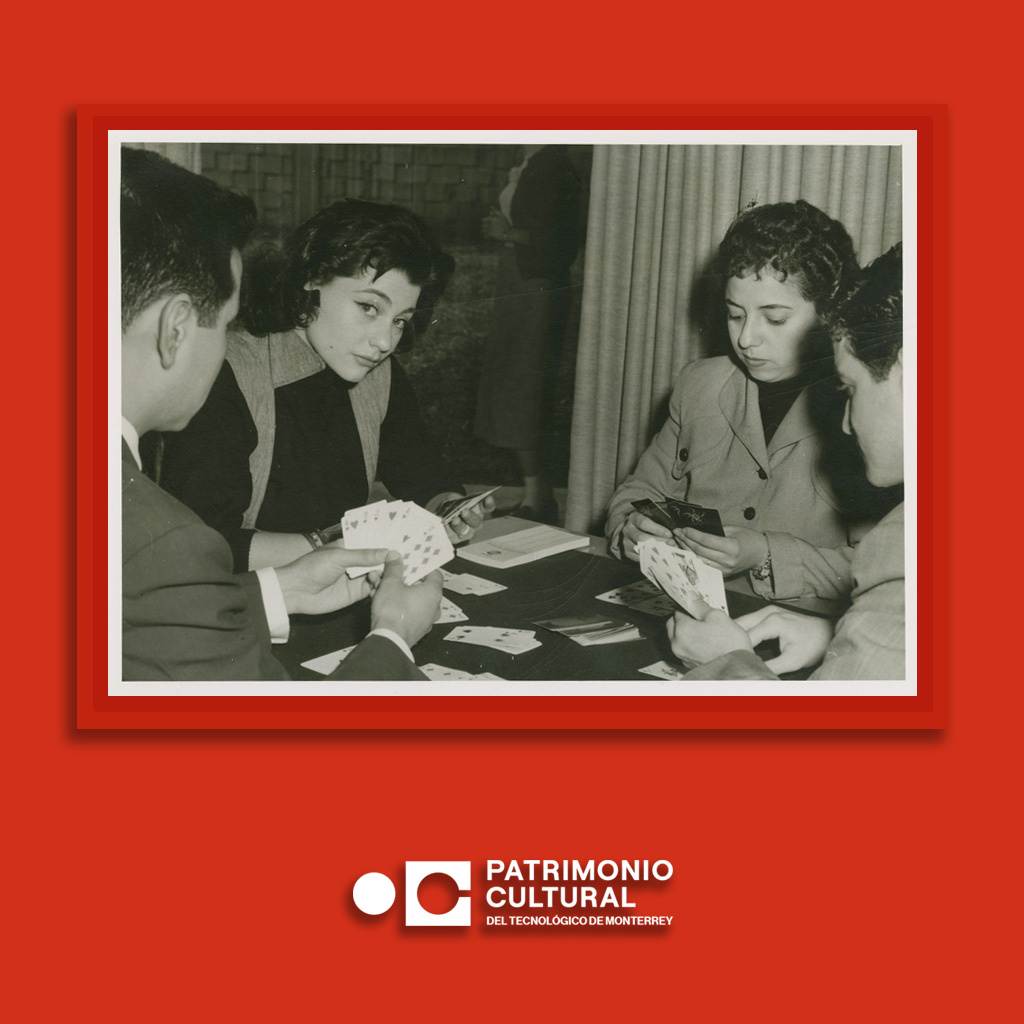
No identificado. Jugando cartas, 1950. Impresión a duotono, 12.7 x 17.8 cm. Código 5030. Fondo Memoria Tec, Fototeca del Tecnológico de Monterrey. Biblioteca de Colecciones Especiales "Miguel de Cervantes Saavedra". Campus Monterrey. Patrimonio Cultural del Tecnológico de Monterrey®.
La fotografía es una ventana hacia la complejidad humana y social que preserva momentos y narrativas que podemos volver a interpretar e invitar a reflexionar desde nuestro contexto actual.
Jugando cartas es una instantánea que captura un momento único en el tiempo, revelando la dinámica social de un grupo de jóvenes inmersos en el juego de cartas. Este documento visual no sólo documenta la actividad lúdica, sino que también proporciona una ventana a las interacciones y emociones presentes en ese instante. La atención concentrada de tres jugadores contrasta con la expresión receptiva y sutilmente retadora de la chica a la izquierda, quien, al dirigir su mirada hacia la cámara, añade una capa adicional de significado, sugiriendo una conexión directa entre el observador y los sujetos fotografiados. En este contexto, esta fotografía emerge como un valioso testimonio cultural, donde una mirada directa, proporciona la posibilidad de una mujer que quizá resiste desde lo individual ante la norma o los mandatos de género.
Les invitamos a visitar la exposición temporal en conmemoración del 80 aniversario "Cuando el hilo se hace red. Memoria viva de las mujeres en el Tecnológico de Monterrey" donde se propone visibilizar el papel de las mujeres en la institución y los retos que han enfrentado desde distintos ángulos. La muestra está dividida en cuatro campus: Monterrey, Urdir la trama; Querétaro, Recaudo de palabras; Ciudad de México, Tejer la modernidad y Guadalajara, Resistir en los retazos. Las cuatro sedes tendrán una duración de dos semestres a partir de su inauguración.
Este documento también está disponible para su consulta en el Repositorio Institucional del Tecnológico de Monterrey a través del siguiente enlace: http://hdl.handle.net/11285/584384
Enero, 2024
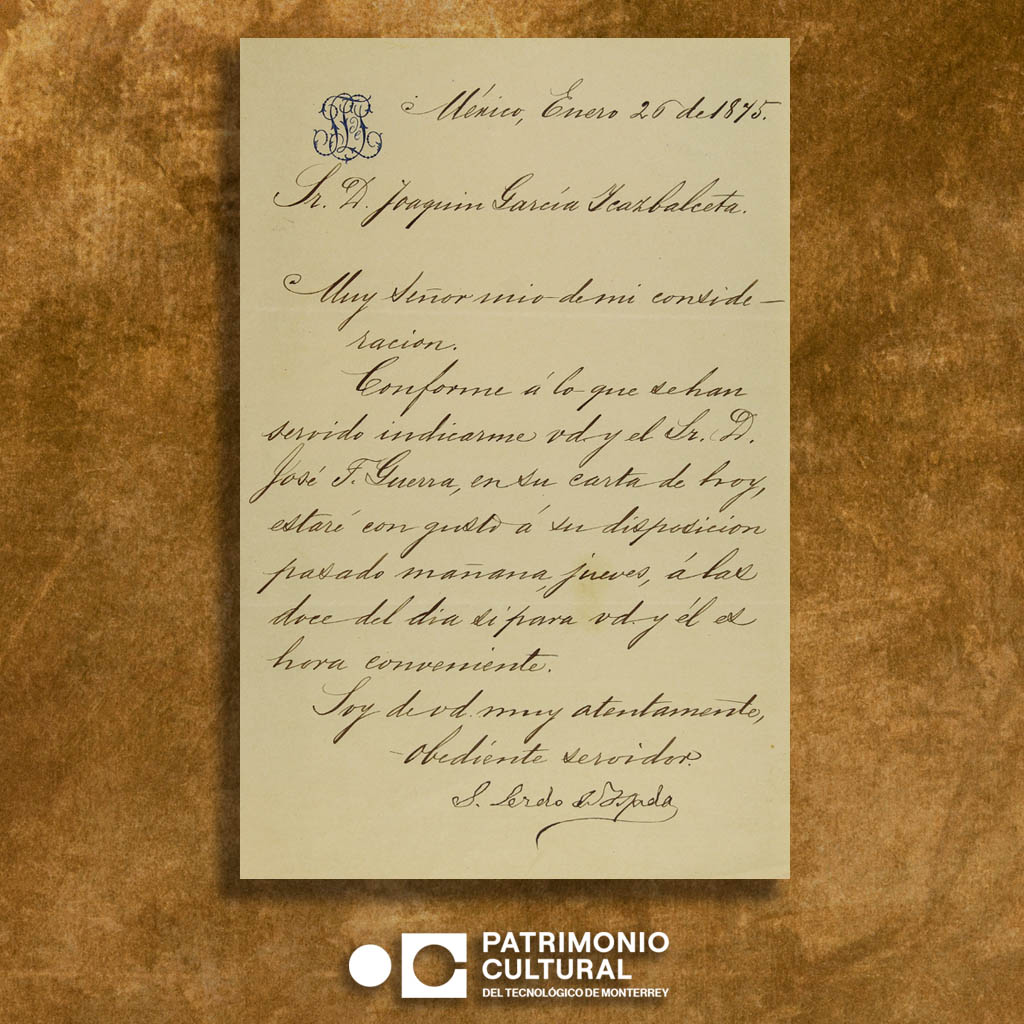
Carta de Sebastián Lerdo de Tejada a Joaquín García Icazbalceta, 1875. Fondo Archivo Histórico de la Real Caja de Zacatecas 1576-1936. Colección Sociedad Amigos de Zacatecas, A.C. en comodato al Tecnológico de Monterrey®. Registro Memoria del Mundo México, UNESCO, 2021. Patrimonio Cultural del Tecnológico de Monterrey®.
En esta carta destacan dos personalidades del último cuarto del siglo XIX, Sebastián Lerdo de Tejada y Joaquín García Icazbalceta. El primero por asumir la presidencia de México tras la muerte de Benito Juárez y el segundo, por ser secretario y posteriormente director de la Academia Mexicana de la Lengua.
La belleza de este documento radica en las siglas o acrónimo de la hoja membretada con detalles florales estilo Art Nouveau en color azul, en la que da respuesta Sebastián Lerdo de Tejada a Joaquín García Icazbalceta, así como la rúbrica del presidente de México.
Esta obra está disponible para su consulta en el Repositorio Institucional del Tecnológico de Monterrey a través del siguiente enlace:
Febrero, 2024
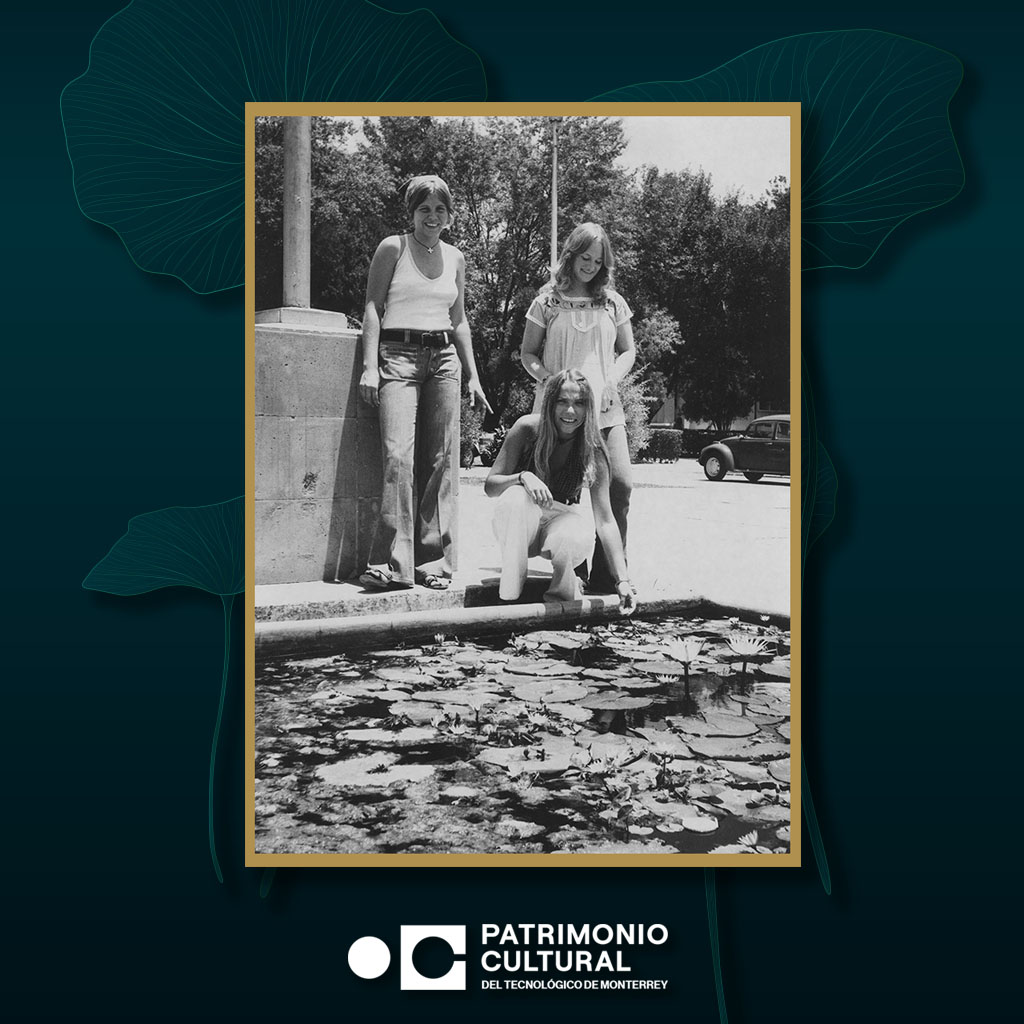
Alumnas de la Escuela de Verano, 1972. Impresión a duotono 5 x 7 pulgadas. Campus Monterrey. Fondo Memoria Tec. Fototeca del Tecnológico de Monterrey. Biblioteca de Colecciones Especiales "Miguel de Cervantes Saavedra". Patrimonio Cultural del Tecnológico de Monterrey®.
Esta fotografía en blanco y negro retrata a tres alumnas durante los años setenta. El retrato muestra la convivencia, recreación y estilo de vestir de quienes participaban durante su estancia en la Escuela de Verano en Campus Monterrey.
El fondo Memoria Tec resguarda imágenes históricas que permiten tener una ventana al pasado para comprender cómo era la vivencia de los alumnos y las alumnas en la institución durante esa época.
Este documento está disponible para su consulta en el Repositorio Institucional del Tecnológico de Monterrey a través del siguiente enlace: http://hdl.handle.net/11285/584573
Marzo, 2024
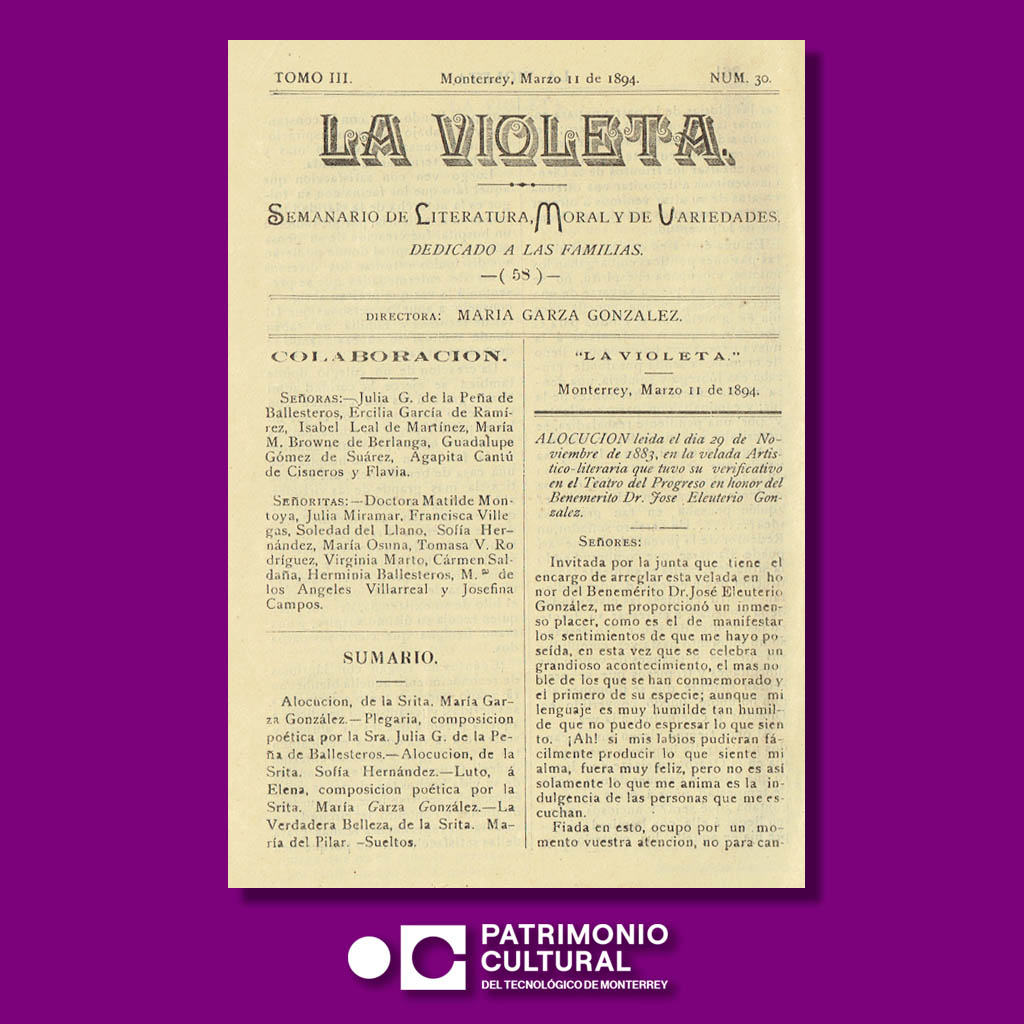
La Violeta. Quincenal de Literatura, Social, Moral y de Variedades. Monterrey, 1887-1894. Colección donada por Martha Nualart Sánchez, bisnieta de Josefa Cornada Eligia Jiménez García (1865-1911), colaboradora de "La Violeta. Quincenal de literatura, social, moral y de variedades". Fondo Intercambio y donaciones. Biblioteca de Colecciones Especiales "Miguel de Cervantes Saavedra". Patrimonio Cultural del Tecnológico de Monterrey®.
Esta revista decimonónica es una de las primeras en ser gestionada, escrita y publicada por mujeres regiomontanas. Hasta ahora, solo se han localizado otras tres revistas mexicanas con estas mismas características.
Este ejemplar de La Violeta se compone de un encuadernado que conserva tres tomos de dicha publicación. En total, contiene cincuenta y nueve ediciones en papel y tinta de periódico.
Esta publicación permitió que las mujeres porfirianas del norte de México divulgaran sus escritos literarios en diversos géneros, expresaran sus ideas sobre la gestión cultural, entre otros temas, lo cual generó que se entretejieran redes femeninas de lectoras con contenido creado y pensado para mujeres.
Este documento también está disponible para su consulta en el Repositorio Institucional del Tecnológico de Monterrey a través del siguiente enlace: https://hdl.handle.net/11285/650987
Abril, 2024
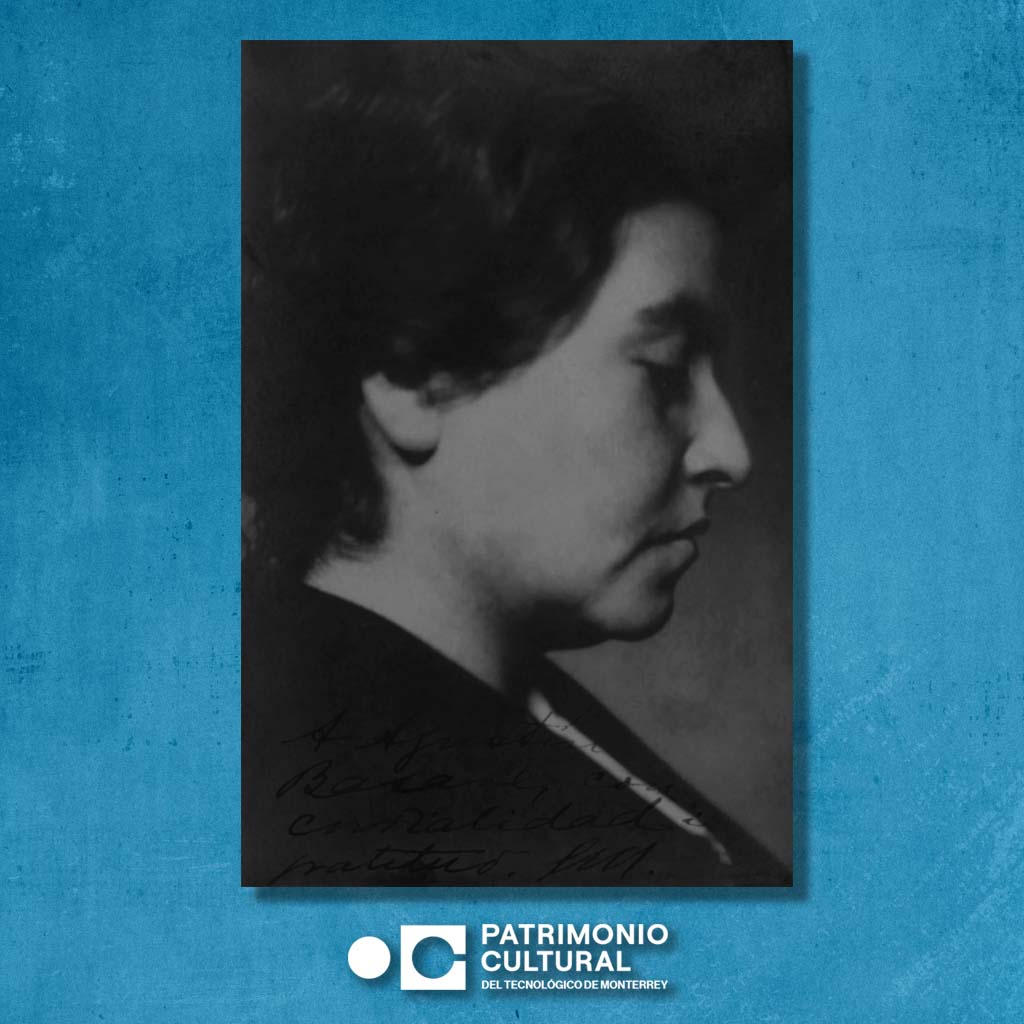
Foto autografiada de Gabriela Mistral (1889-1957), Campus Monterrey. Fondo Agustín Basave. Fototeca del Tecnológico de Monterrey. Biblioteca de Colecciones Especiales "Miguel de Cervantes Saavedra". Patrimonio Cultural del Tecnológico de Monterrey®.
El retrato de perfil de la poeta Gabriela Mistra, ganadora del Premio Nobel de Literatura en 1945, es un testimonio significativo de su importancia a nivel mundial, como primera mujer poeta latinoamericana en obtener dicho galardón.
La fotografía fue firmada y dedicada al director del periódico El Norte, quien conformó el fondo documental que lleva su nombre y que incluye autógrafos, fotografías y semblanzas de destacados protagonistas de la historia mundial del siglo XX. Agustín Basave donó este fondo al Tecnológico de Monterrey en 1955.
Lucila de María Godoy Alcayaga, nombre real de Gabriela Mistral, nació en Chile el 7 de abril de 1889. Además de ser diplomática, ejerció el magisterios, colaboró con el Gobierno de México en la formación de maestros y en el diseño de lo que se convirtió en la Secretaria de Educación Pública. Su obra poética influyó en grandes escritoras como Rosario Castellanos y escritores como Pablo Neruda y Octavio Paz.
Este documento está disponible para su consulta en el Repositorio Institucional del Tecnológico de Monterrey a través del siguiente enlace: http://hdl.handle.net/11285/625062
Mayo, 2024
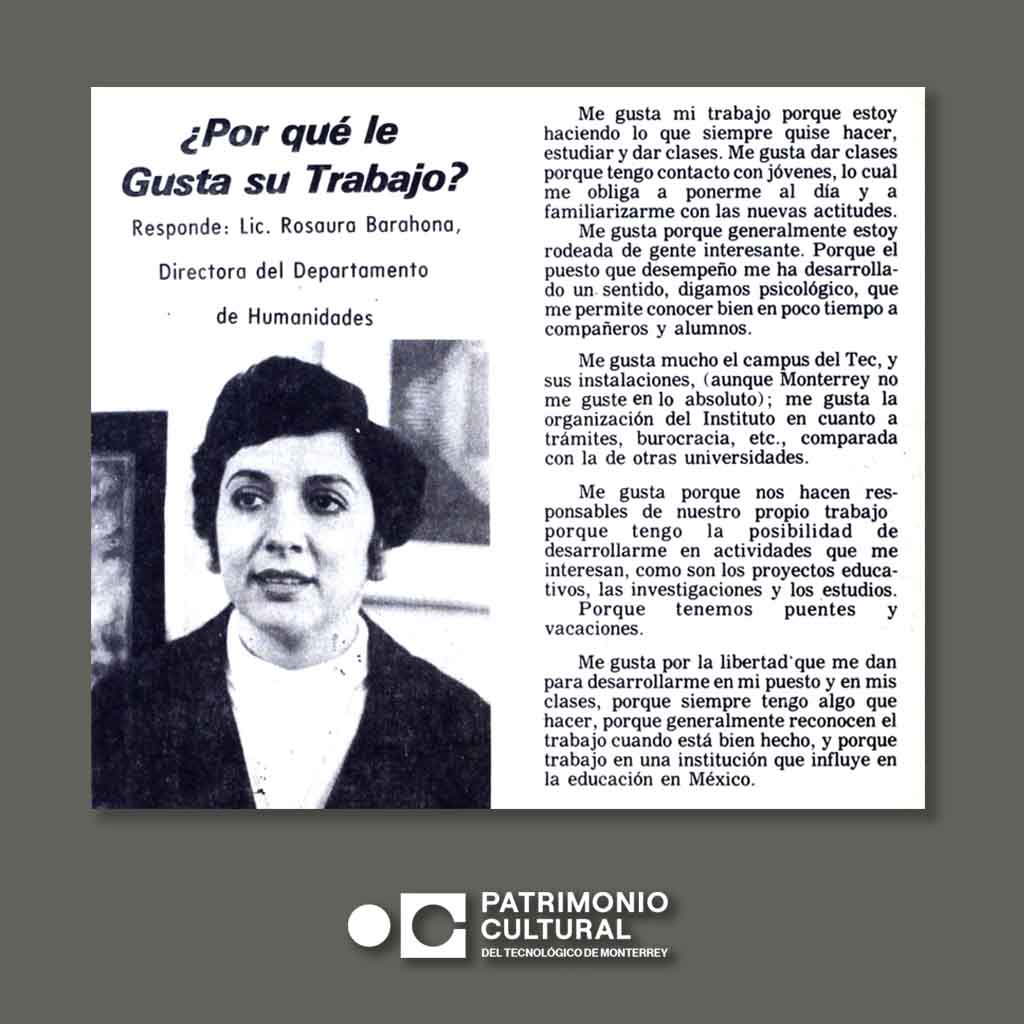
¿Por qué le gusta su trabajo?" Entrevista a Rosaura Barahona publicada en Panorama, 1977. Monterrey. Fondo Memoria Tec. Biblioteca de Colecciones Especiales "Miguel de Cervantes Saavedra". Patrimonio Cultural del Tecnológico de Monterrey®.
Panorama (1966-2017) fue el semanario de comunicación oficial del Campus Monterrey donde se informaban las noticias importantes para toda la comunidad.
Entrevista realizada a Rosaura Barahona Aguayo (1942-2017), donde habla del gusto por su trabajo como profesora y directora del Departamento de Humanidades del Tec de Monterrey.
Barahona fue una importante promotora de la equidad de género en la institución, donde destacó su impulso para que el Tec fuera la primera institución en Latinoamérica en expedir grados académicos en femenino.
Junio, 2024
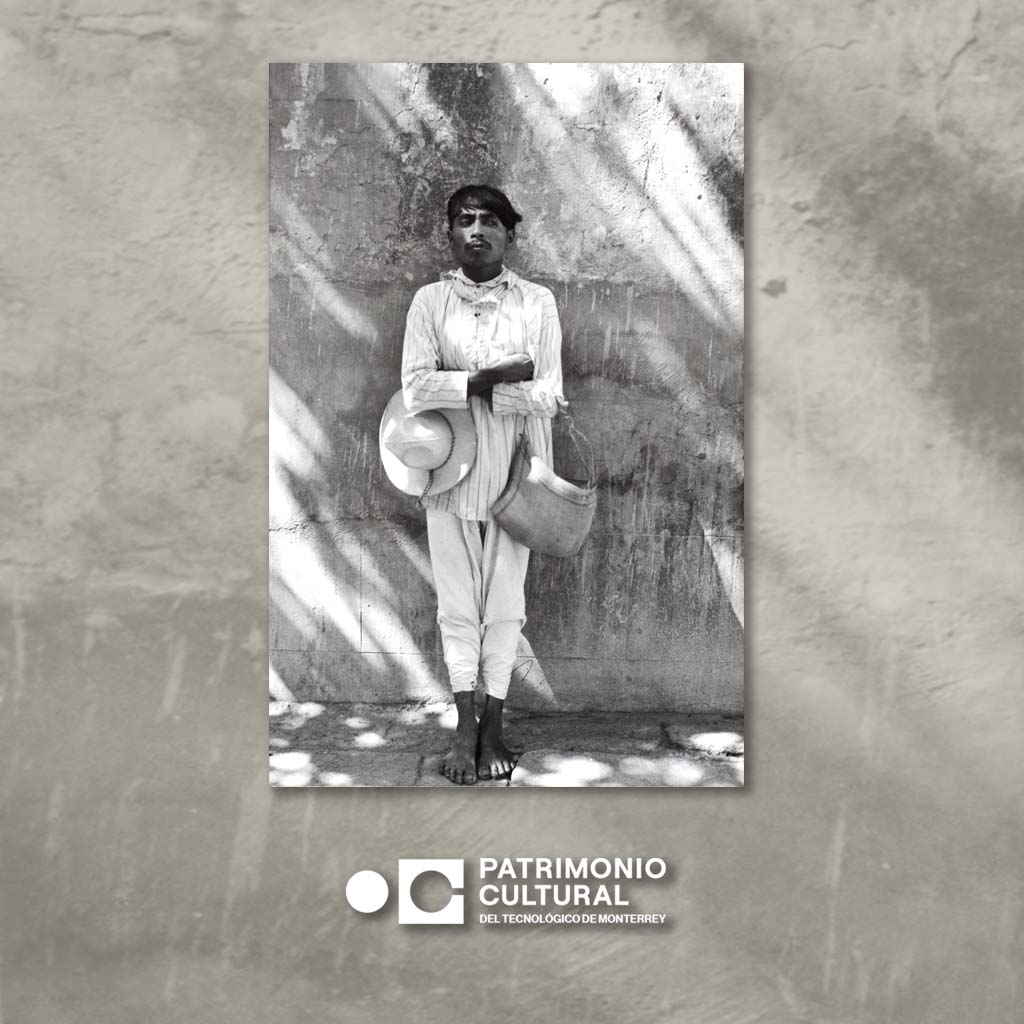
Manuel Álvarez Bravo (1902-2002. Señor de Papantla, 1977. Impresión plata sobre gelatina 39 x 46,2 cm. Campus Estado de México. Patrimonio Cultural del Tecnológico de Monterrey®.
Manuel Álvarez Bravo es uno de los fotógrafos más importantes de México y un pionero en la fotografía moderna en América Latina. Su carrera abarcó gran parte del siglo XX, y su obra es conocida por capturar la esencia de la vida mexicana a través de sus imágenes poéticas y simbólicas.
La imagen muestra en primer plano a un hombre con vestimenta rural posando frente a un muro rústico. La composición central se rompe con las diagonales de las luces y sombras, que hacen destacar los detalles del entorno y del personaje. El título hace referencia a Papantla, una ciudad en el estado de Veracruz, famosa por sus tradiciones culturales, cómo los Voladores de Papantla, danza ritual propia de este pueblo originario.
La obra de este fotógrafo ha sido fundamental para la comprensión y apreciación de la imagen en México por su capacidad para combinar la técnica fotográfica con una profunda sensibilidad hacia su entorno cultural. Fotografías como esta no solo son representaciones visuales, son también testimonio de las raíces culturales y la identidad del pueblo mexicano.
Esta obra está disponible para su consulta en el Repositorio Institucional del Tecnológico de Monterrey a través del siguiente enlace: https://hdl.handle.net/11285/676002
Julio, 2024
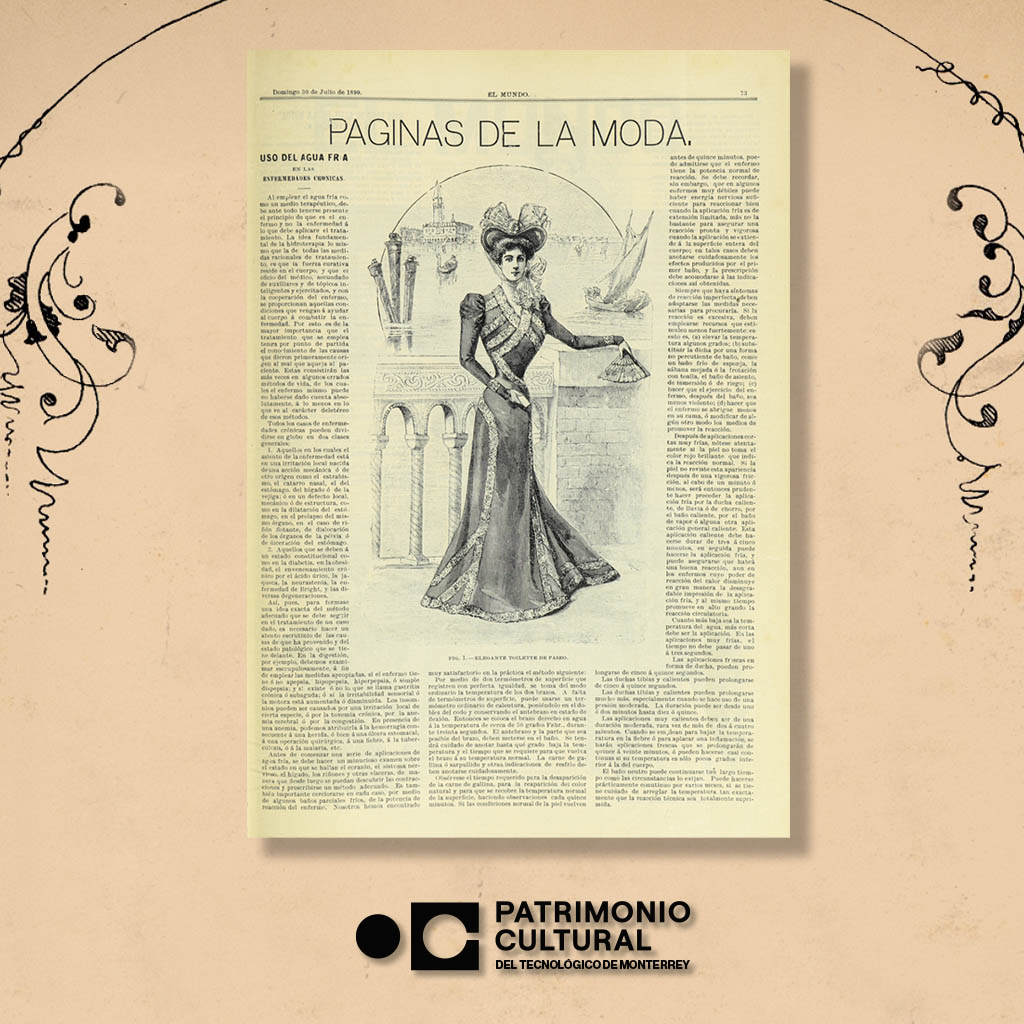
El Mundo Ilustrado, 1899, año 6, tomo 2, núm. 1-27. Fondo Hemerográfico. Biblioteca de Colecciones Especiales "Miguel de Cervantes Saavedra". Patrimonio Cultural del Tecnológico de Monterrey®.
El Fondo Hemerográfico es uno de los más importantes acervos que resguarda la Biblioteca Cervantina. Se conforma de diversas publicaciones periódicas de los siglos XIX y XX, entre las que destaca el semanario El Mundo Ilustrado.
Rafael Reyes Spíndola fue el creador de este periódico semanal en octubre de 1894, en Puebla. El objetivo principal de este semanario era recapitular los sucesos más importantes de Europa y México. En sus secciones incluían personajes destacados de la política, personajes históricos, monumentos, exposiciones y costumbres de México y el Mundo. También contenía cuentos cortos, novelas, recetas, ciencia, tecnología y la moda.
La relevancia de este semanario radicaba en los grabados y fotografías que se anexaban a los contenidos de este periódico. Este Elegante toilette de paseo que se muestra, es un ejemplo de cómo se difundía la moda para las damas porfirianas, pues no solo se colocaba la imagen, sino también la descripción del atuendo: "Es de tafetán, estilo princesa, con aplicación de galón de seda bordada, ancho, en bandas onduladas muy elegantes. Descote triangular muy severo".
Esta obra está disponible para su consulta en el Repositorio Institucional del Tecnológico de Monterrey a través del siguiente enlace: https://hdl.handle.net/11285/675788
Agosto, 2024
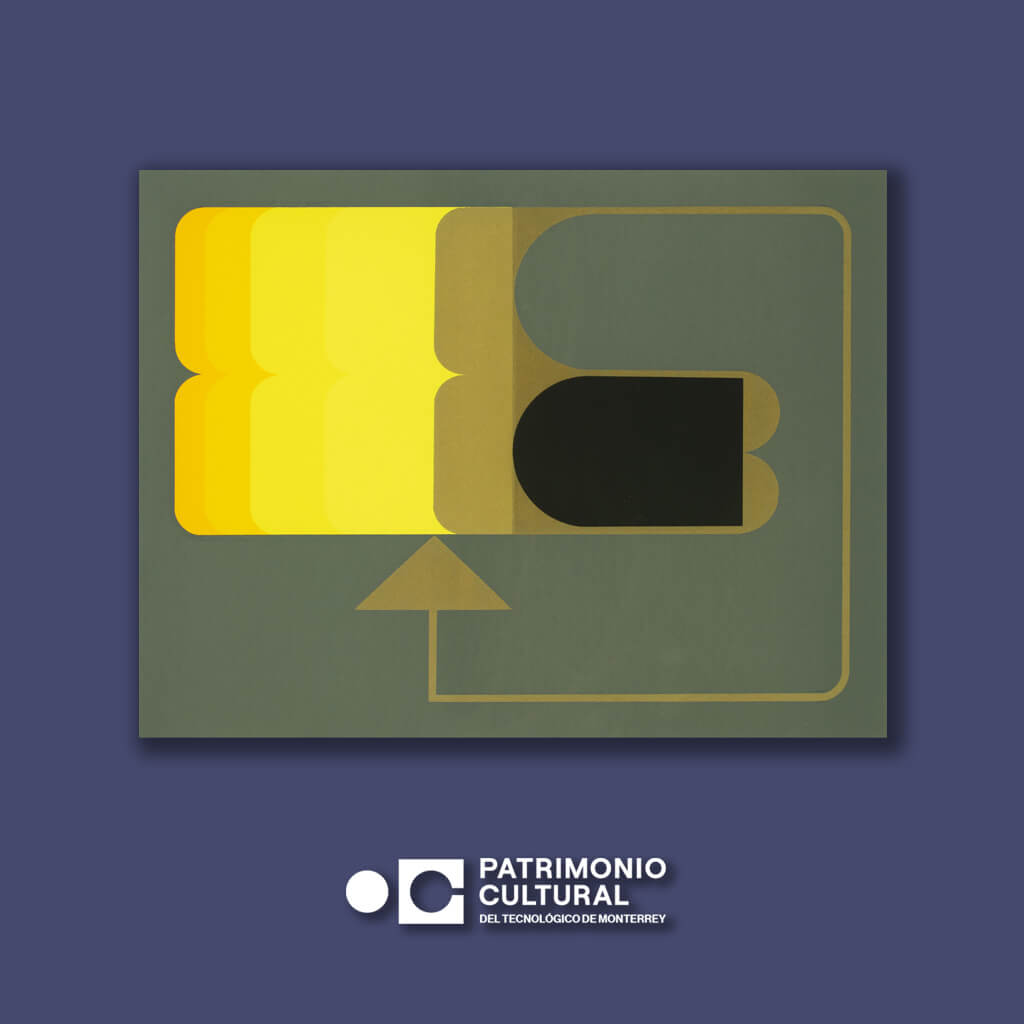
Manuel Felguérez (1928-2020), Sin título (del proyecto Espacio múltiple), ca. 1970-1980. Serigrafía, 72.5 x 82.5 cm. Campus Estado de México. Patrimonio Cultural del Tecnológico de Monterrey®.
Manuel Felguérez fue un pintor, grabador y escultor zacatecano, reconocido por su contribución al abstraccionismo en México. Fue uno de los primeros artistas en utilizar la computadora como herramienta para cuestionar lo estético desde la lógica matemática, estableciendo una relación entre la geometría y la emoción. Su influencia en el arte mexicano es notable por su papel en la vanguardia y en el desarrollo del lenguaje abstracto moderno, impactando a generaciones de artistas contemporáneos.
Esta pieza data de los años setenta, periodo en el cual Felguérez desarrolló la serie "La máquina estética". En esta serie, exploró la Teoría de Identificación de Sistemas para investigar cómo la computadora podría predecir la evolución de su lenguaje plástico. Además, durante este tiempo, experimentó con técnicas de impresión y materiales, demostrando cómo la tecnología influye en los procesos de creación artística.
Su obra es testimonio del cambio ideológico con relación al arte y la tecnología, subrayando la importancia de la innovación y la experimentación técnica, más allá de las preocupaciones formales de la Escuela Mexicana de Pintura.
"El artista en general, y yo en especial, siempre busca una constante renovación, un constante aporte, una invención, una nueva visión"
Manuel Felguérez
Esta obra está disponible para su consulta en el Repositorio Institucional del Tecnológico de Monterrey a través del siguiente enlace: https://repositorio.tec.mx/handle/11285/676071
Septiembre, 2024
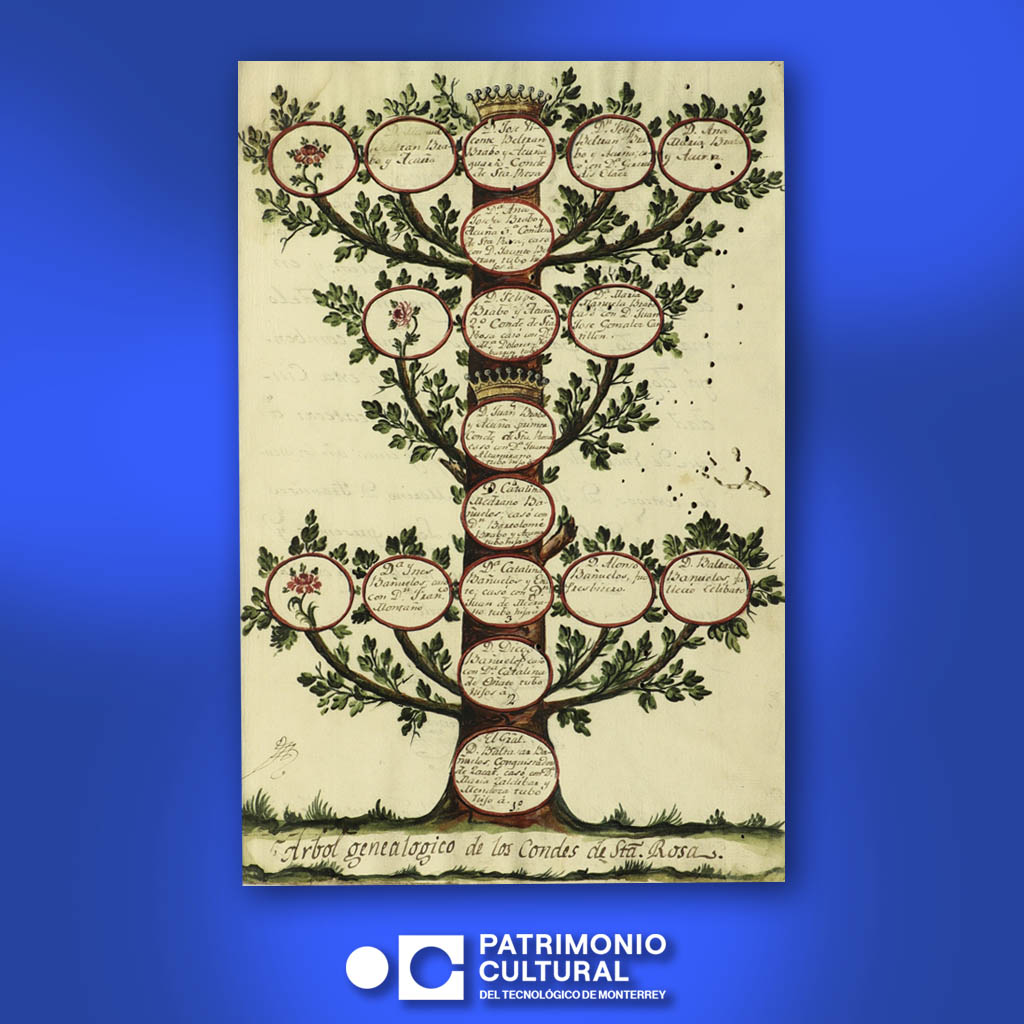
Relación de los méritos y servicios de los condes de Santa Rosa y los de sus ascendientes y descendientes, 1797. Campus Monterrey. Fondo Pedro Robredo. Biblioteca de Colecciones Especiales "Miguel de Cervantes Saavedra". Patrimonio Cultural del Tecnológico de Monterrey®.
Las relaciones de méritos y servicios fueron comunes en la Nueva España para demostrar el trabajo que los españoles habían realizado en nombre de la corona española y con ello obtener privilegios.
El "Árbol genealógico de los condes de Santa Rosa" forma parte de la Relación de los méritos y servicios de los condes de Santa Rosa y los de sus ascendientes y descendientes, en la cual Juan Bravo de Medrano, primer conde de Santa Rosa demuestra su ascendencia española y las aportaciones que hizo a la corona de España para obtener el titulo. En este árbol, el tronco muestra el origen y en sus ramas los descendientes, los portadores de este privilegio. Destacan las dos coronas en el centro y el remate del árbol, así como las flores colocadas en los espacios vacíos.
Este documento es relevante debido a que no solo nos muestra cómo operaba la sociedad novohispana a través de un árbol genealógico sino que también documenta el linaje de la primera nobleza novohispana en Zacatecas.
Esta obra también está disponible para su consulta en el Repositorio Institucional del Tecnológico de Monterrey a través del siguiente enlace: https://hdl.handle.net/11285/657139
Octubre, 2024
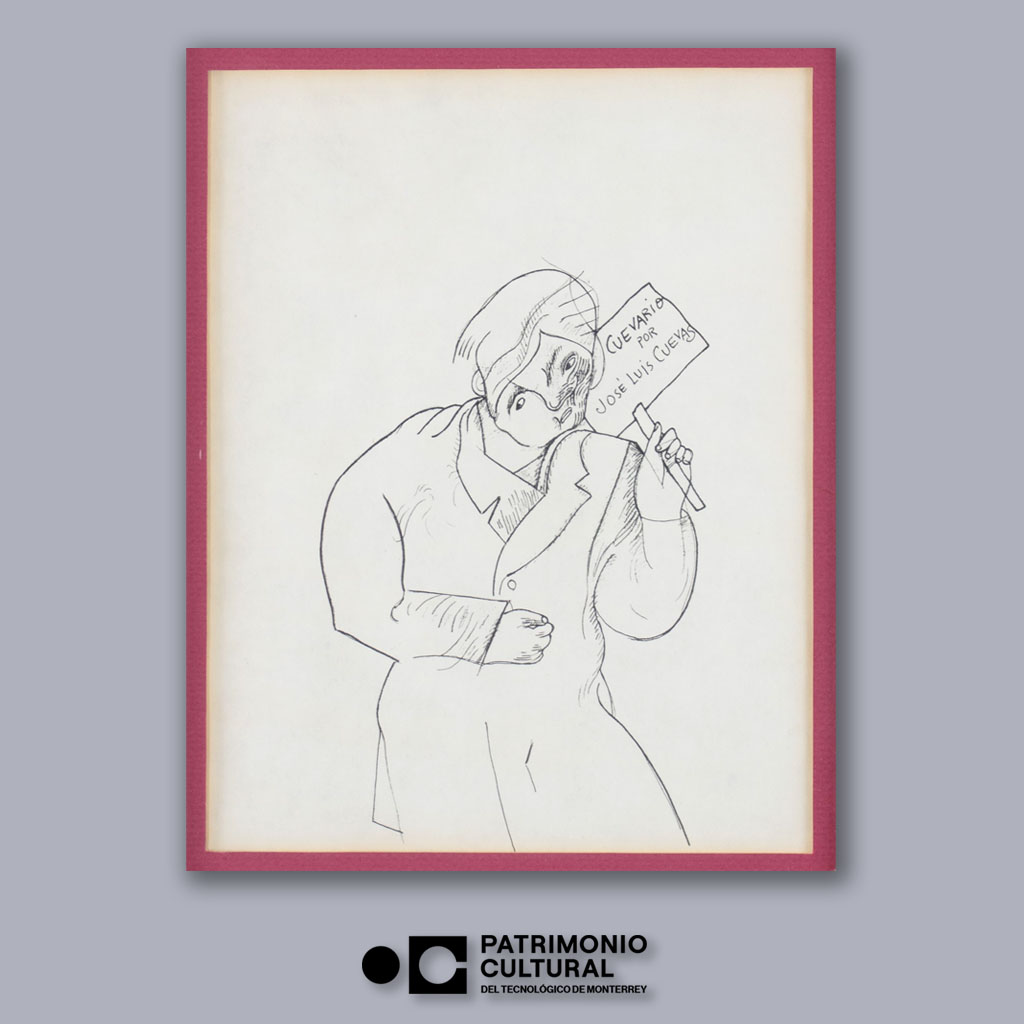
José Luis Cuevas (1934-2017), Viñeta para Cuevario/El Cuevario de José Luis Cuevas, 1989. Tinta sobre papel. Campus Estado de México. Patrimonio Cultural del Tecnológico de Monterrey®.
José Luis Cuevas (1934-2017) fue un destacado artista mexicano, considerado parte de una generación de artistas conocidos como generación de la "Ruptura". Estos artistas rechazaban los preceptos del muralismo mexicano y proponían explorar el arte desde una forma más personal y alejada de los paradigmas oficiales del arte. La obra de Cuevas está profundamente marcada por temas de alineación, angustia existencial y una crítica a las convenciones sociales y políticas. Cuevas fue autodidacta, lo que le permitió desarrollar un estilo único que combinaba el dibujo, la pintura y la literatura.
Cuevas creó un universo que reflejó tanto en imágenes como en palabras. Fue un ávido lector quien, debido a una condición enfermiza y frágil, dedico sus convalecencias a leer y a dibujar a lápiz. Es reconocido por sus dibujos, grabados, pinturas y esculturas, sin embargo, también fue prolífico en la escritura. Particularmente en una columna en las páginas culturales de El Búho del periódico Excélsior conocida como "Cuevario". Durante más de seis años, esta columna se publicó semanalmente, todos los lunes. Posteriormente también publicó en El Universal, de 1999 hasta 2007.
A través del Cuevario, el artista estableció un dialogo entre el individuo y la sociedad, planteando preguntas sobre la identidad, la política en México, la locura, las mujeres y su propia vida. Su obra escrita fue acompañada por dibujos que, más allá de su aspecto caricaturesco, invita a la reflexión sobre las fuerzas oscuras que habitan en cada ser humano y en la sociedad en general.
Este documento también está disponible para su consulta en el Repositorio Institucional del Tecnológico de Monterrey a través del siguiente enlace: https://hdl.handle.net/11285/675920
Noviembre, 2024
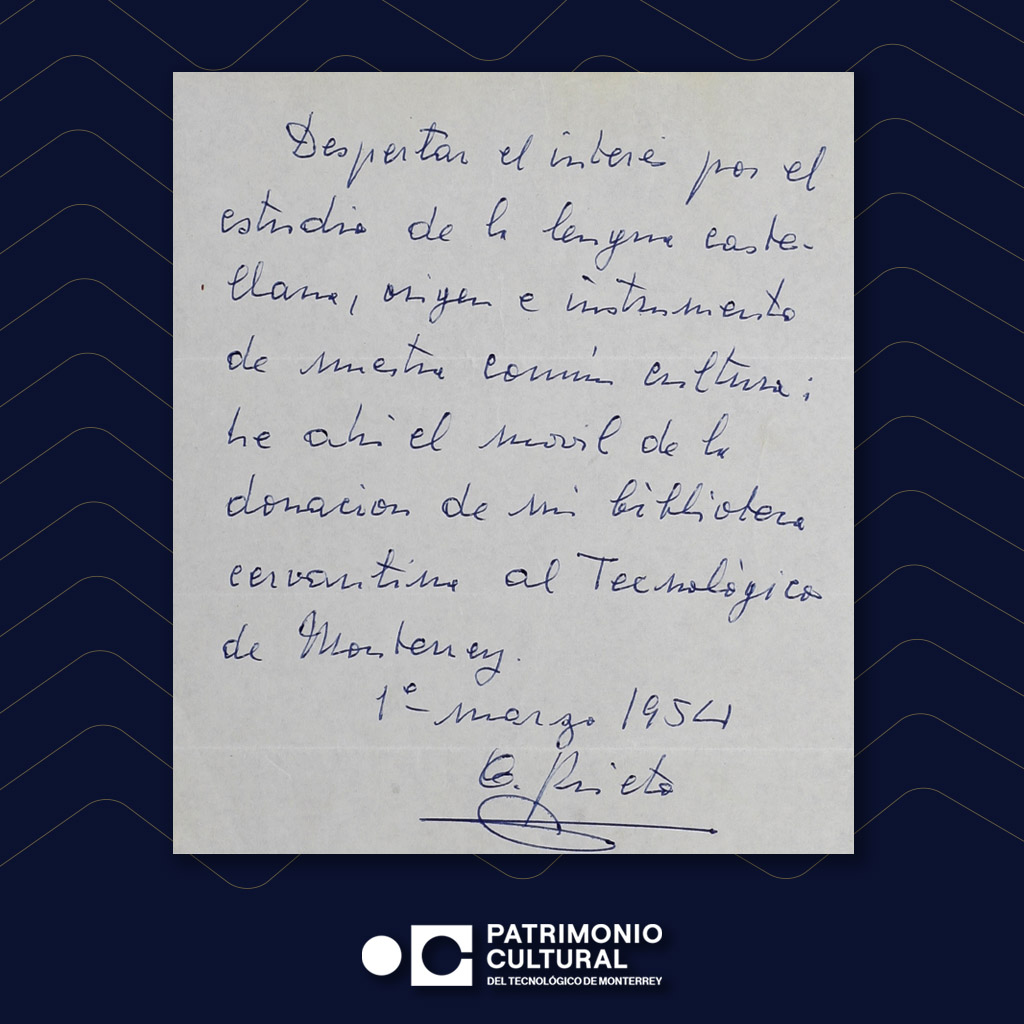
Carlos Prieto, Nota donde explica la donación de la colección Cervantina, 1954. Campus Monterrey. Fondo Agustín Basave. Fototeca del Tecnológico de Monterrey. Biblioteca de Colecciones Especiales "Miguel de Cervantes Saavedra". Patrimonio Cultural del Tecnológico de Monterrey®.
En este documento, Carlos Prieto explica los motivos detrás de la donación de su colección de libros de El ingenioso hidalgo don Quijote de la Mancha de Miguel de Cervantes Saavedra, en ediciones de diferentes épocas y lenguas, considerada la obra cumbre de la lengua castellana. Prieto señala que esta donación busca enriquecer la formación técnica con el valor universal del castellano y de esta gran obra literaria. Además, expresa que su gesto es una muestra de gratitud hacia Monterrey, ciudad que ha sido fundamental en su vida y a la que desea aportar un legado cultural duradero.
Gracias a esta donación del empresario regiomontano Carlos Prieto, la Biblioteca de Colecciones Especiales "Miguel de Cervantes Saavedra" o "Cervantina" como cariñosamente se le conoce, comenzó sus operaciones el 5 de noviembre de 1954. Junto a esta gran aportación, se sumarían otras en el trascurso de los años, todas enfocadas en el estudio de las humanidades. Actualmente la Cervantina cuenta con 28 fondos documentales.
Este año la Biblioteca de Colecciones Especiales "Miguel de Cervantes Saavedra" festeja su 70 aniversario, para ello, preparó el Segundo Congreso de la Asociación Mexicana de Cervantistas que se llevará a cabo del 4 al 6 de noviembre en el tercer piso del edificio de Rectoría, campus Monterrey.
Este documento también está disponible para su consulta en el Repositorio Institucional del Tecnológico de Monterrey a través del siguiente enlace: http://hdl.handle.net/11285/622726
Diciembre, 2024
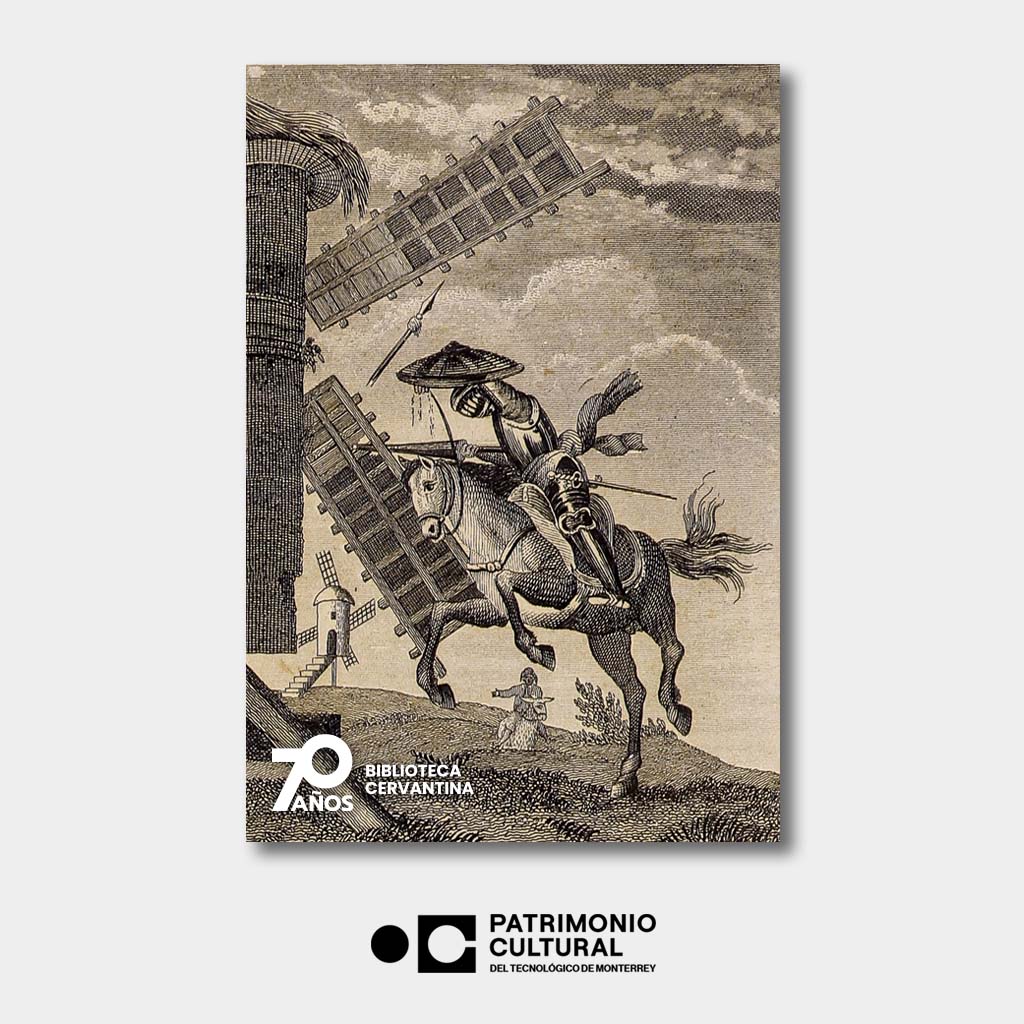
Miguel de Cervantes Saavedra (1547-1616), El ingenioso hidalgo don Quijote de la Mancha, 1833. Primera edición mejicana de Mariano Arévalo. Campus Monterrey. Fondo Carlos Prieto "Colección Cervantina". Biblioteca de Colecciones Especiales "Miguel de Cervantes Saavedra". Campus Monterrey. Patrimonio Cultural del Tecnológico de Monterrey®.
La primera edición mexicana de El ingenioso hidalgo don Quijote de la Mancha fue impreso por Mariano Arévalo en cinco volúmenes en 1833. Contiene varias estampas, basadas en dibujos de Isidro y Antonio Carnicero, que ilustran episodios relevantes de la narración y fueron realizadas en punta seca sobre cobre.
El grabado que se muestra en la imagen se titula "Don Quijote arremete contra molinos de viento" e ilustra uno de los episodios más famosos de la novela cervantina.
El primer Quijote mexicano es un ejemplar rarísimo custodiado por la Biblioteca de Colecciones Especiales "Miguel de Cervantes Saavedra". Este libro forma parte del Tecnológico de Monterrey desde 1954. Este año festejamos su 70 aniversario.
Te puede interesar: Ir a Patrimonio Cultural ˃

